
Publish time: Tue Nov 30 14:32:29 CST 2021
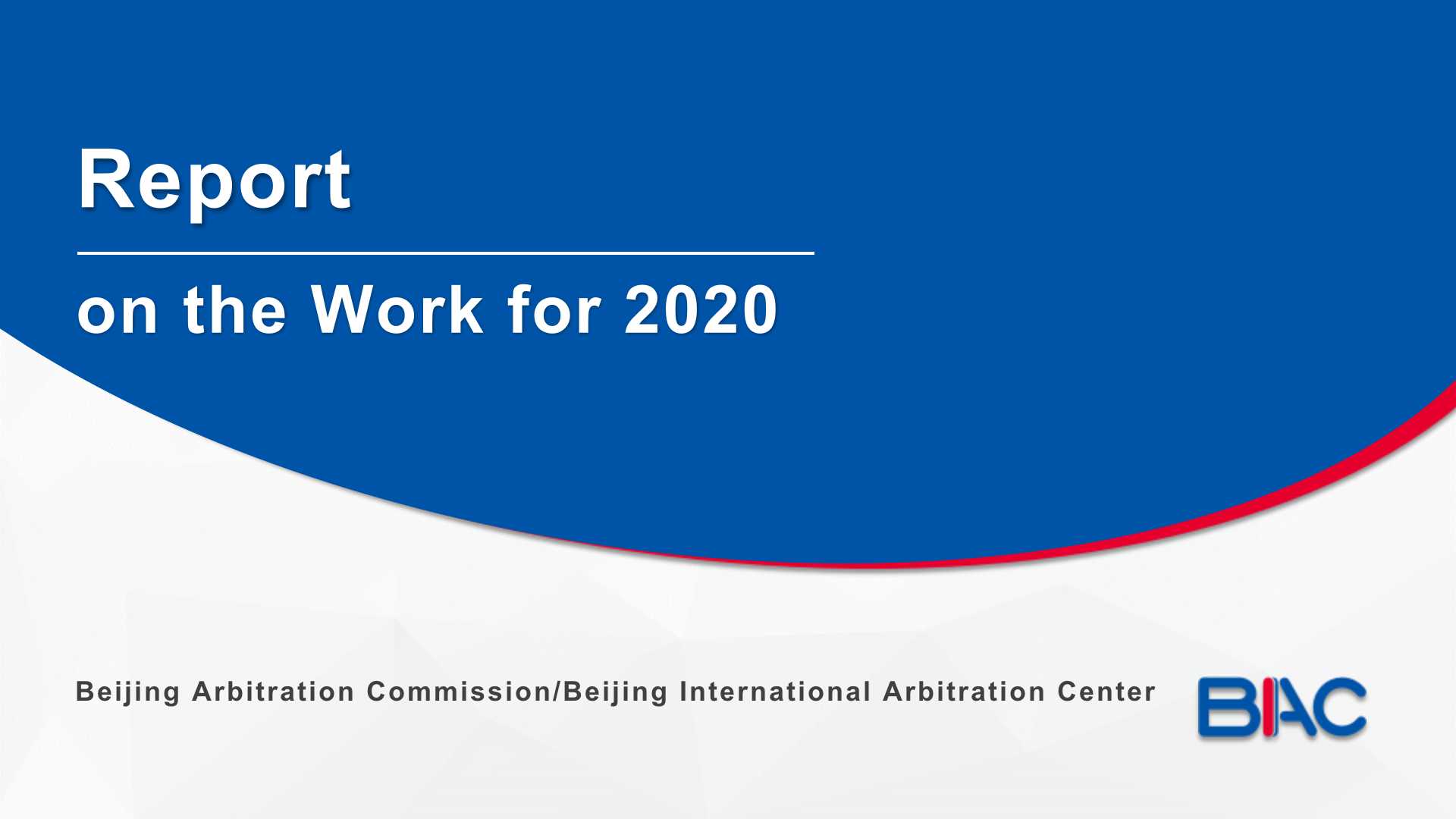
2020 witnessed a decline in the caseload of the Beijing Arbitration Commission/Beijing International Arbitration Center (the "BAC/BIAC") compared to 2019, but the amounts in dispute almost remained the same as that of 2019. While devoting relentless efforts to epidemic prevention and control, the BAC/BIAC, on the one hand, endeavored to minimize the influence of the epidemic on case registration and administration and maintain the quality and efficiency of case management, and on the other hand, adjusted the ways of business development and strengthened the implementation of internal systems and team building. Based on 2020 work completed, the BAC/BIAC hereby makes its annual summary as follows:
I. Case Management
(I) Overview
1.Statistics on Arbitration Cases
(1) Caseload
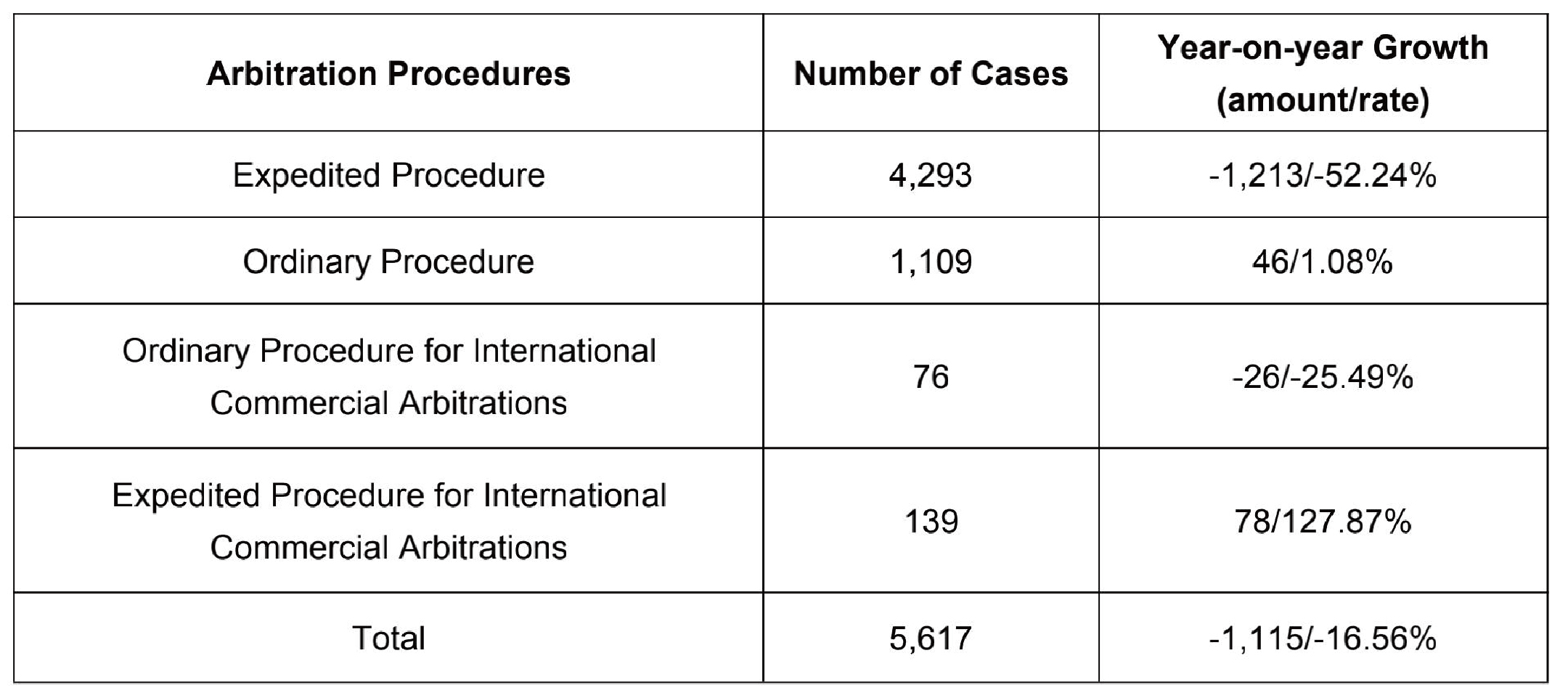
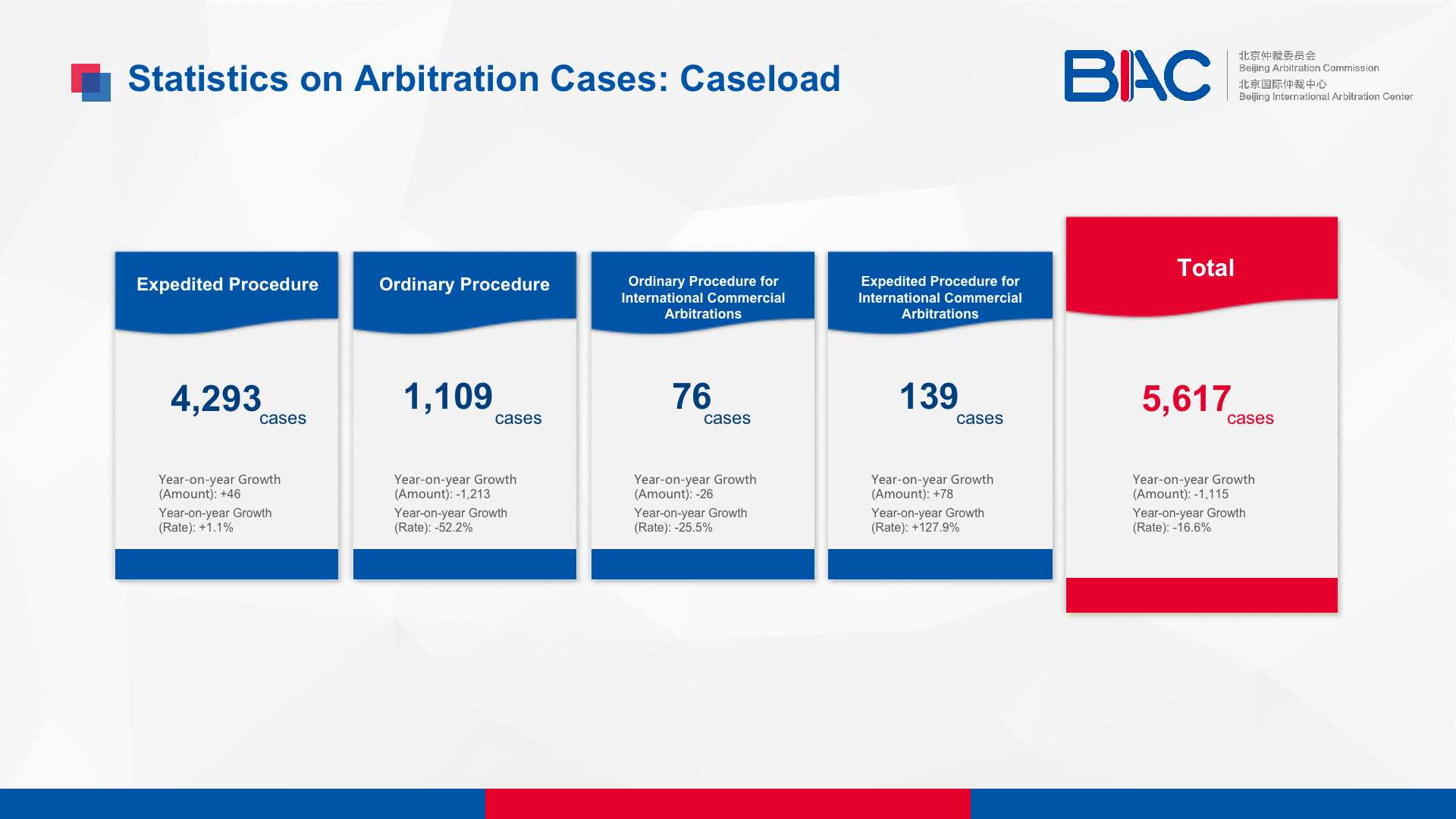
(2) Amounts in Dispute

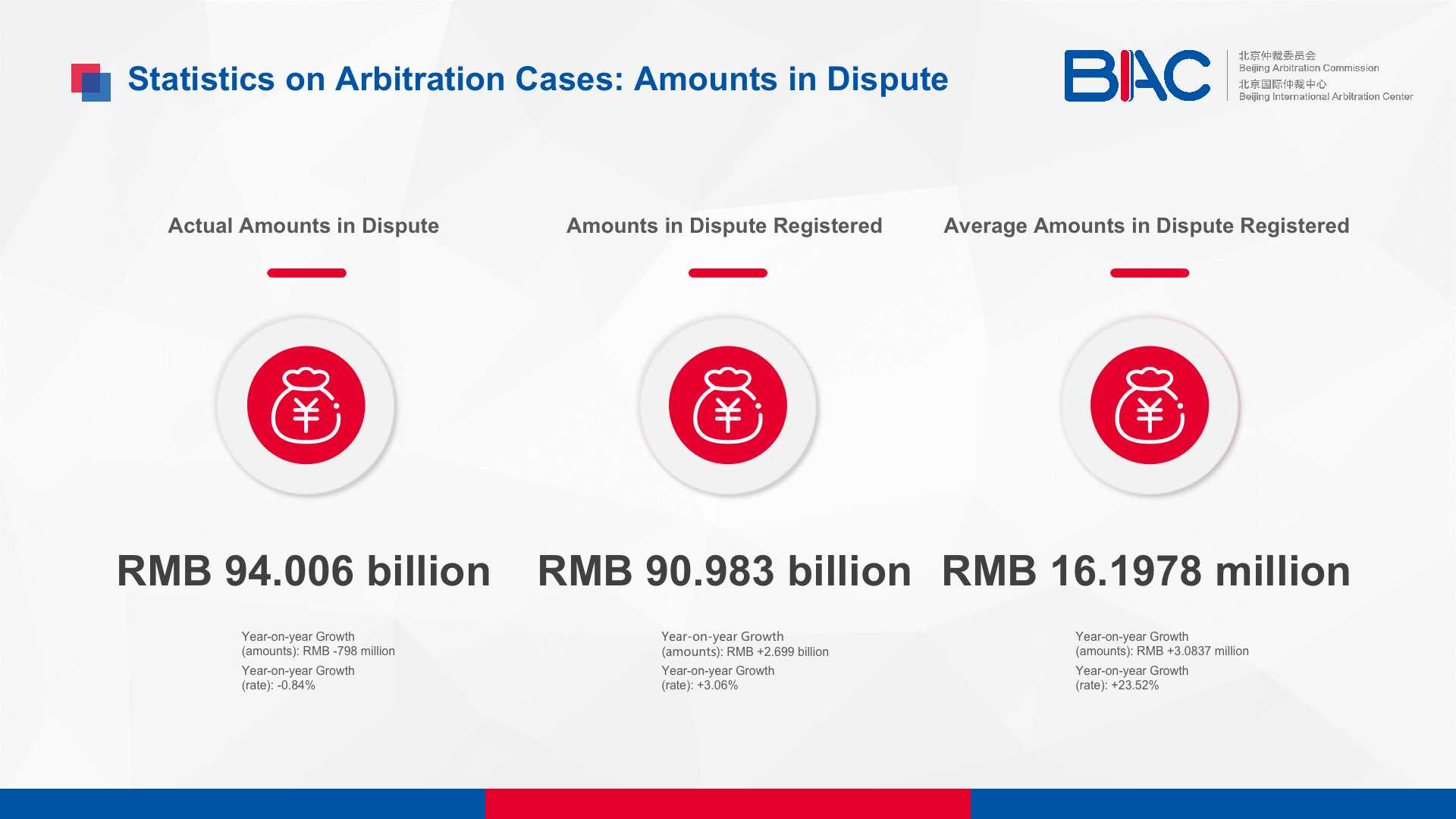
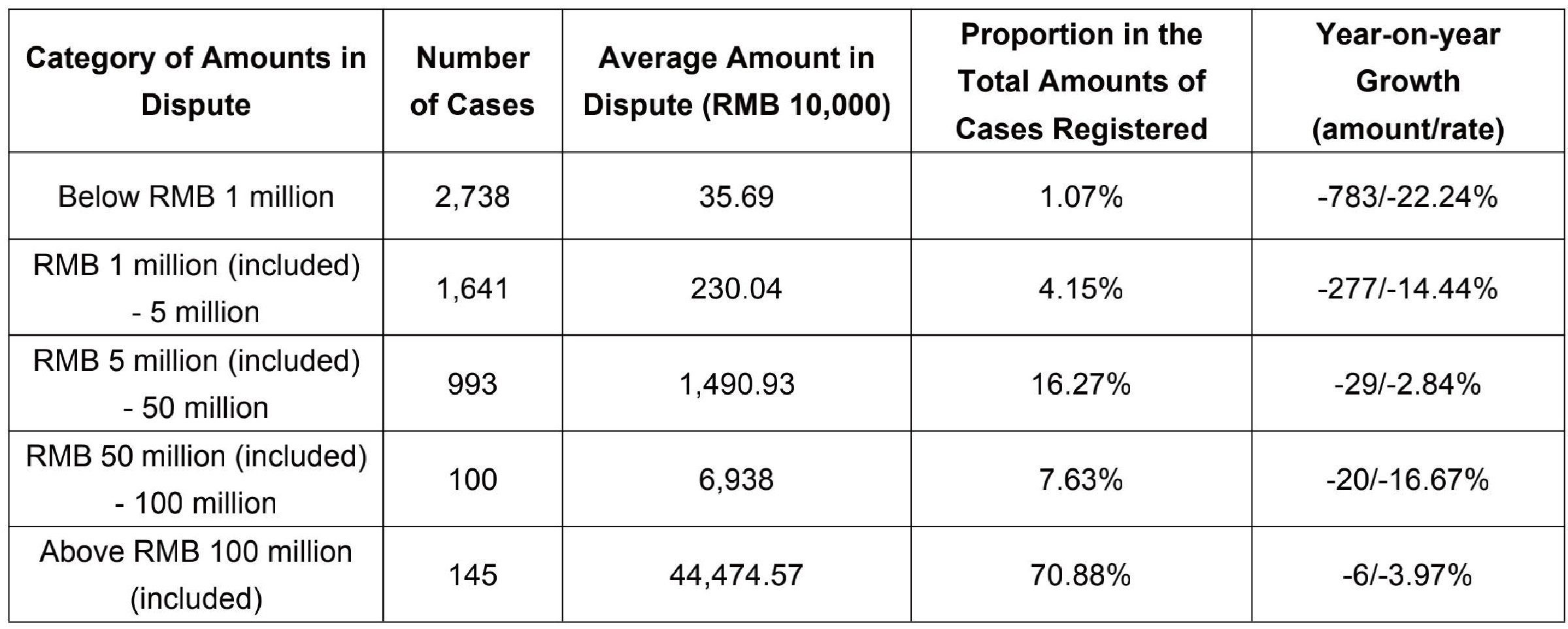
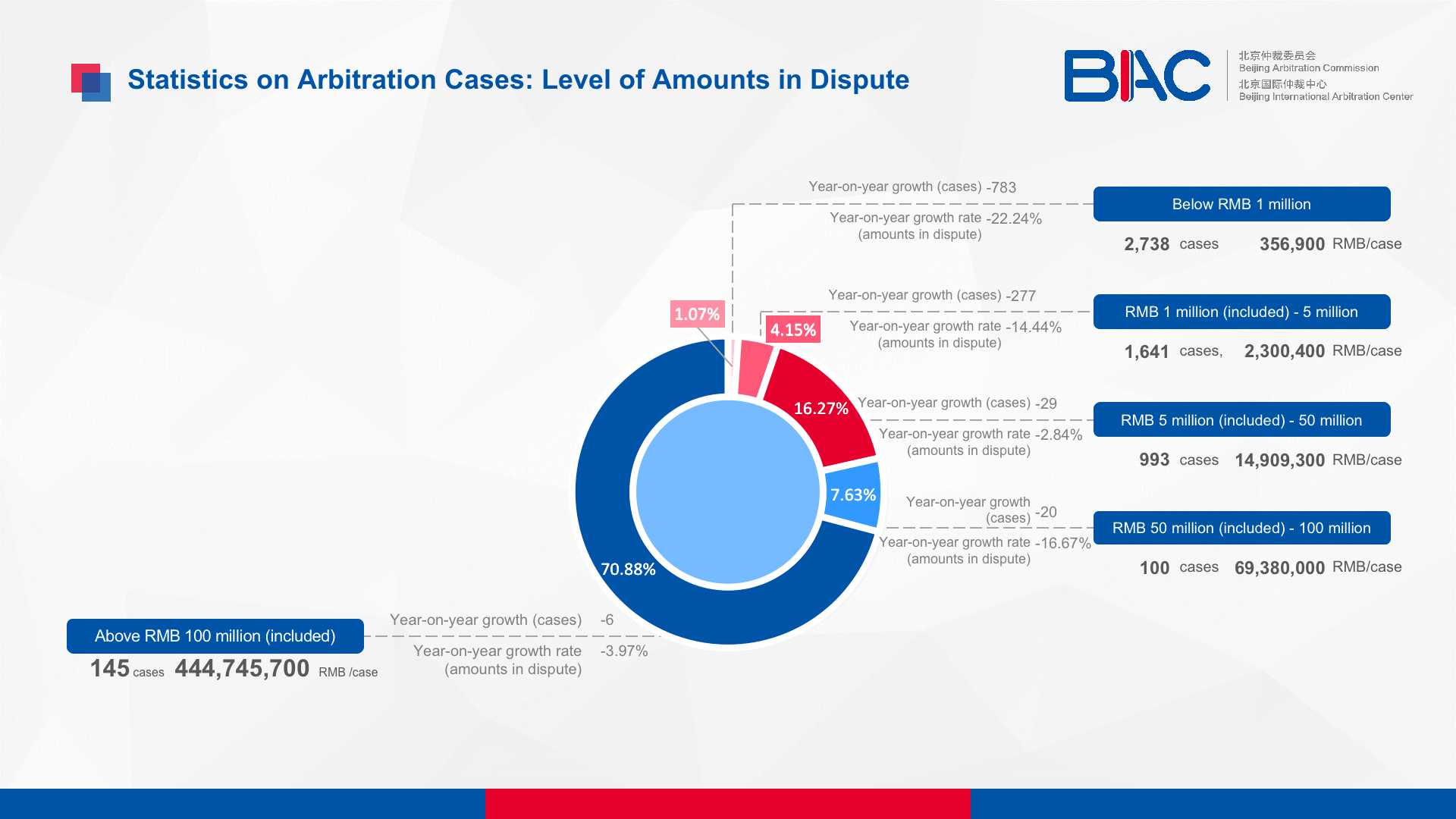
(3) Nature of the Disputes
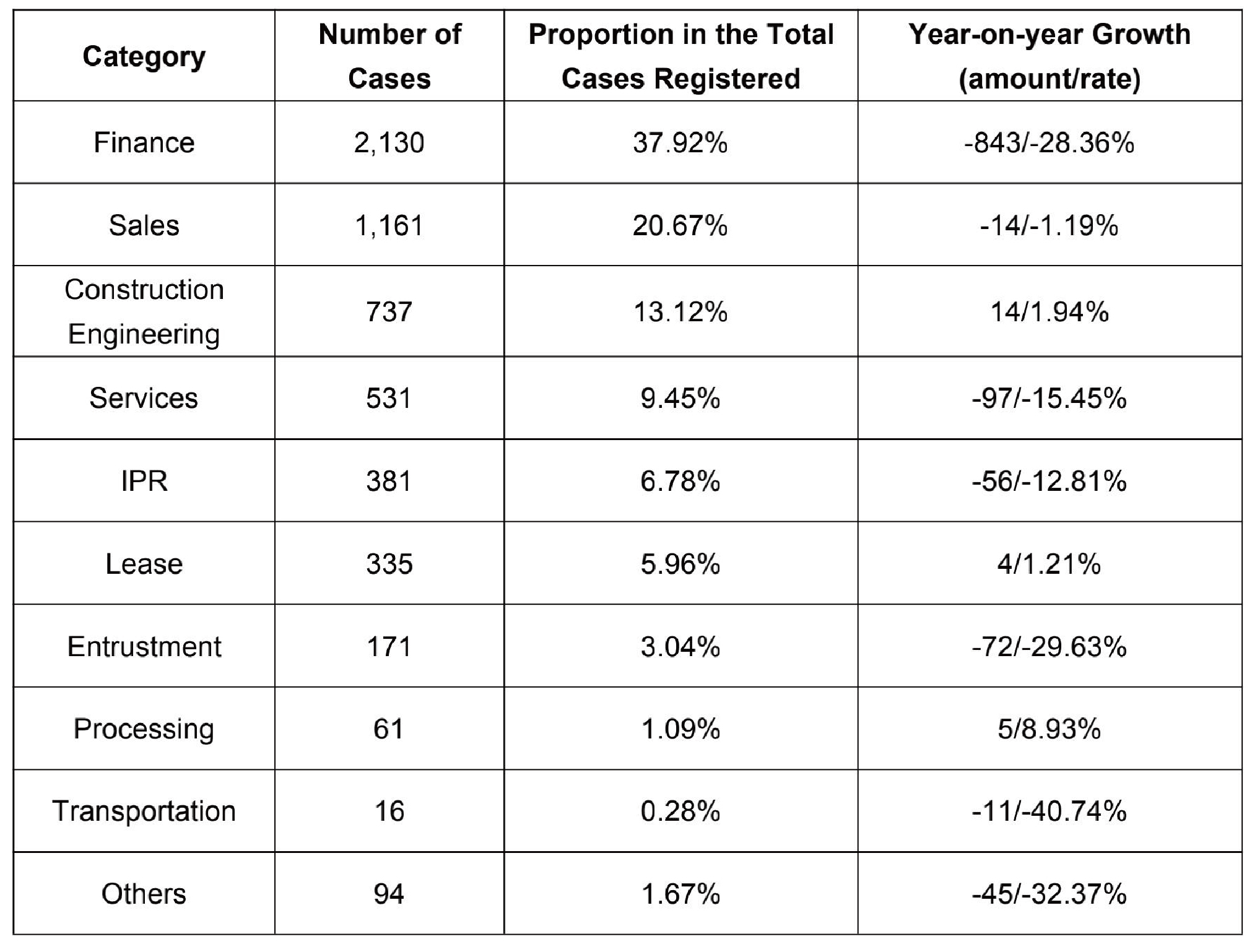
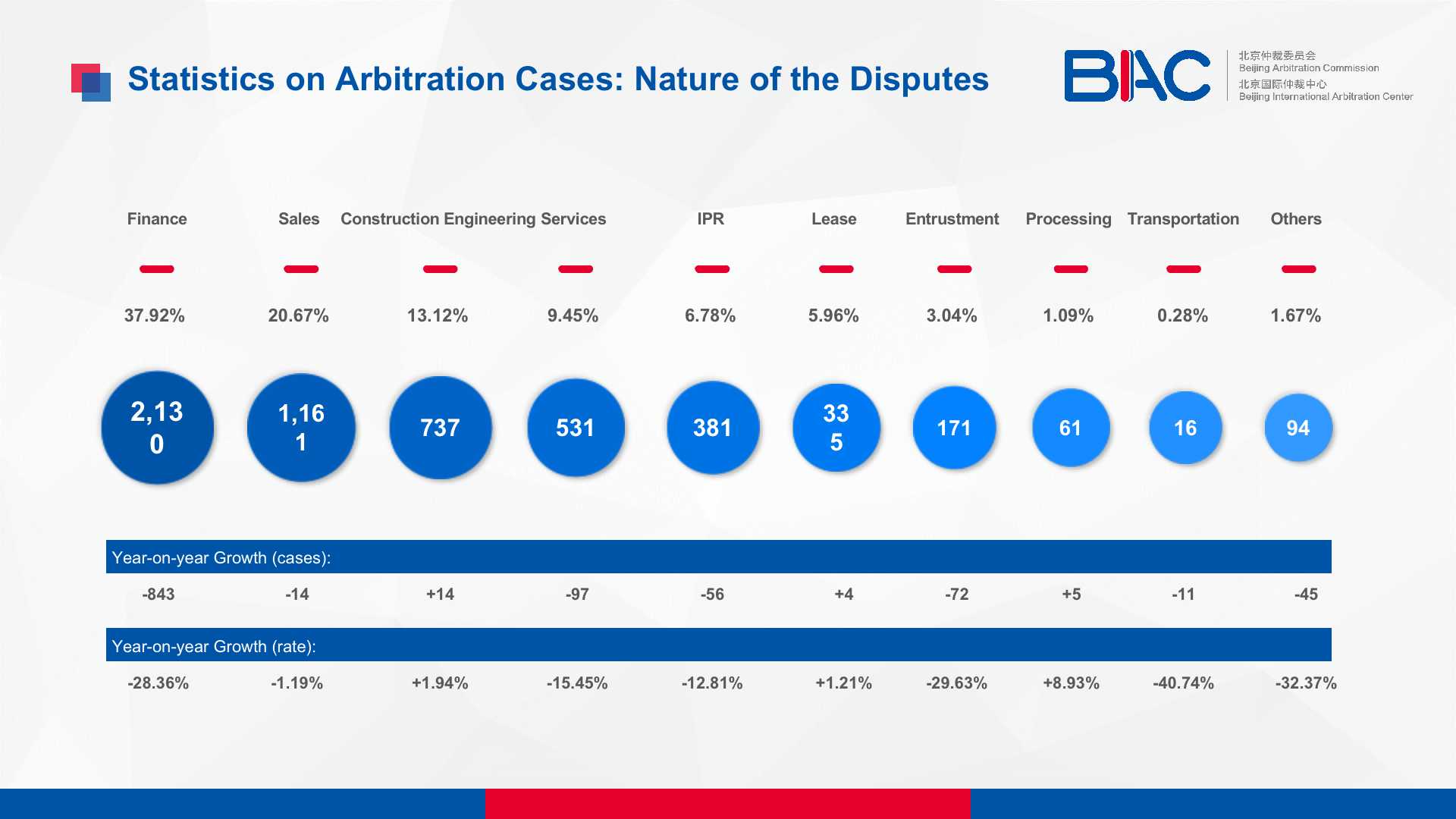
2.Arbitration Cases Concluded
(1) Cases and Amounts Concluded

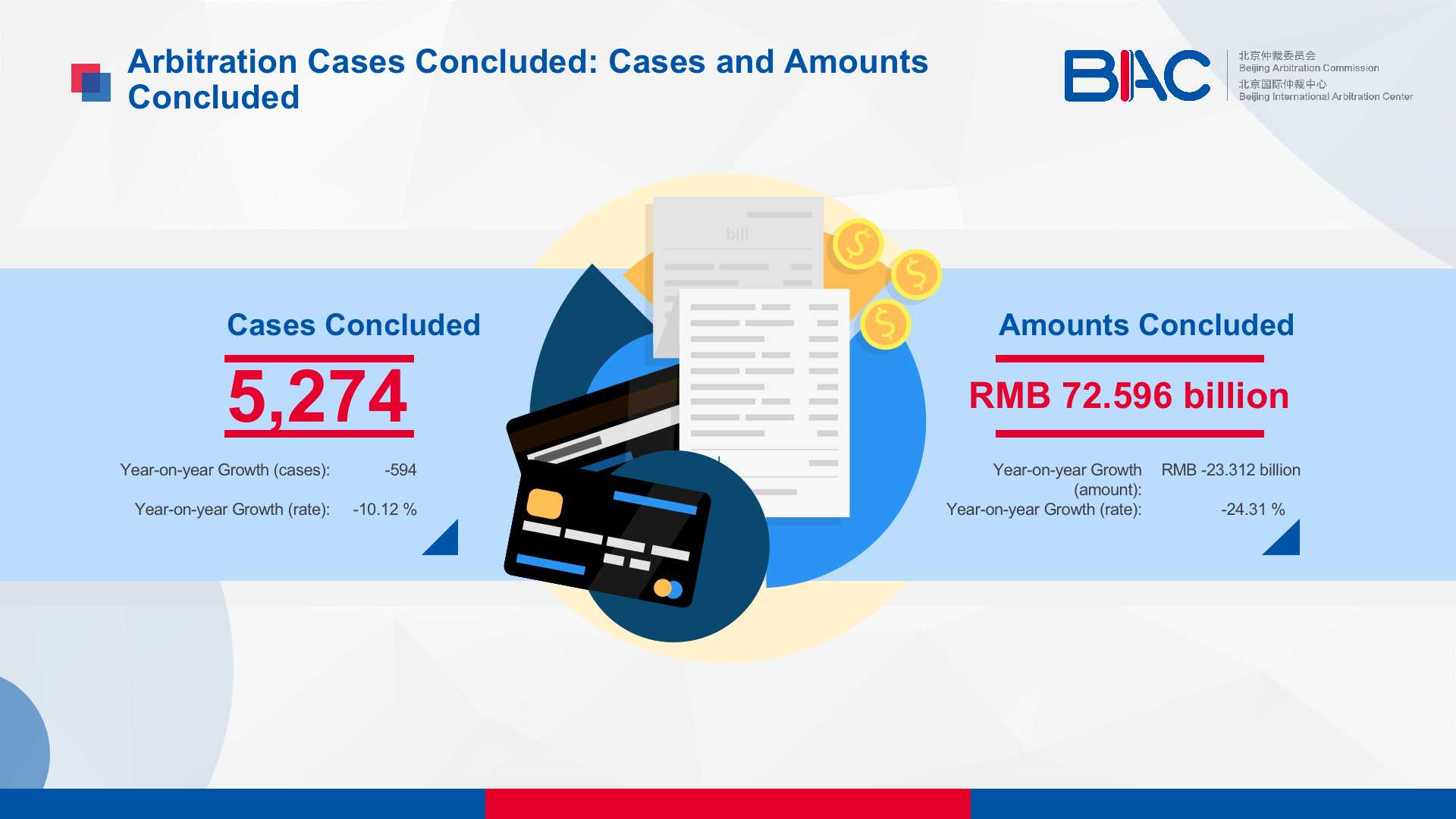
(2) Types of Conclusion

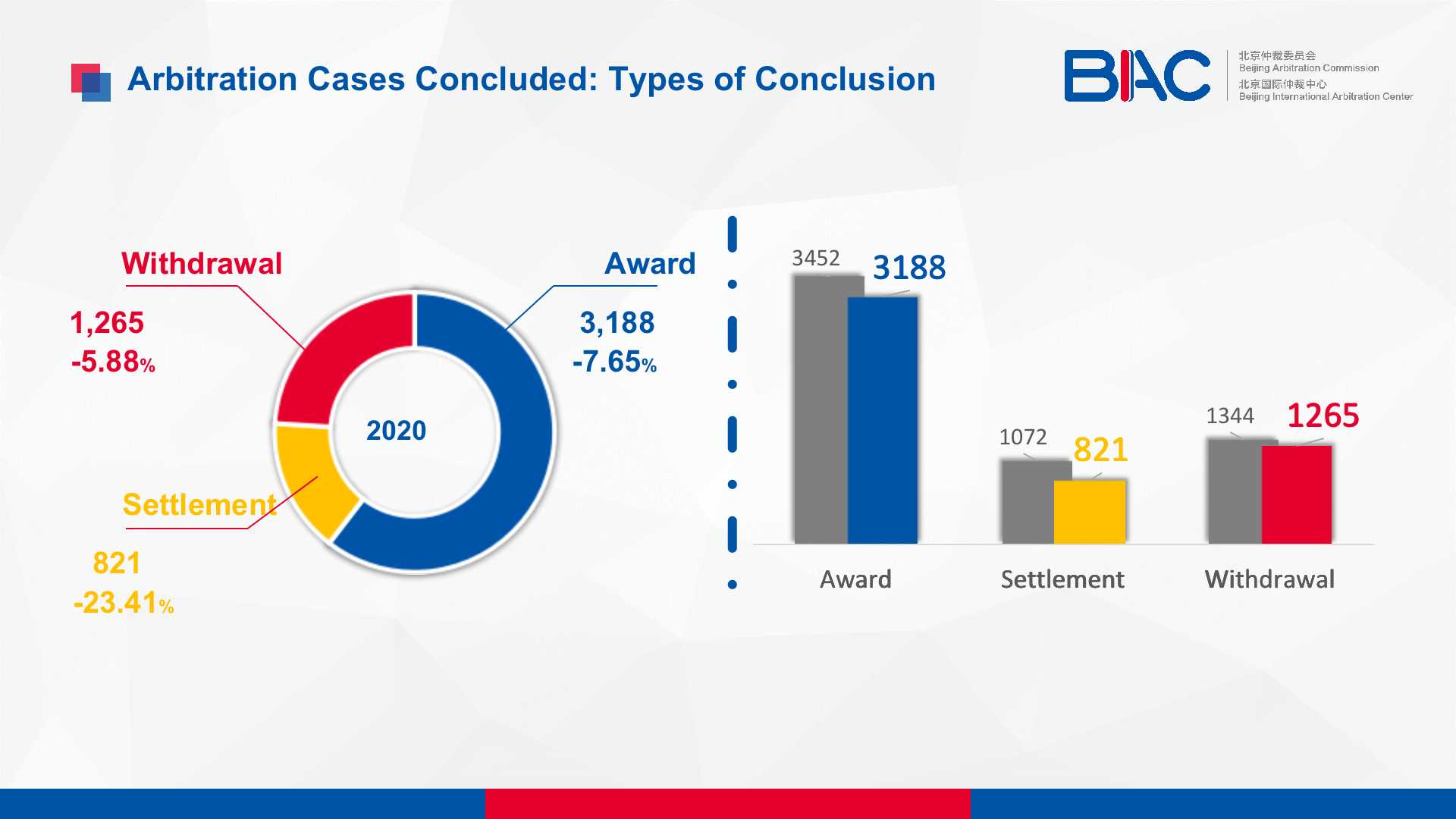
3. International Commercial Arbitrations, Special Procedure-based Arbitrations and Arbitrations Involving at Least One Party Outside Beijing
(1) International Commercial Arbitrations

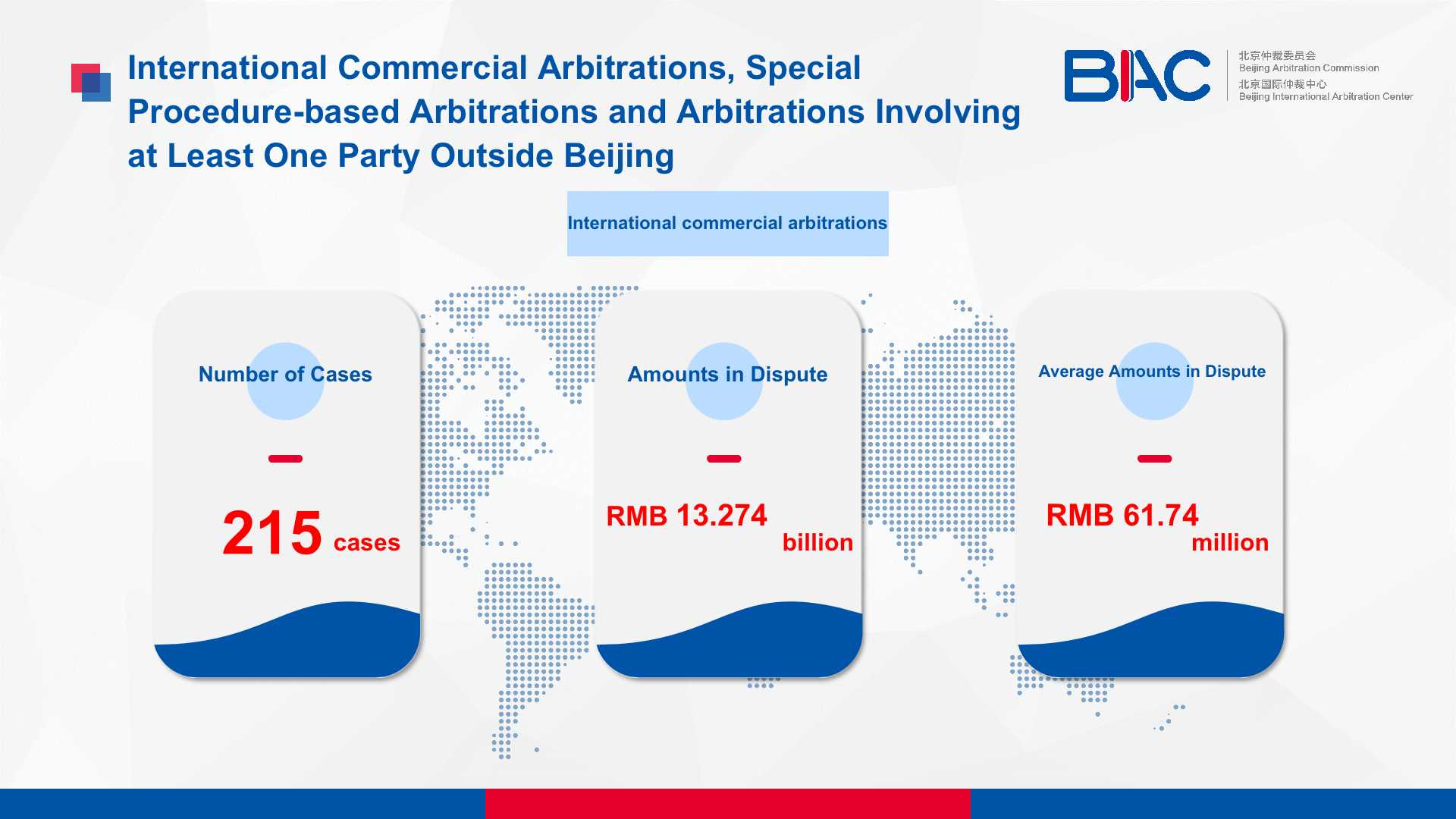
Among the international cases registered in 2020, the largest amount in dispute for a single case reached RMB 8.178 billion, and 12 cases were caught in an amount in dispute exceeding RMB 100 million. Geographically, the parties came from a wide range of countries and regions, including Hong Kong (China), Macao (China), Taiwan (China), the United States, Australia, the United Kingdom, the British Virgin Islands, Japan, South Korea, the Cayman Islands, Oceania, Zimbabwe, Germany, Mexico, Italy, the United Arab Emirates, Mongolia, Vietnam, and Ireland. Noticeably, parties from Zimbabwe, Mexico, the United Arab Emirates, Vietnam and Ireland were registered for the first time. 12 cases comprised both parties with entities outside the Chinese Mainland. Since its establishment, the international cases administered by the BAC/BIAC counted the parties from up to 46 countries and regions.
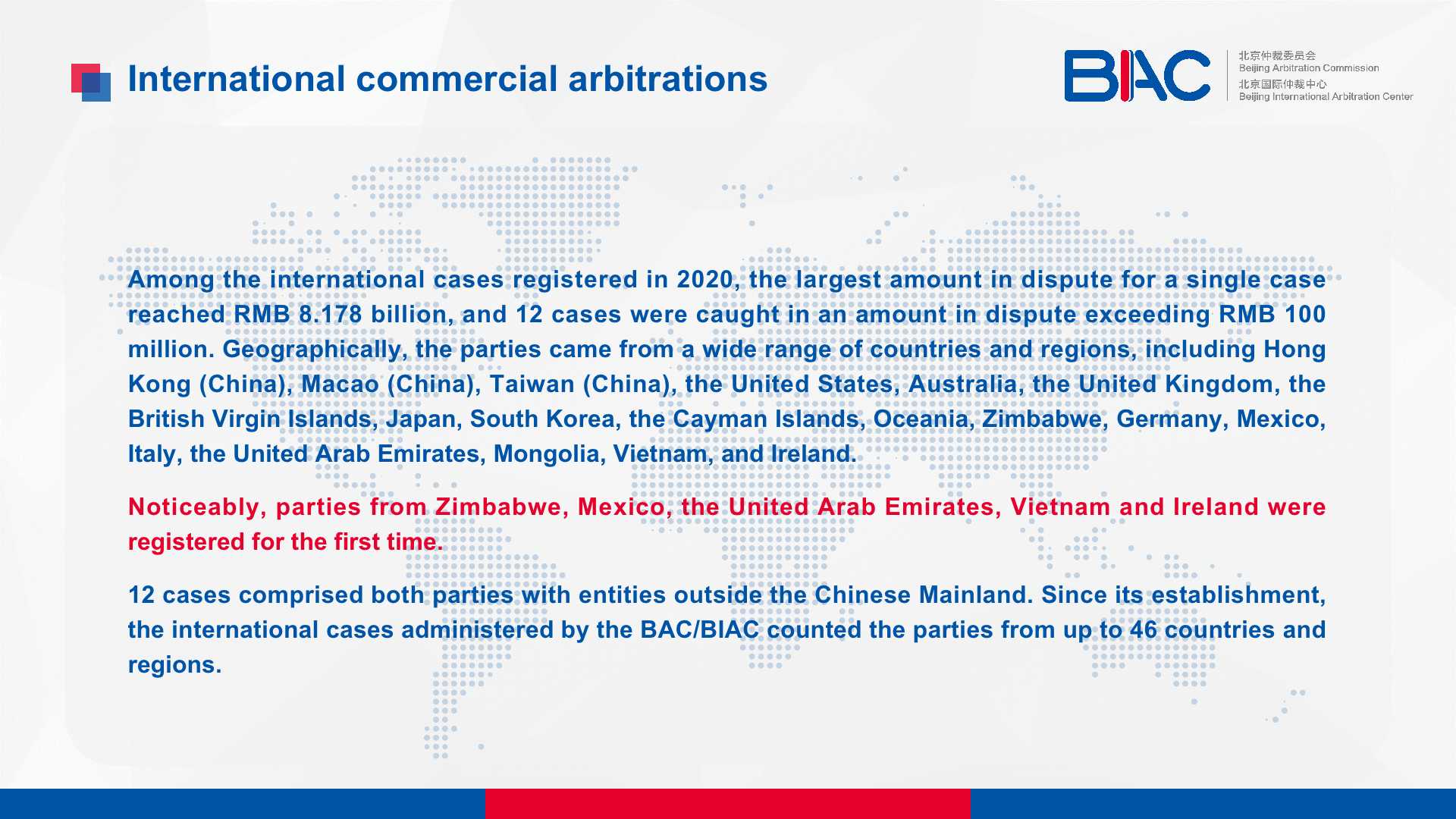
(2) Special Procedure-based Arbitrations
In 2020, 5 cases resorted to foreign languages procedurally: 4 in English and 1 in Japanese (not only a Japanese procedural notice was issued, but also the case might be further advanced in Japanese); For the first time, the BAC/BIAC embraced the parties from Zimbabwe, Mexico, the United Arab Emirates, Vietnam and Ireland in some international cases. The IBA Rules were adopted in one case for securing evidence. Based on the parties' opinions, one case fixed the laws of Hong Kong (China) as the applicable substantive law, while another applied the laws of Mongolia and China. Additionally, the parties in a case agreed on the application of the United Nations Convention on Contracts for the International Sales of Goods. Two decisions concerning interim measures were made: In one case, the emergency arbitrator proceedings were applied and one party's application for interim measures was eventually rejected, the first rejection made by the BAC/BIAC; In the other case, the arbitral tribunal made a decision on interim measures after arranging parties in different countries to attend an online hearing, which was the first interim measure decision made by the BAC/BIAC applicable to the United States. In two cases, arbitrators from outside BAC/BIAC’s Panel of Arbitrators were appointed.
(3) Arbitrations Involving at Least One Party Outside Beijing

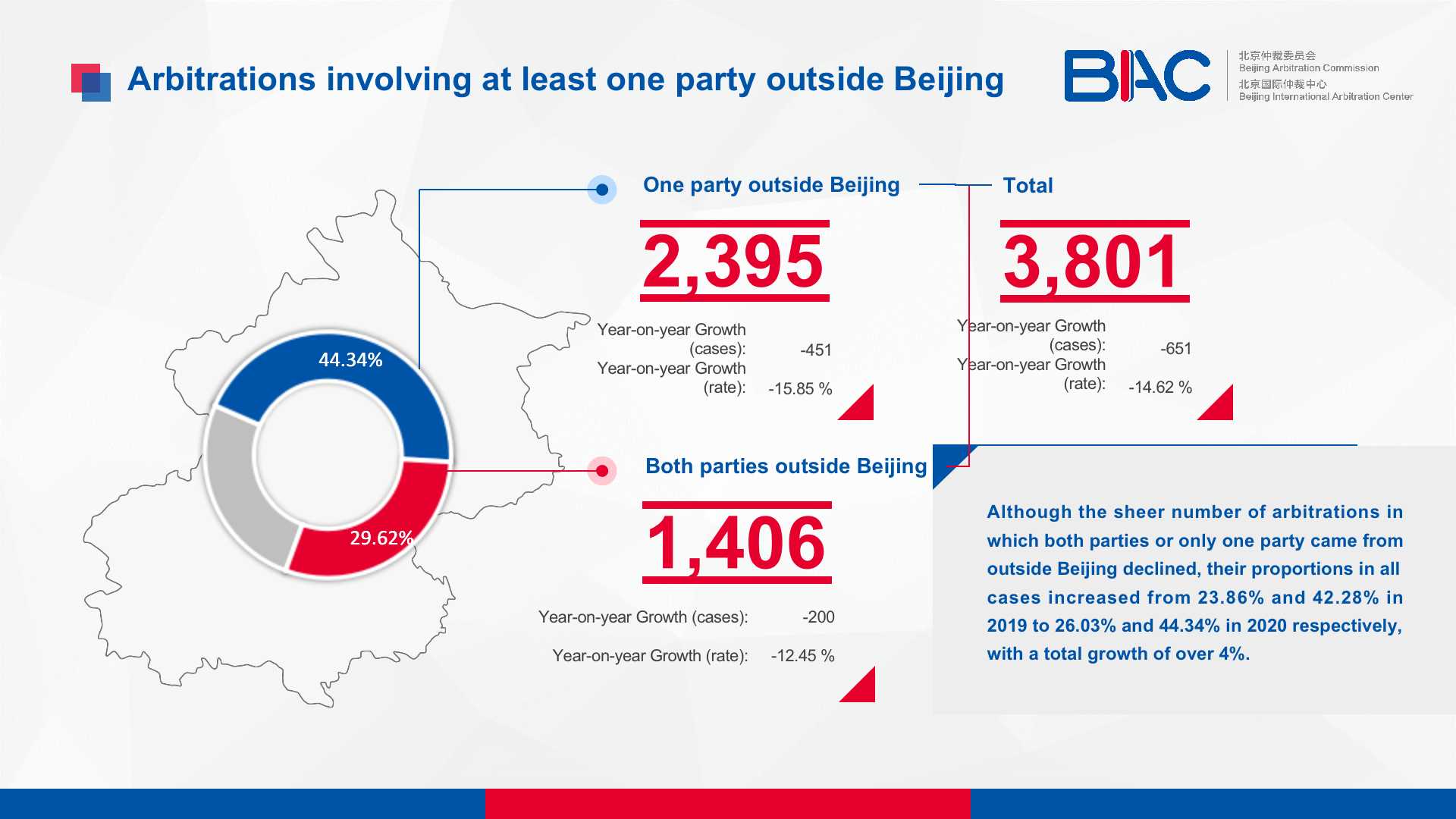
Although the sheer number of arbitrations in which both parties or only one party came from outside Beijing declined, their proportions in all cases increased from 23.86% and 42.28% in 2019 to 26.03% and 44.34% in 2020 respectively, with a total growth of over 4%.
4. Independent Mediation of the BAC/BIAC Mediation Center
In 2020, a total of 7 cases were registered and concluded at the Mediation Center (one independently administered by it, and six delegated by the Asset Management Association of China), involving an amount in dispute of RMB 222 million in total.
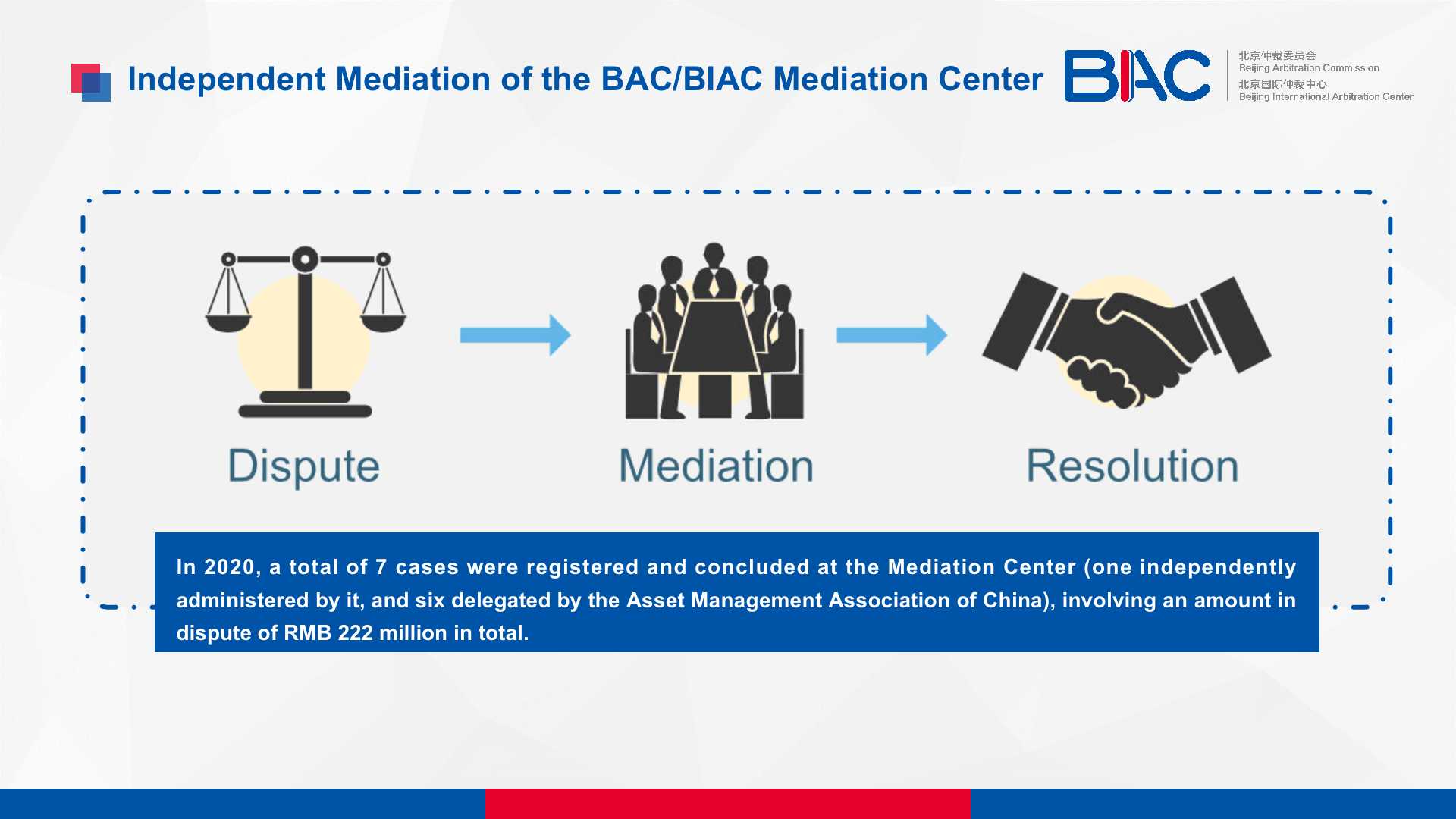
(II) Arbitration Efficiency
1. Duration of Arbitrations


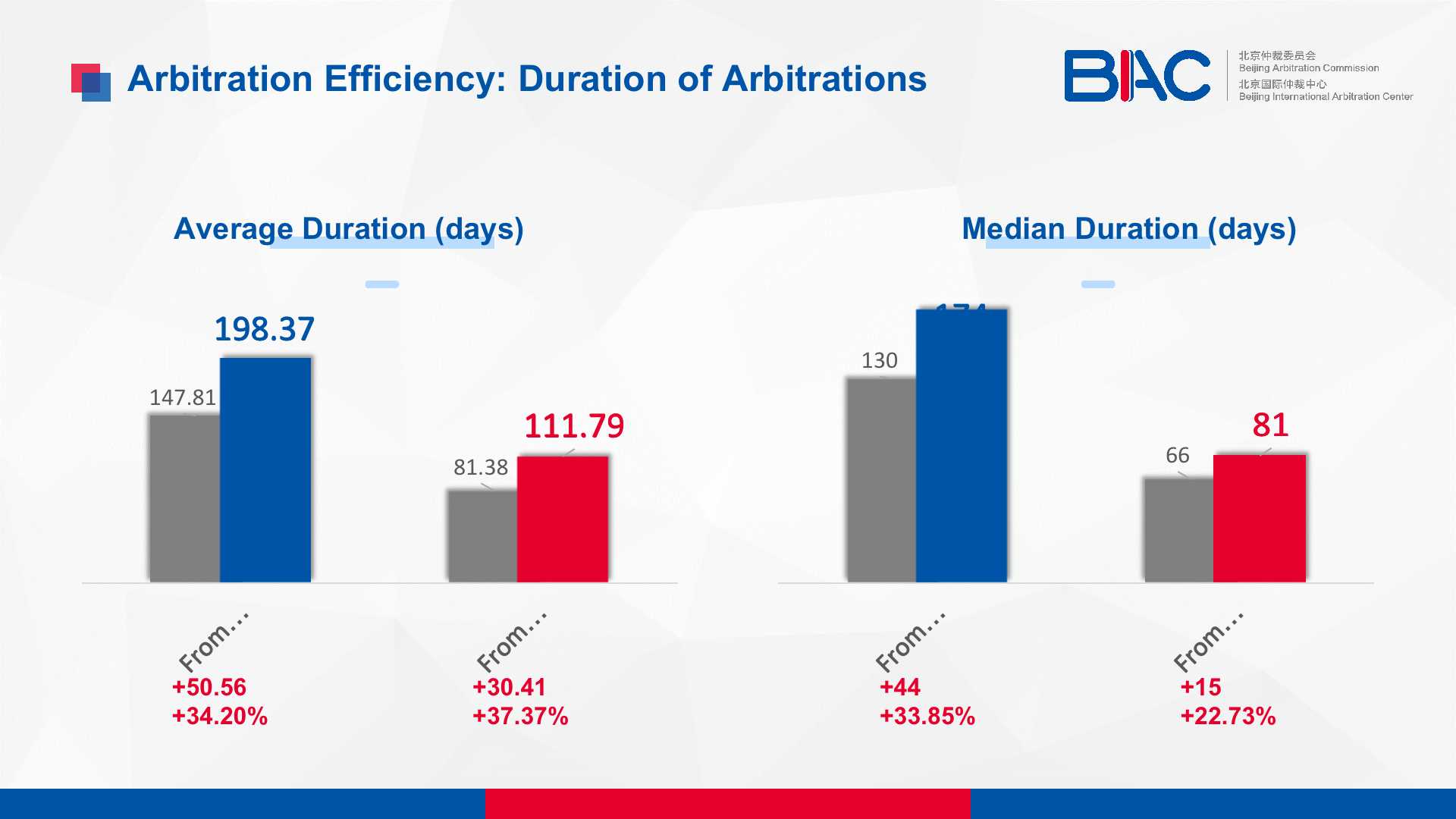
Cases Concluded in 2020 (by duration)
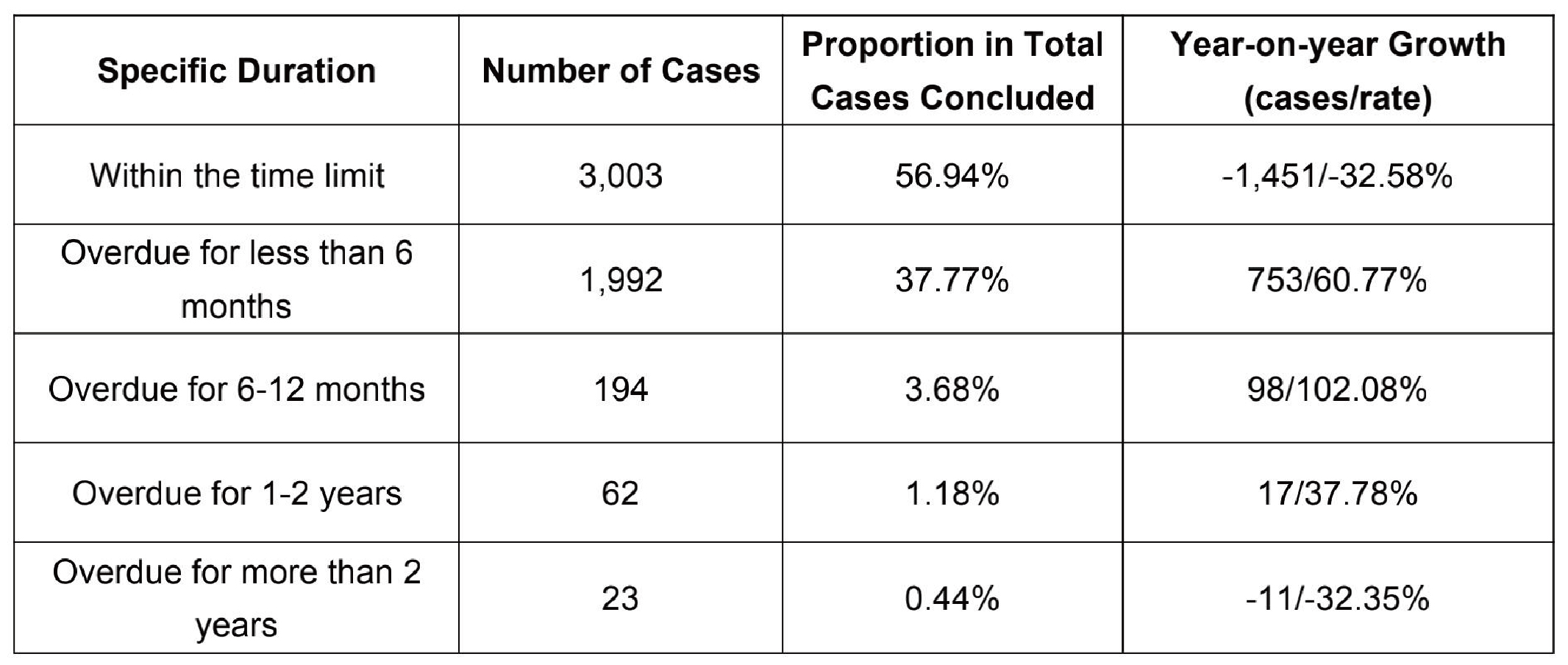
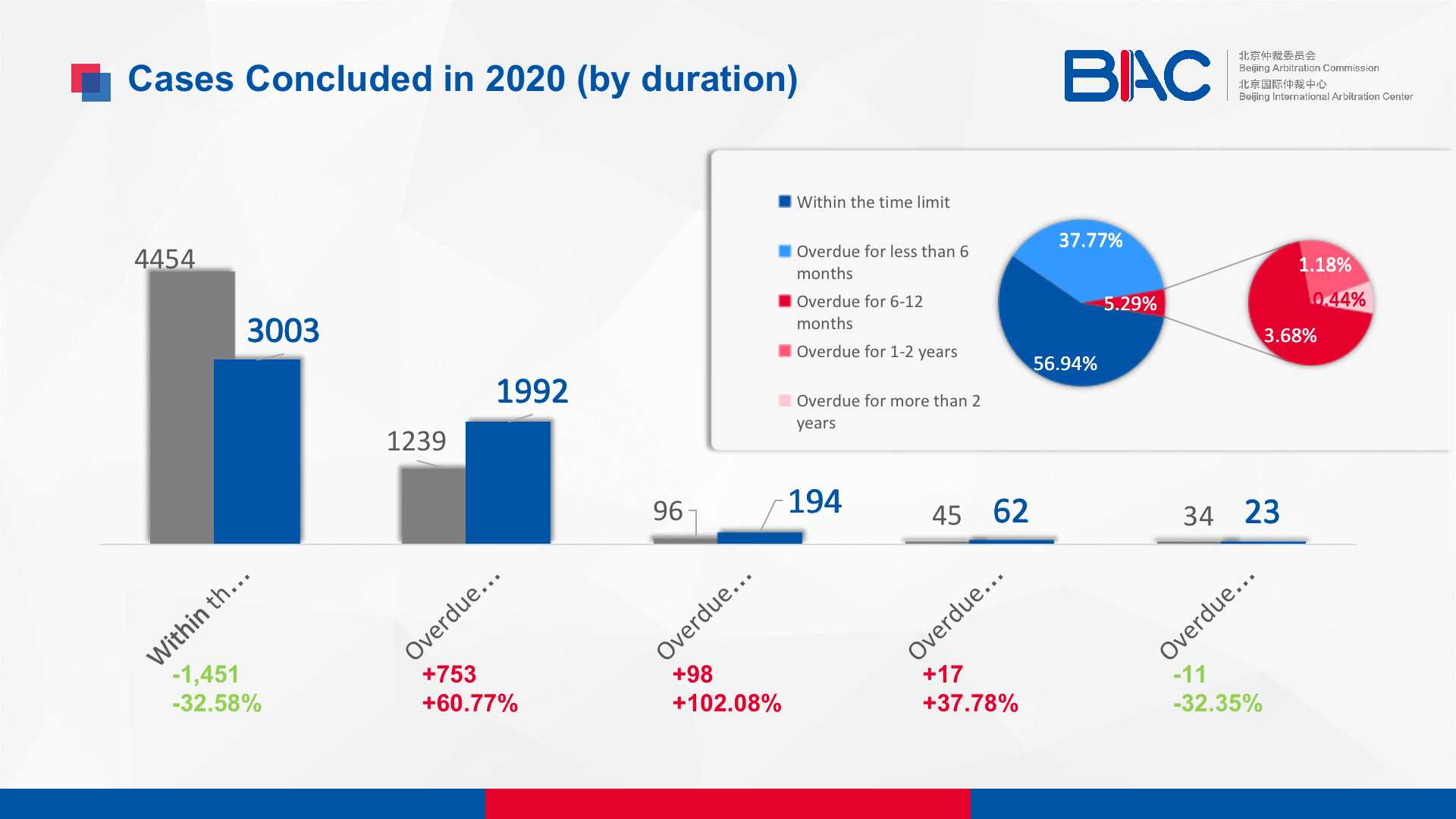
Statistics on Long-standing Arbitration Cases as of 31 December 2020
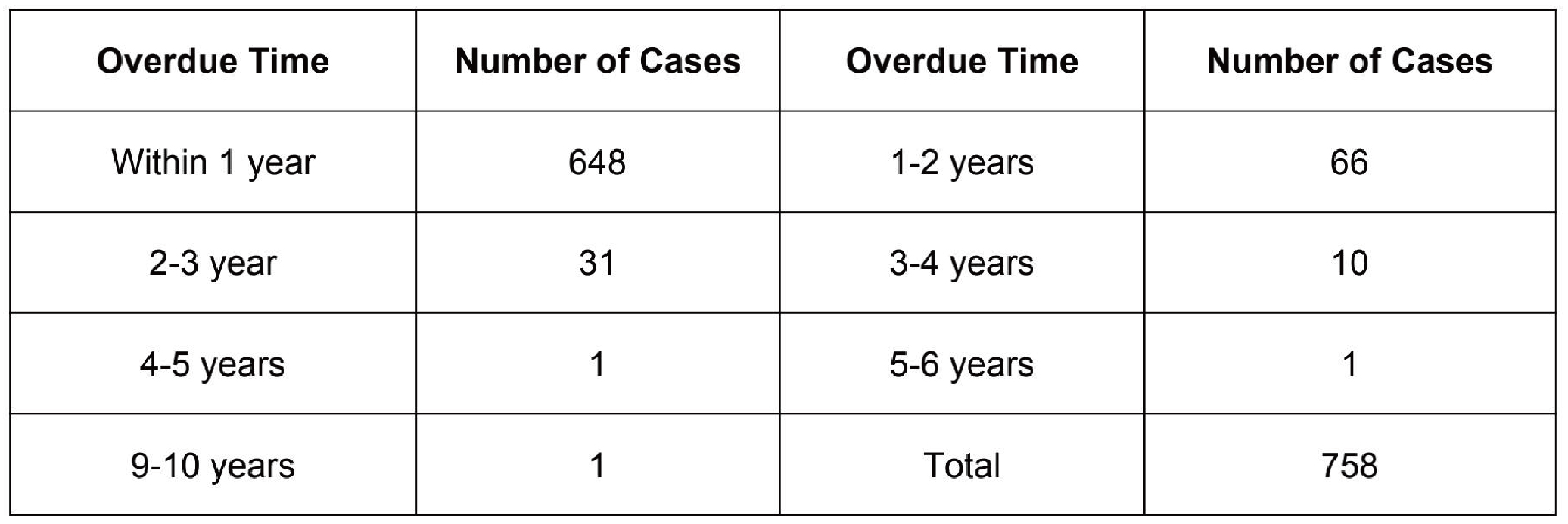
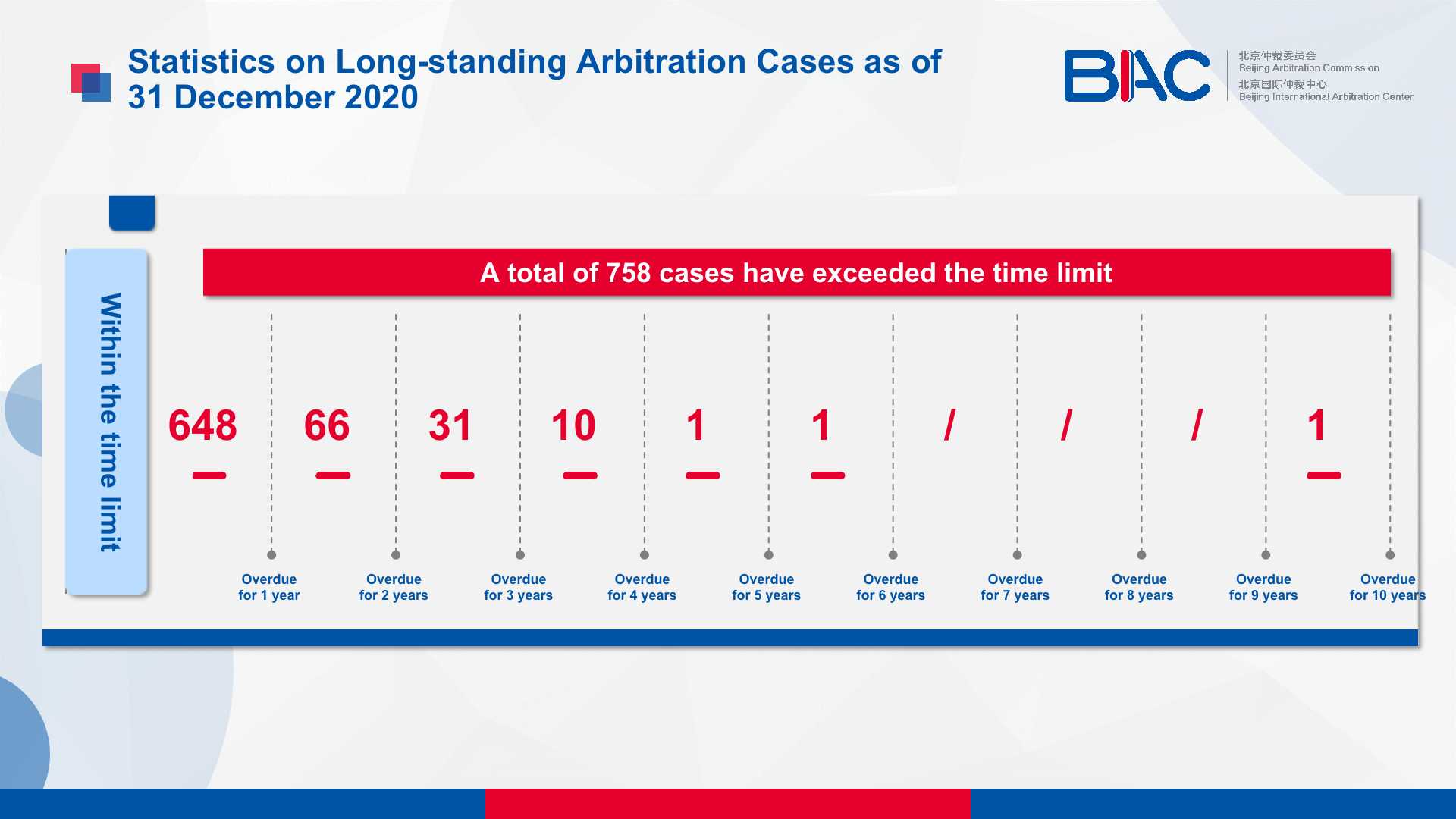
2. Hearings on non-working days

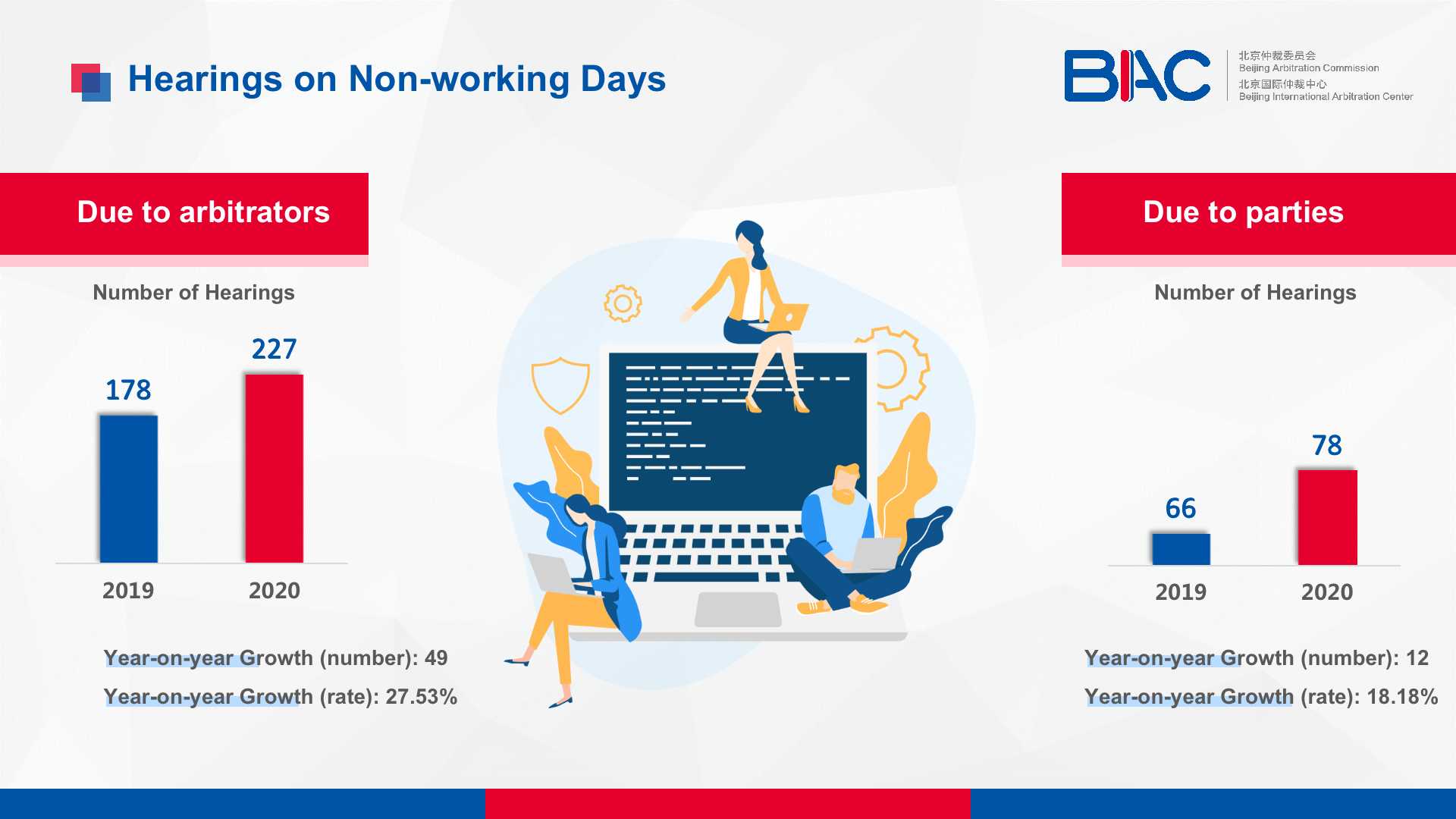
(III) Case Quality
1.Cases with Expert Consultation
In 2020, 7 cases resorted to expert consultation, staying the same level with the previous year.
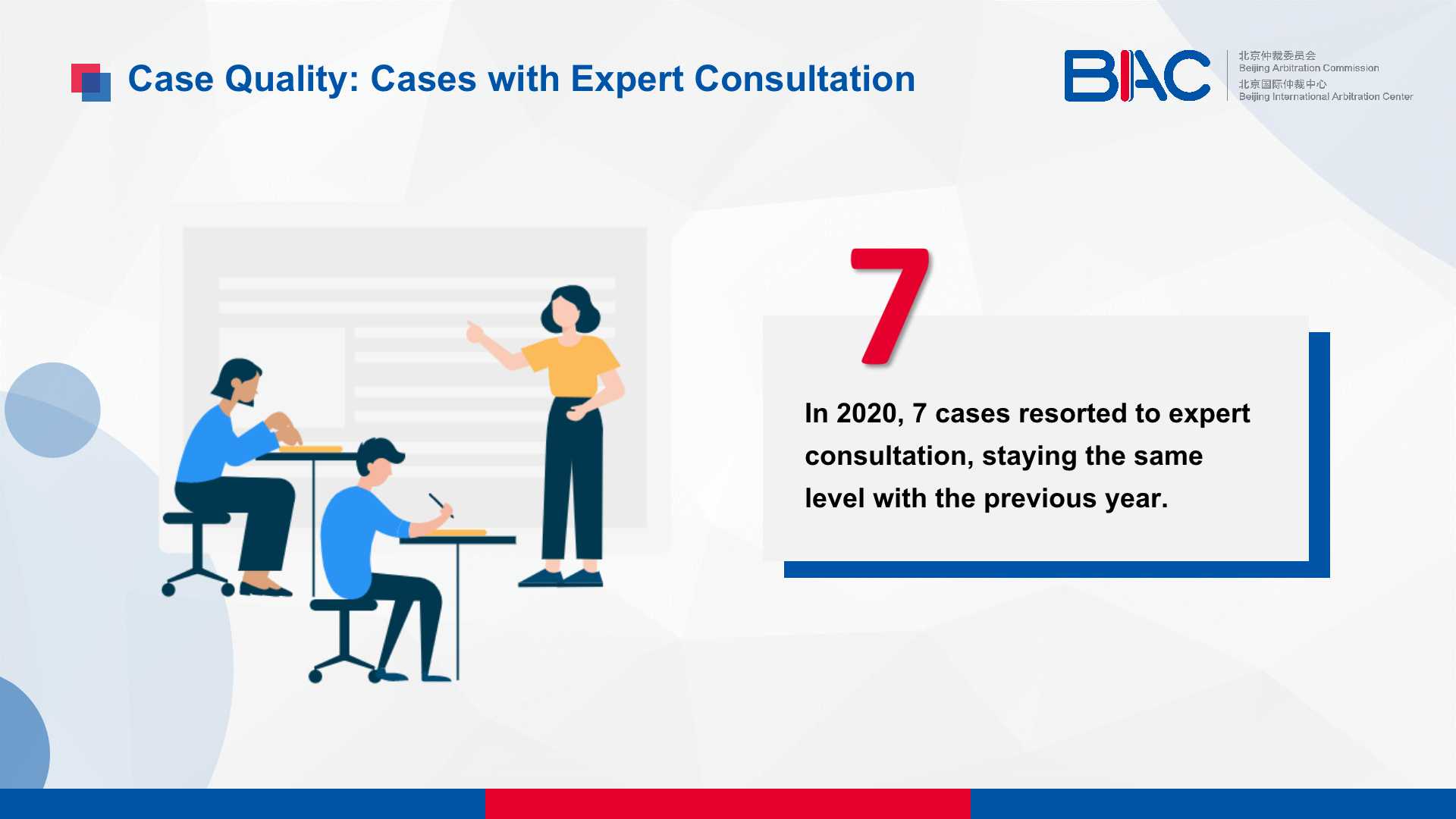
2. Revocation of Awards, Refusal to Enforce and Re-arbitration
2020 witnessed 1 award partially revoked by a court, 7 not enforced by courts outside Beijing, 4 not recognized and enforced by courts in Kyrgyzstan, and 2 subjected to re-arbitration according to the orders of courts.
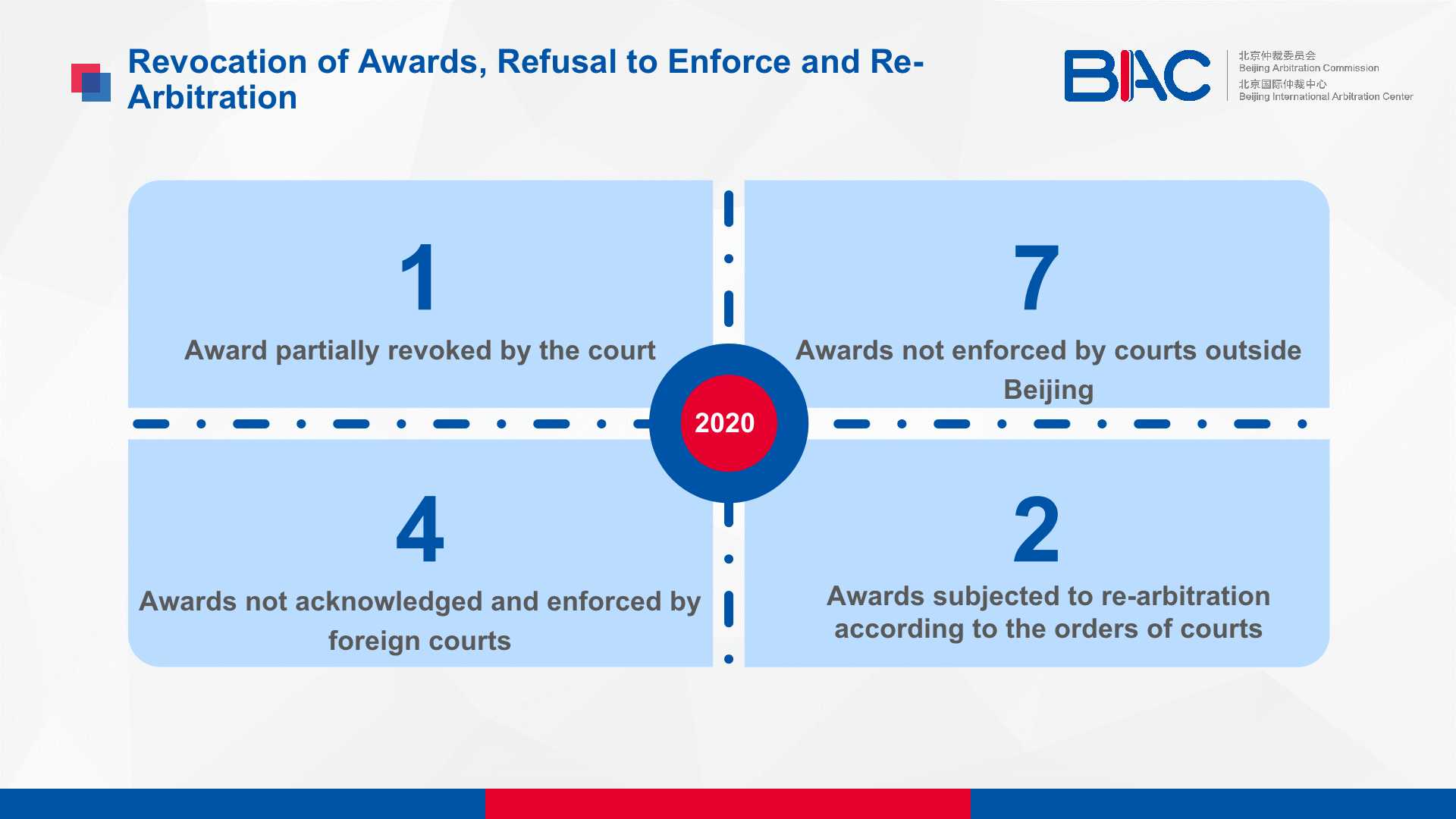
For the 7 awards that were not enforced by courts outside Beijing, the BAC/BIAC believed that these courts lacked supporting evidence for their decisions, and had submitted written statements to the concerned courts, the Provincial High People's Courts, and the Supreme People's Court respectively.
Although the winning parties in 4 international cases applied for enforcement in Kyrgyzstan, the awards, having been recognized by the courts of the first and second instance, were not recognized and enforced by the court of the third instance on the grounds that the agents of the losing parties attending the arbitration hearings actually had no right to represent the companies and that the losing parties had not actually received the notices of acceptance. Currently, the winning parties are preparing to resubmit evidence and request a rehearing by the court.
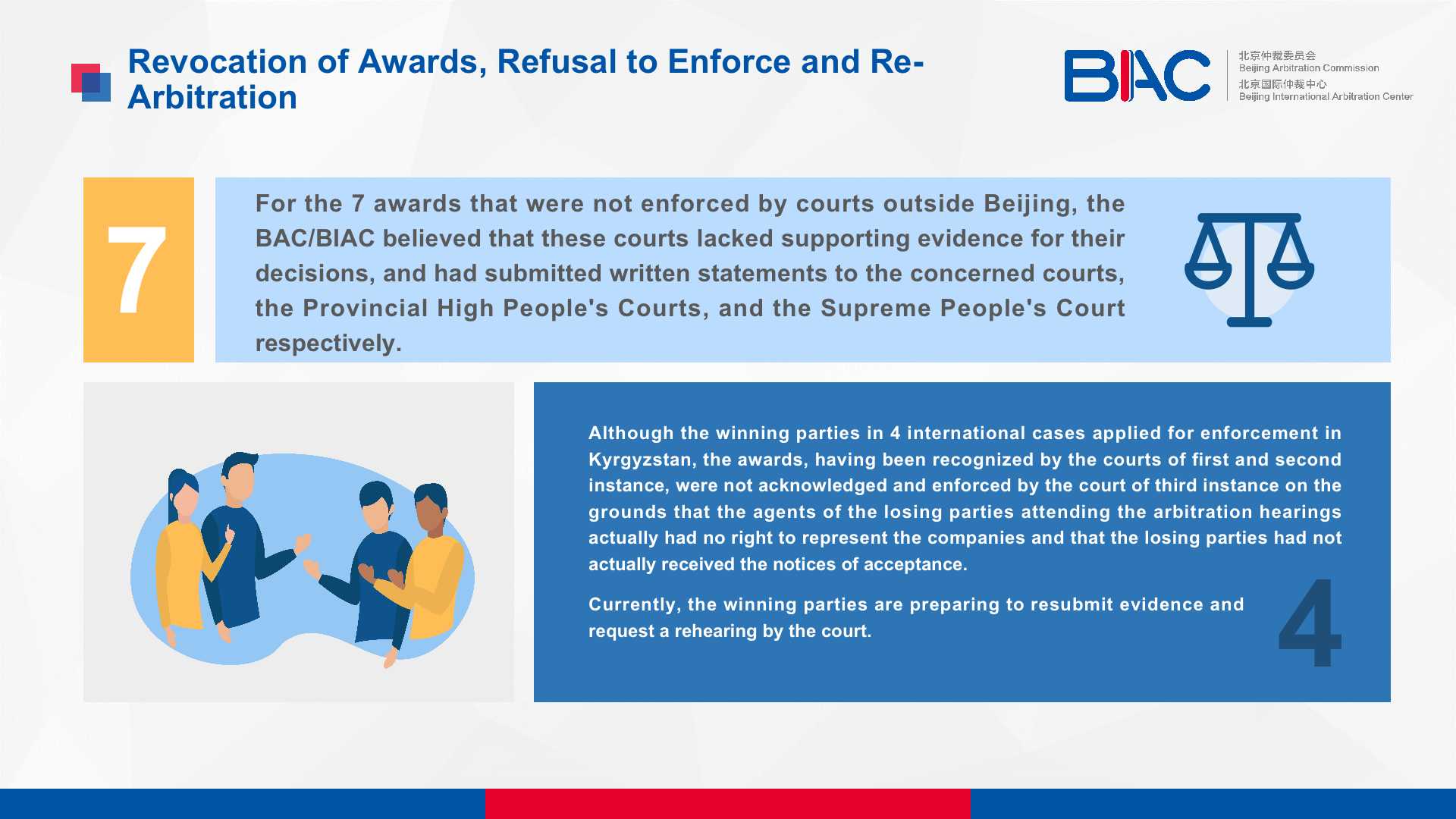
(IV) Arbitrator Management
1. Arbitrators' Involvement in Arbitration Case
2020 saw the involvement of 399 arbitrators (accounting for 63.74% of all BAC/BIAC arbitrators) in arbitration case, totaling 6,705 person-times. To be specific, 9 were from other countries (accounting for 2.2% of all arbitrators involved), totaling 60 person-times (comprising 0.89% of total person-times); 125 were females (accounting for 31.33% of all arbitrators involved), totaling 2,280 person-times of case management (comprising 34% of the total person-times).
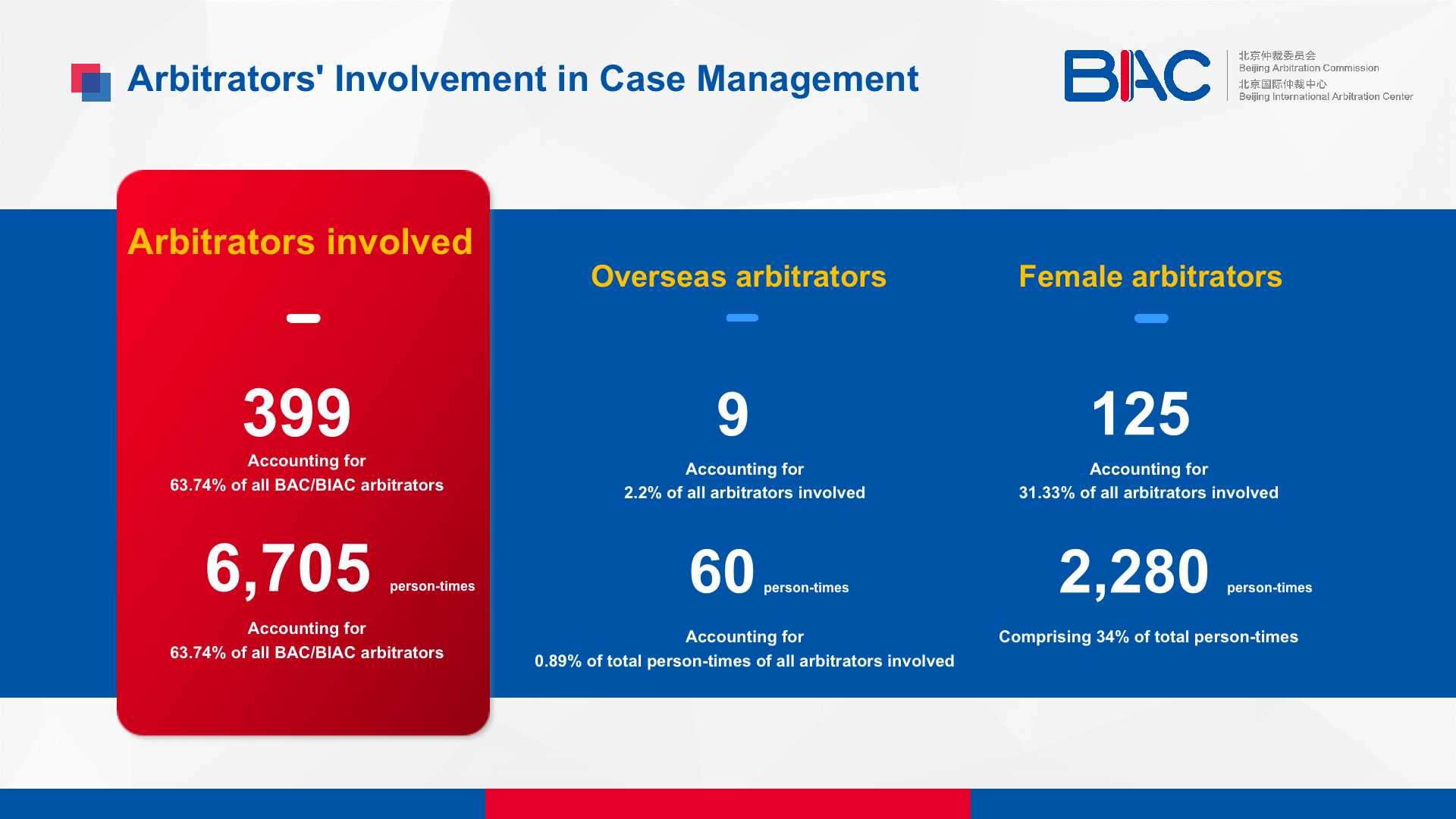
2. Appointment or Nomination of Arbitrators
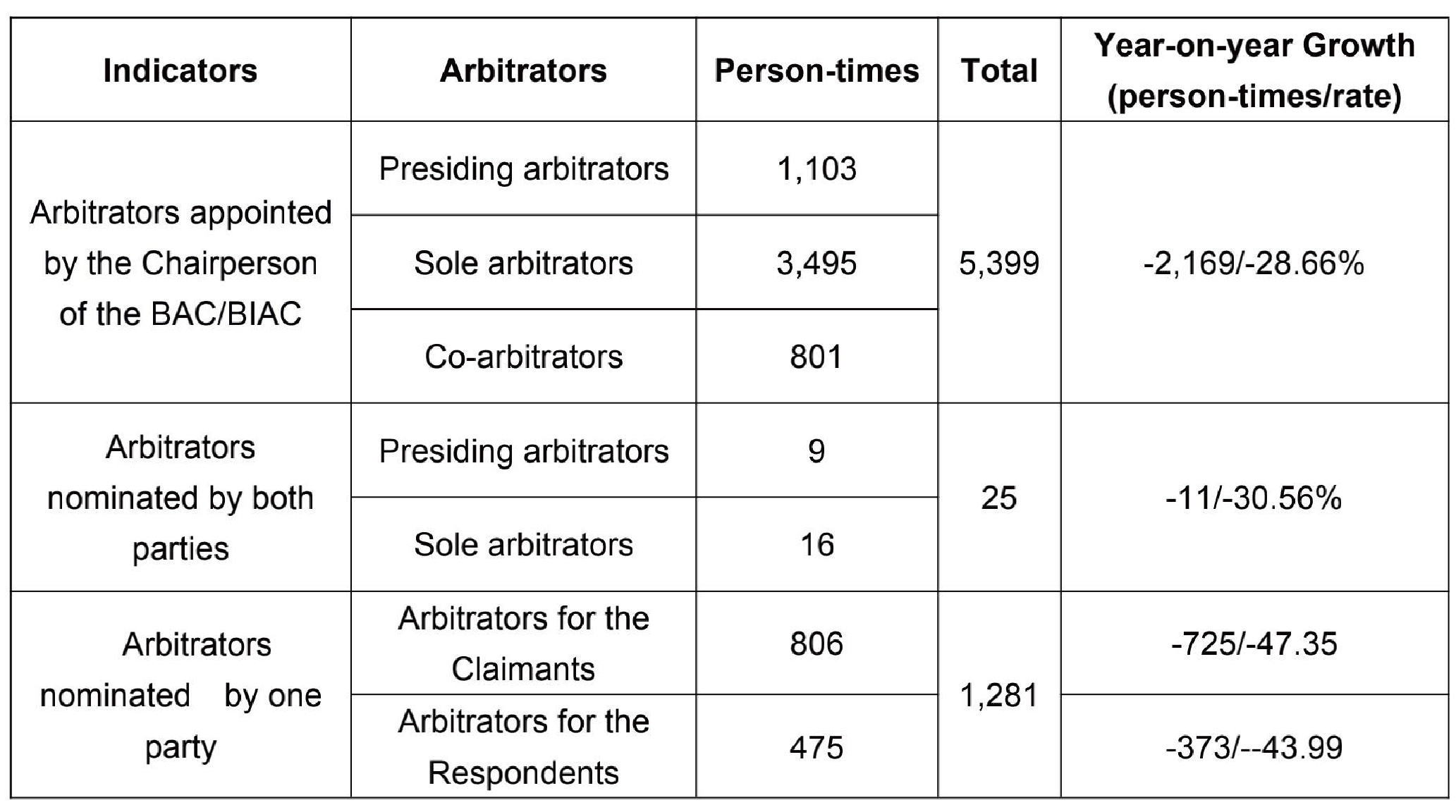
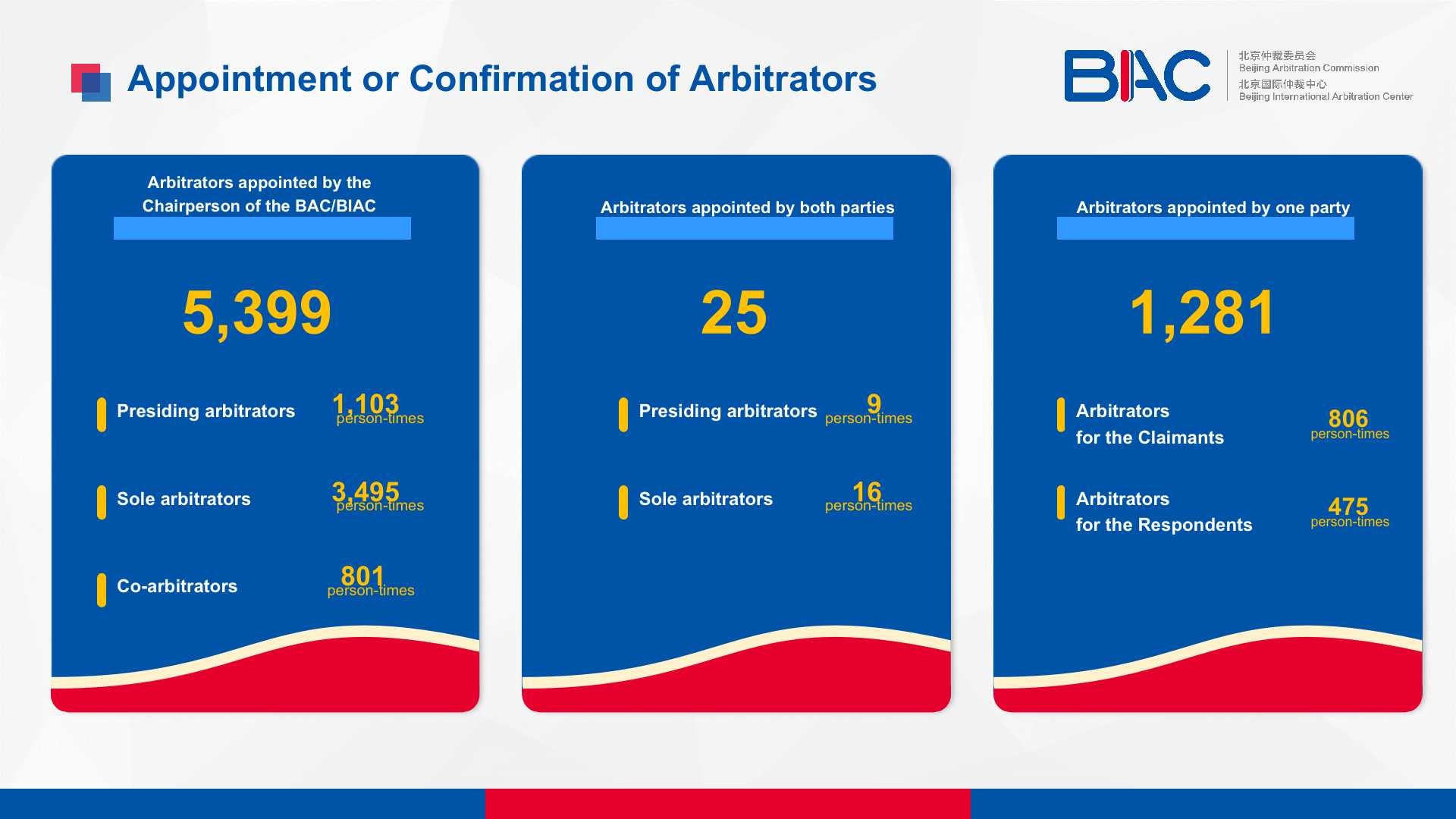
3. Challenges to Arbitrators
2020 saw 34 challenges to the arbitrators made by concerned parties. Specifically, 32 were rejected by the Chairperson of the BAC/BIAC because the alleged reasons for challenges were not found; the arbitrators in 2 cases volunteered to withdraw. No decision on the arbitrator's withdrawal was made by the Chairperson of the BAC/BIAC throughout the year.
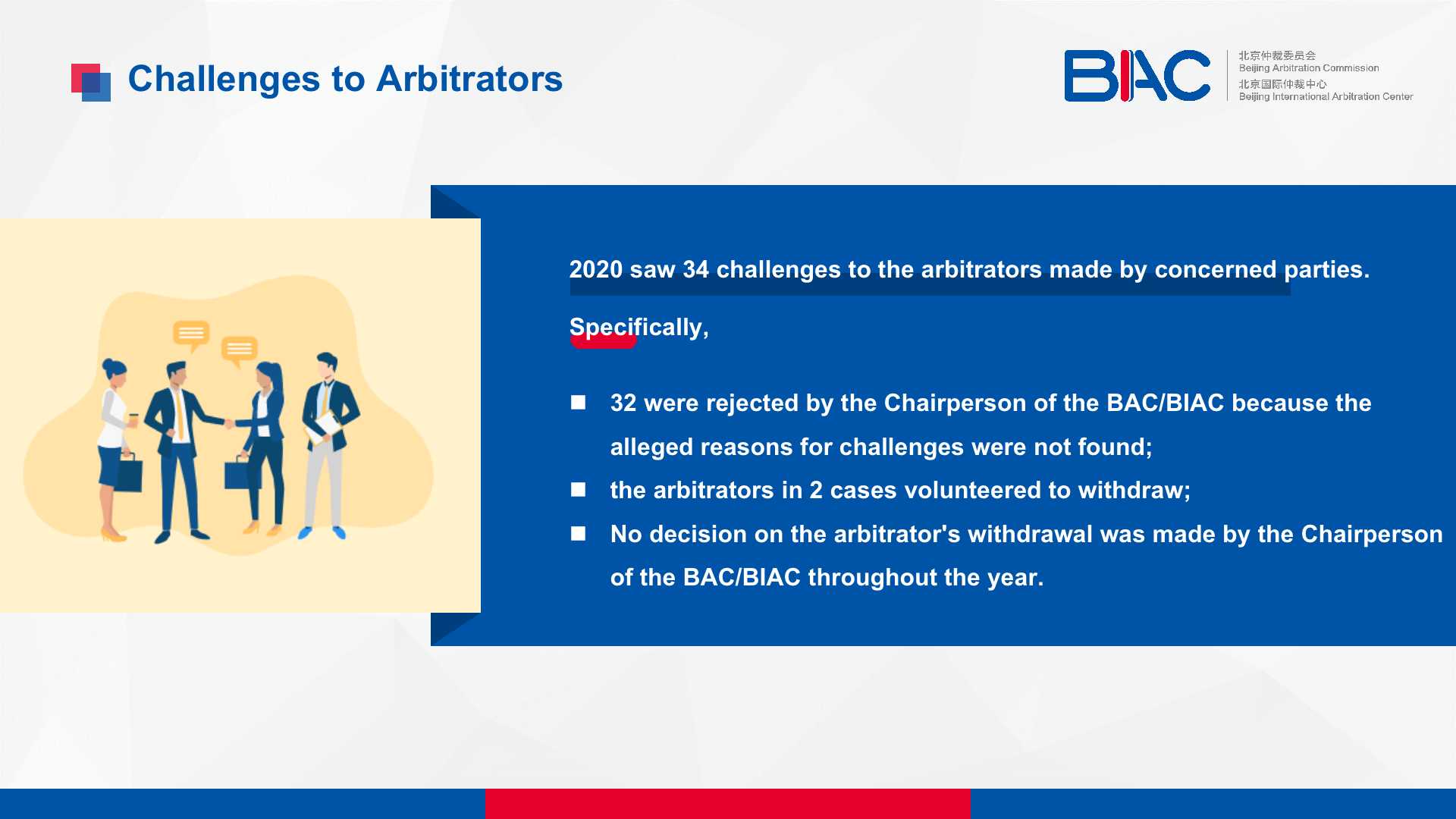
III. Decision-making and Supervision by the Committee
(I) Refining the Rules of Procedure of the Chairpersons' Meeting
On 31 July 2020, the BAC/BIAC Rules of Procedure of the Chairperson's Meeting (the "Rules of Procedure") were deliberated over and revised at the Chairpersons' Meeting. The revisions of the Rules of Procedure were shown below.
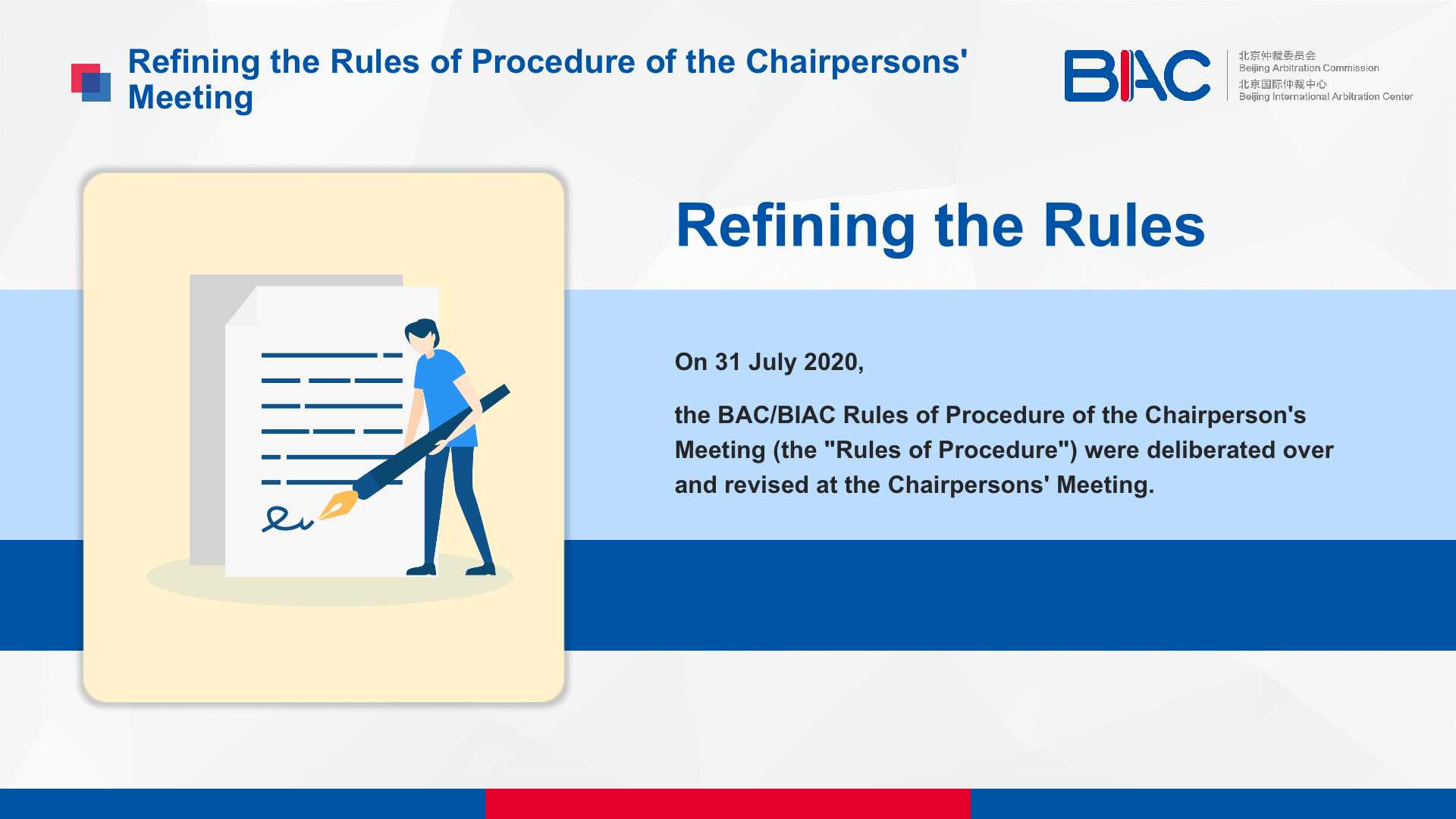
(II) Formulating Measures for Managing Labor Costs
On 17 November 2020, the Measures for Managing Labor Costs (Trial) were deliberated over and approved at the Twentieth Chairpersons' Meeting of the Seventh Committee to improve performance appraisal in a more objective and scientific manner and promote sustainable development of the BAC/BIAC.
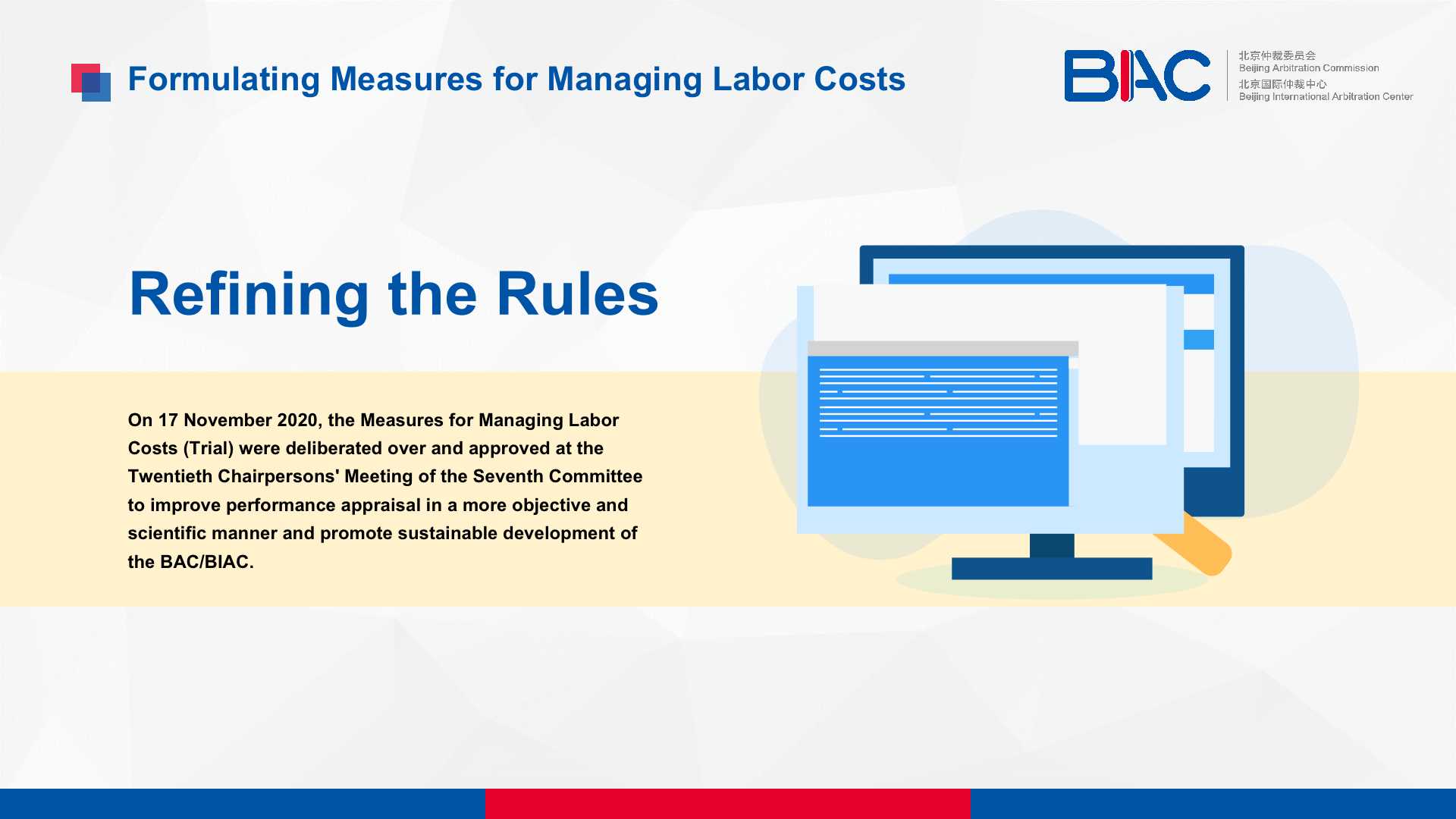
(III) Developing the Strategic Plan of the BAC (BIAC)
The Strategic Plan of the BAC (BIAC) was deliberated over and approved at the Eleventh Chairpersons' Meeting of the Seventh Committee on 18 January 2020 and at the Fifth Plenary Meeting of the Seventh Committee on 19 January 2020, providing practical suggestions for the future development of the BAC/BIAC.
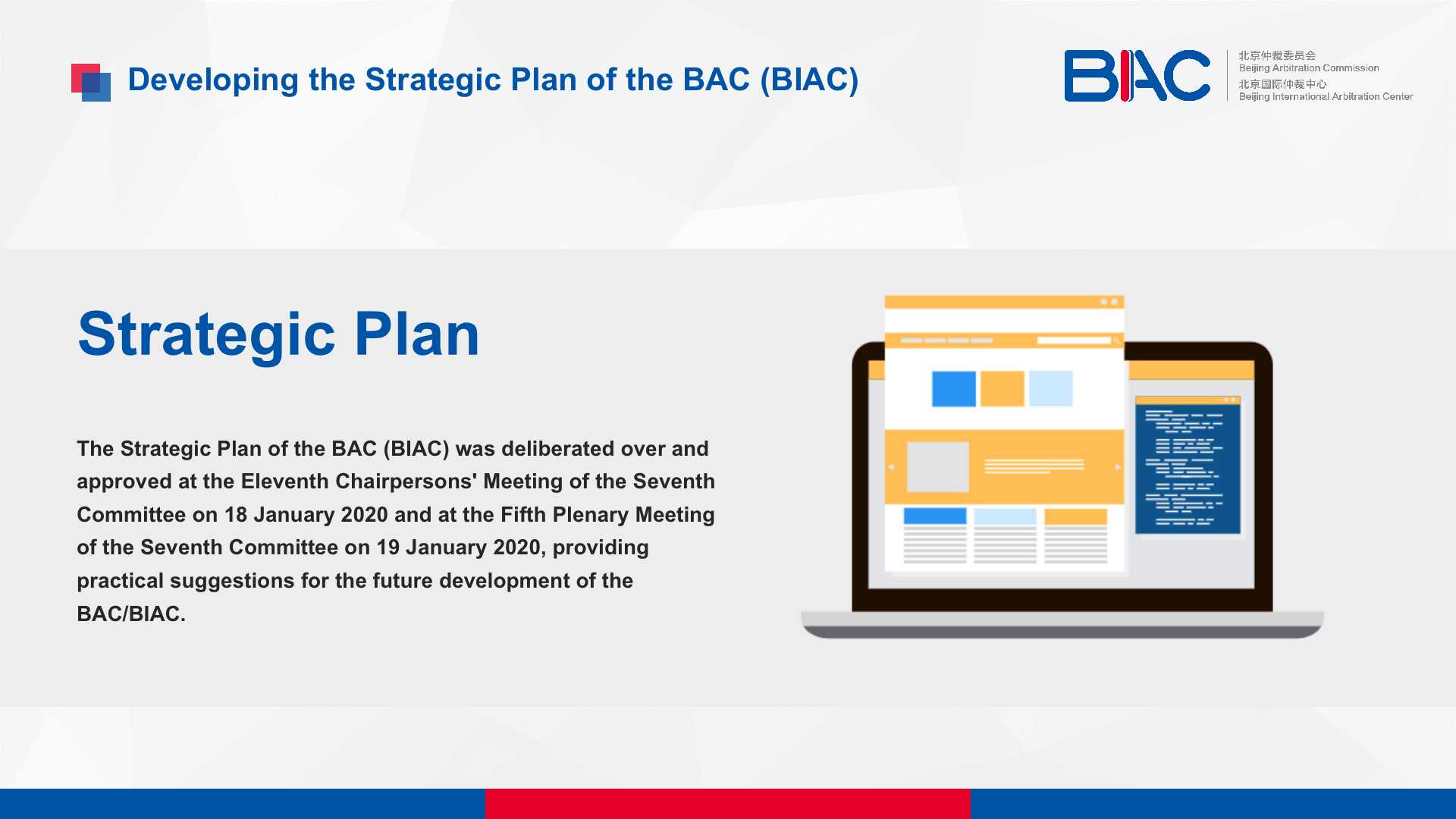
(IV) Earnestly Perfecting and Implementing Relevant Rules and Regulations of the Office
On 19 January 2020, it was pointed out at the Fifth Plenary Meeting of the Seventh Committee that the Office should focus on providing fundamental services in 2020, and that the year 2020 was seen as a "Foundation Year". The Committee ensured the strict implementation of every internal management system by supervising the Office's compliance with rules and regulations.
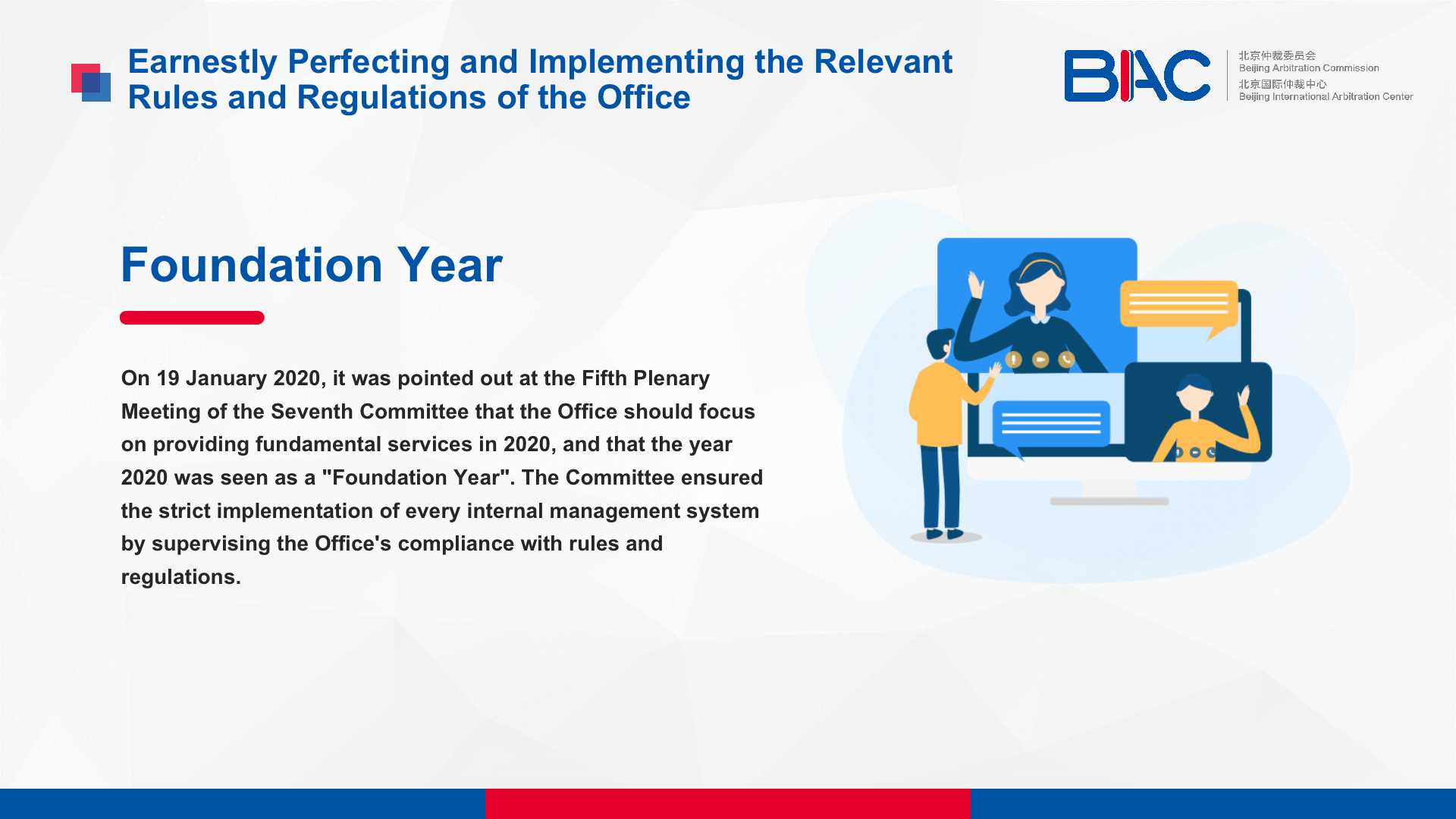
(V) Overall Design of Office Space of Three and a Half Floors
On 22 April 2020, it was agreed at the Twenty-Third Meeting of the Salary and Performance Appraisal Committee that the Office would take back the seventh-floor office space for its own use, and design and renovate the office space of three and a half floors owned by it.
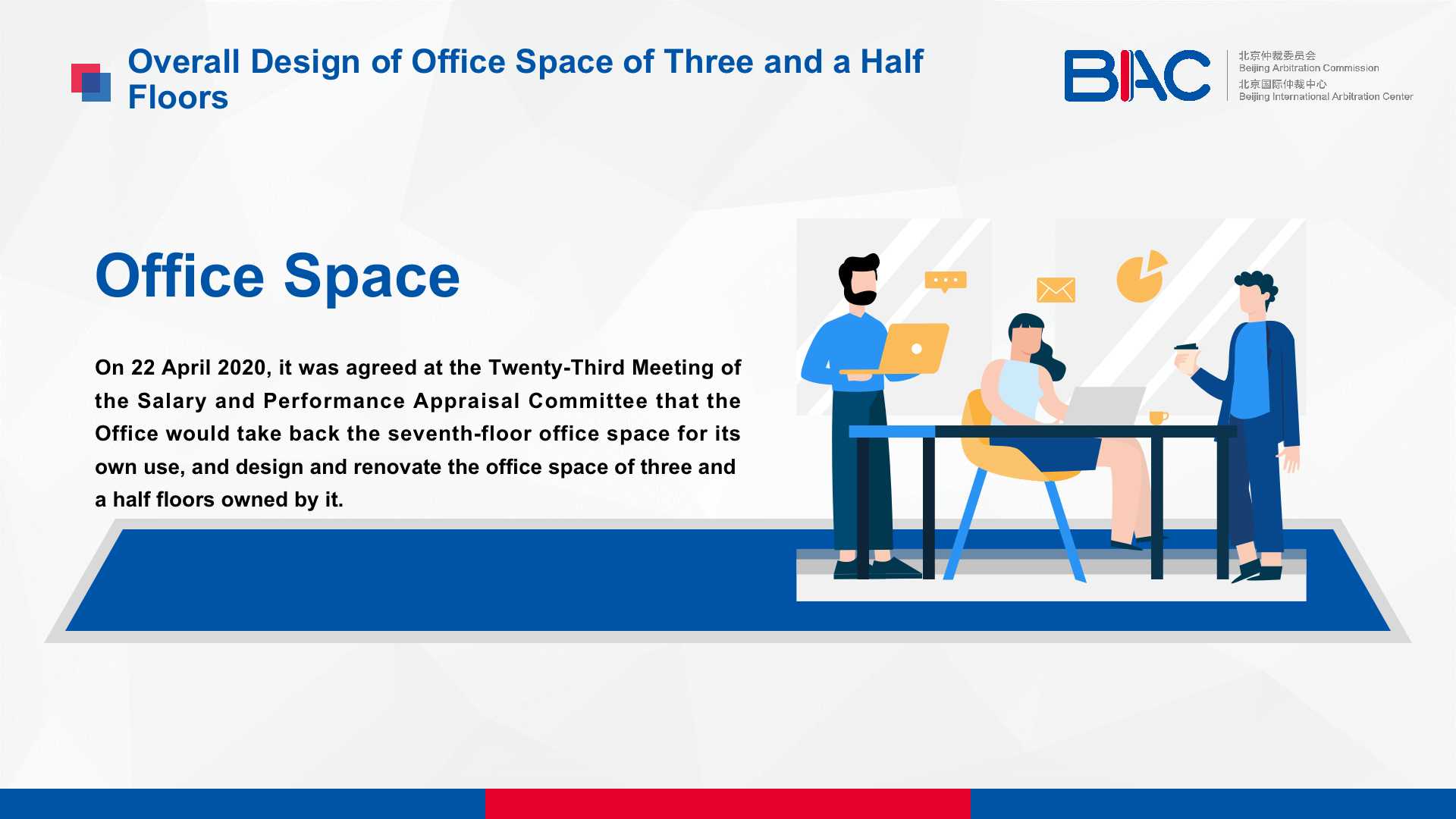
(VI) The "BAC/BIAC Chronicles" Project Kicked off and Advanced Smoothly
In 2019, the Committee requested the Office to compile the "BAC/BIAC Chronicles". In 2020, the Office officially started the work and invited five experienced experts to collect data and compile the chronicles by providing information, coordinating meetings, and guaranteeing material supply. At present, the "BAC/BIAC Chronicles" Project is advancing smoothly, with its outline already completed, laying a solid foundation for subsequent work.
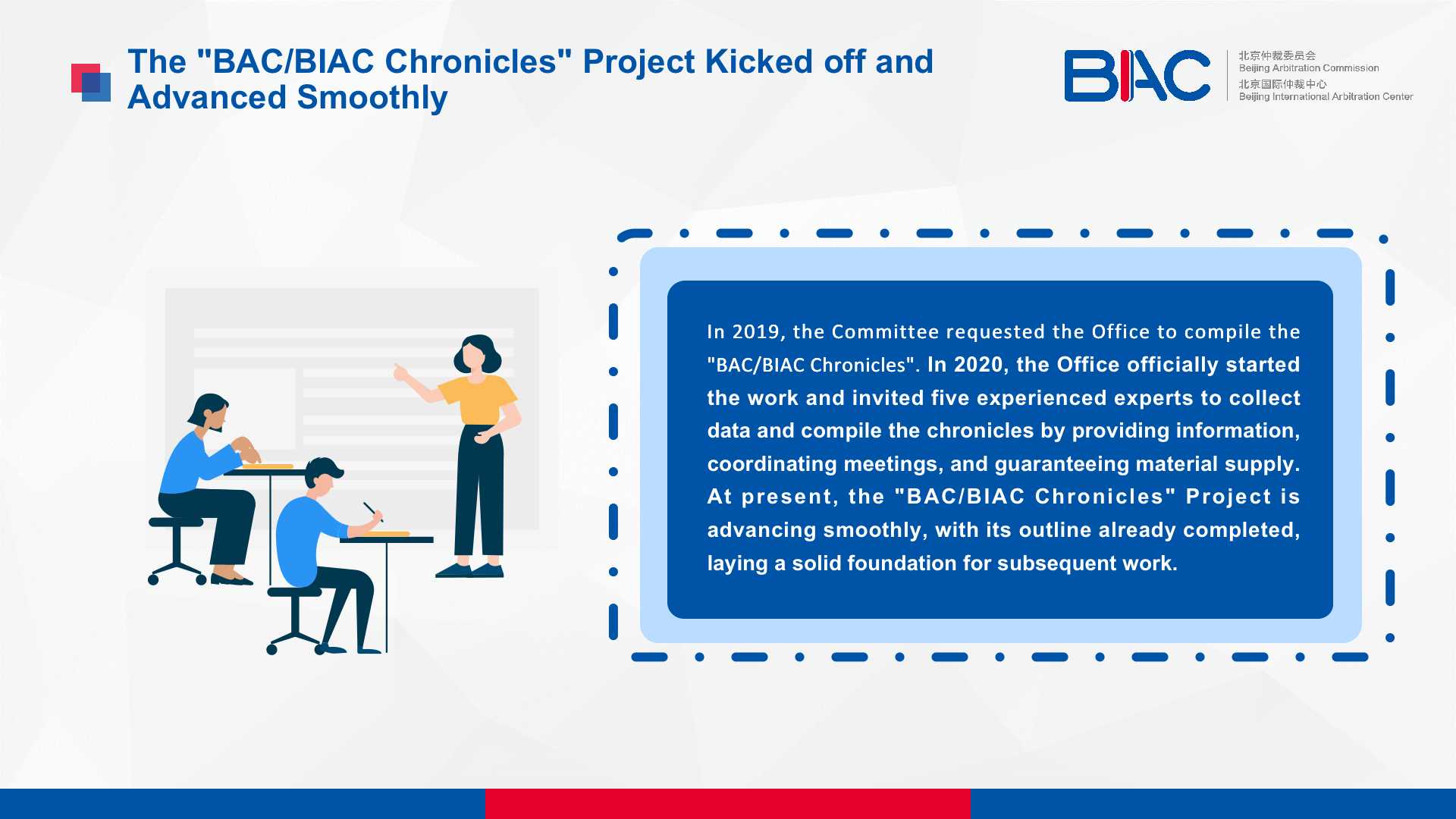
IV. Propaganda & Development
(I) Regular Propaganda and Development
In 2020, the Office held 80 meetings, including 9 offline ones, 17 online ones, and 54 online courses under "Meet the Arbitrators". A total of 177 guest speakers and 164 cooperative partners were invited, harvesting 57,165 online views from 40 countries and regions. Every single live meeting embraced 1,000 views on average, greatly outperforming the offline one with only about 70 participants, breaking through geographical limitations, and drawing the attention of lots of audience outside Beijing (58.26% from outside Beijing, including overseas ones).
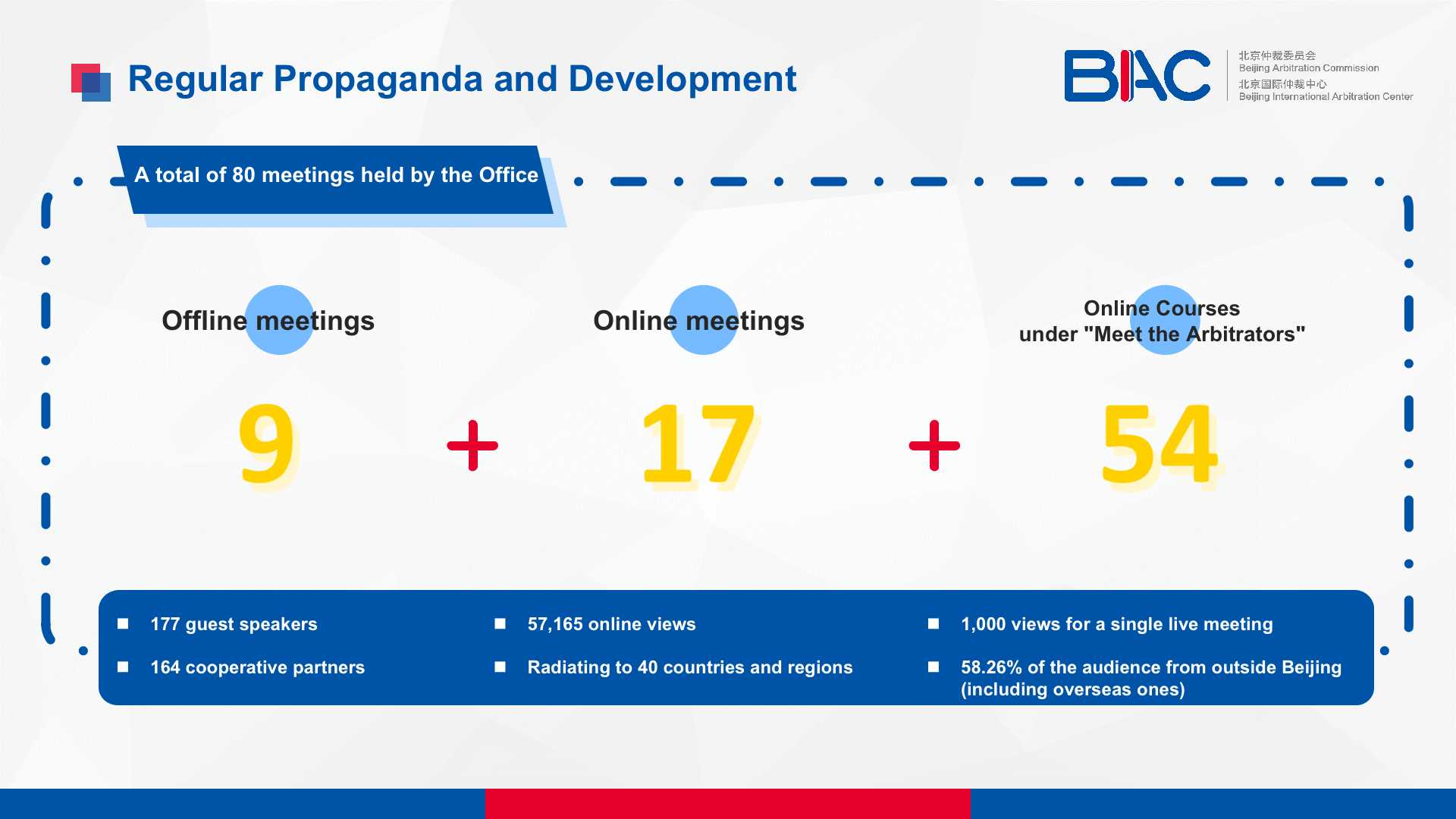
In 2020, the BAC/BIAC Office attended 31 external conferences and delivered 36 speeches. 16 visits were welcomed, totaling over 100 visitors. 13 training sessions were organized, benefiting 90,470 trainees in total.
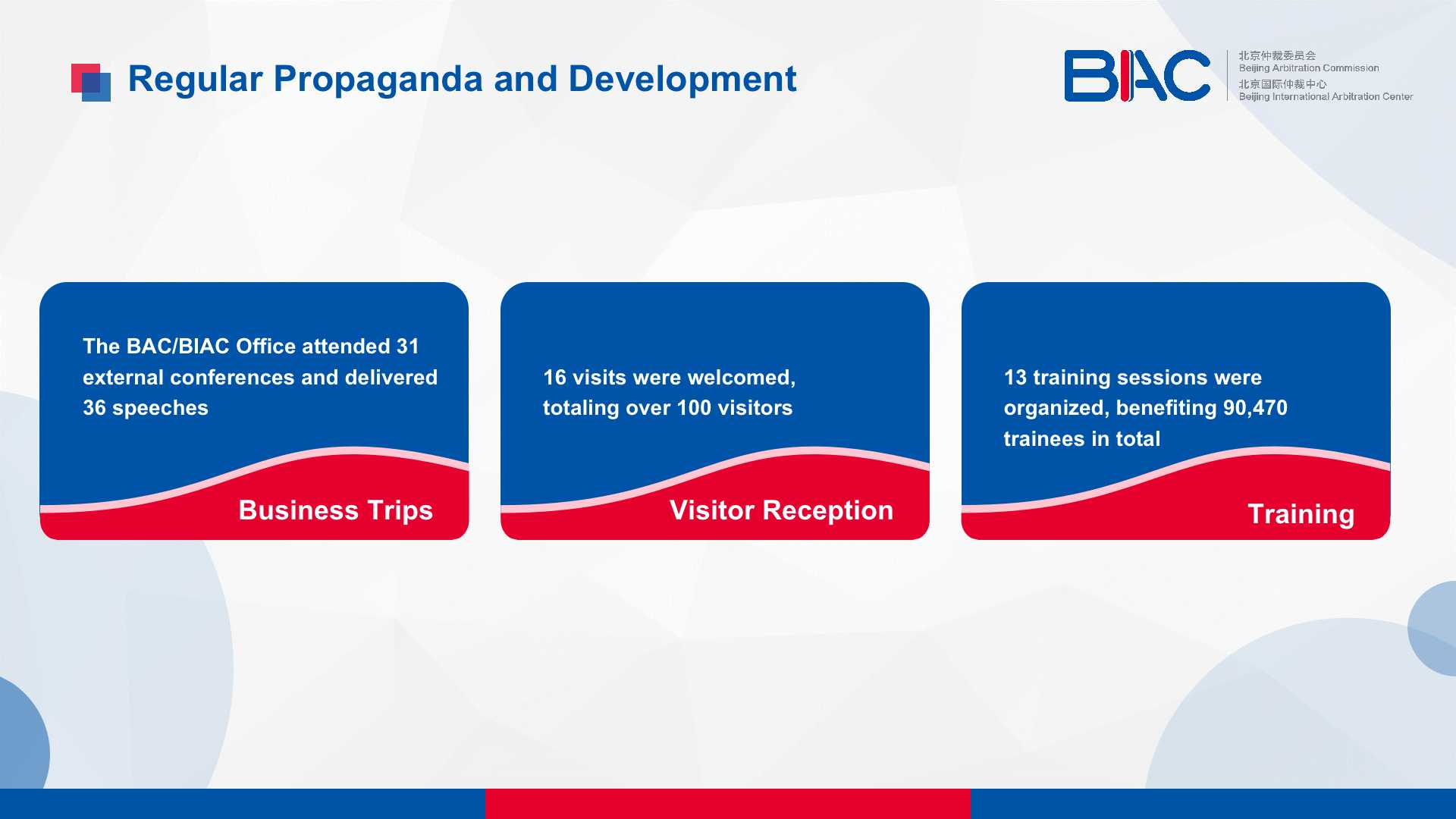
In 2020, the Office renewed and distributed the 2020 BAC/BIAC Scholarship for University Students from Central and Western China. Moreover, the scholarship winners were assessed and finalized by different means. Especially, Wuhan University and Zhongnan University of Economics and Law continued to determine the scholarship winners through application and oral defense, while Northwest University of Political Science and Law organized a mock case contest, which attracted nearly 200 participants. Seven universities renewed scholarship agreements with the BAC/BIAC in 2020. In particular, Southwest University of Political Science and Law adjusted the assessment and finalization mode through negotiation, and would also determine the scholarship winner through application and oral defense so that the candidates could better demonstrate their abilities.
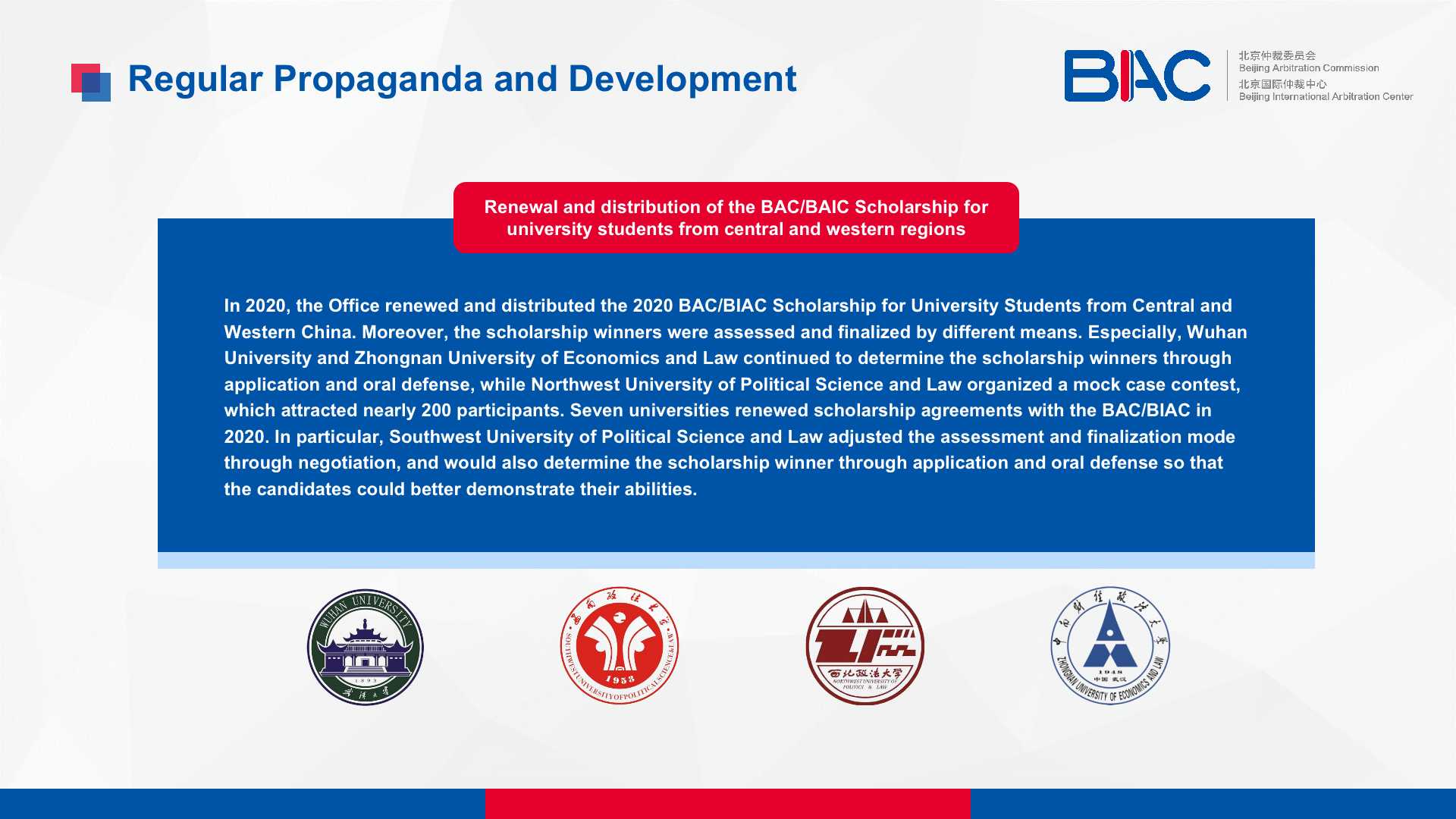
In 2020, the Office completed the Annual Review and Preview in both Chinese and English (350,000 characters in the Chinese version and 290,000 words in the English version) as scheduled. For the first time, the Chinese version was released on the official WeChat account of the BAC/BIAC this year, winning more than 20,000 views. Meanwhile, the Office also compiled intellectual property awards, edited four volumes of "Beijing Arbitration Quarterly", published the BAC/BIAC translated book series, established 20 scientific research fund projects, and held BAC/BIAC essay contest.
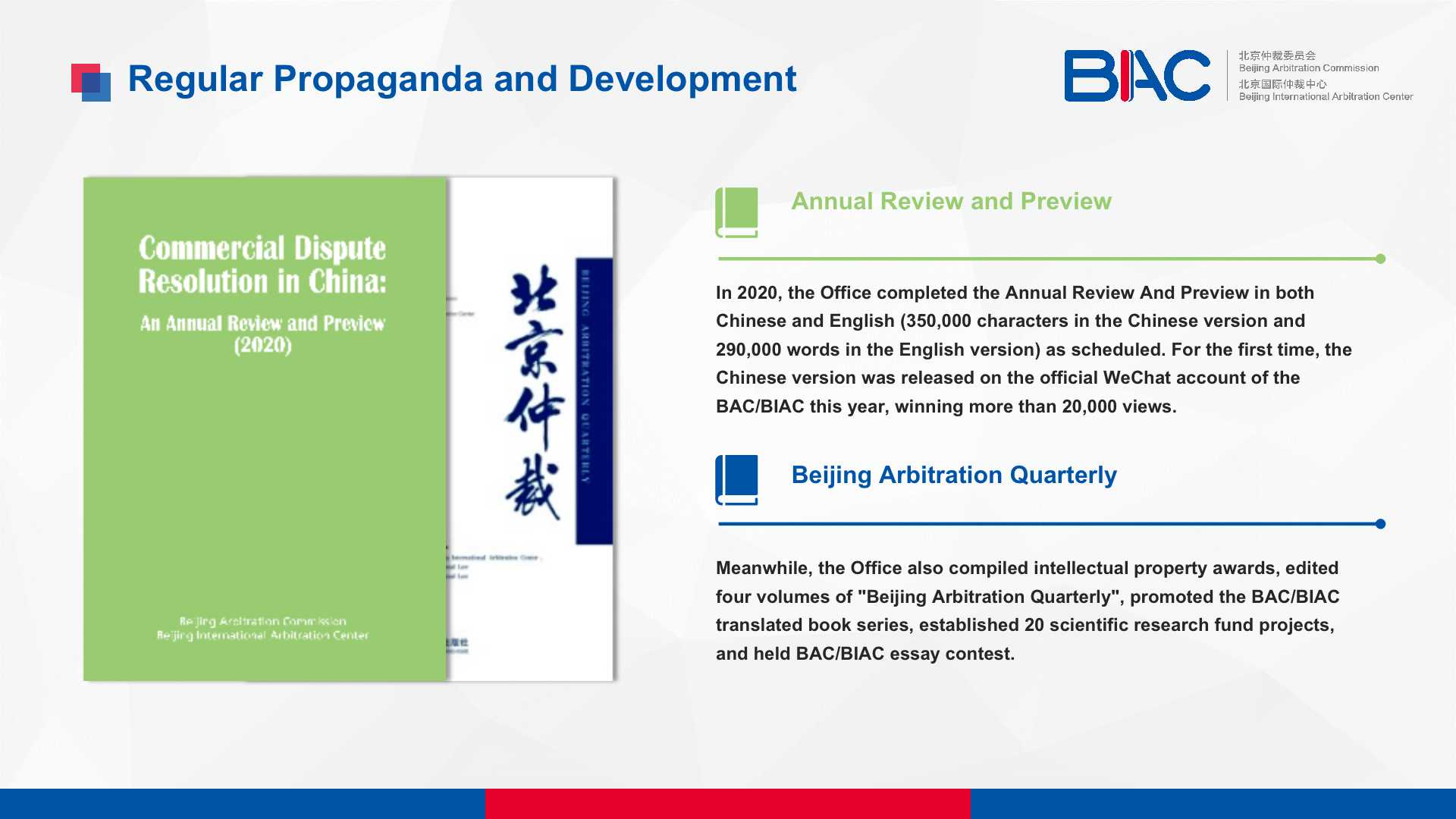
In 2020, by attracting clients through various activities, the Office enlisted 9,913 new clients (including lawyers, in-house legal counsels, chambers of commerce, arbitration institutions, embassy staff, and media staff from 34 countries or regions) to the 11,968 ones. To retain its users, by selecting the latest trends and theoretical research results of the BAC/BIAC and the industry, the Office sent them 12 batches of BAC/BIAC monthly newsletters in both Chinese and English (including 42 pieces of BAC/BIAC news, 32 pieces industry news, and 104 BAC/BIAC and industry research articles), and also advanced key expansion and cooperation projects by pushing feature articles (such as Meet the Arbitrators, the Annual Review And Preview); a total of 87,093 pieces of data were released throughout the year.
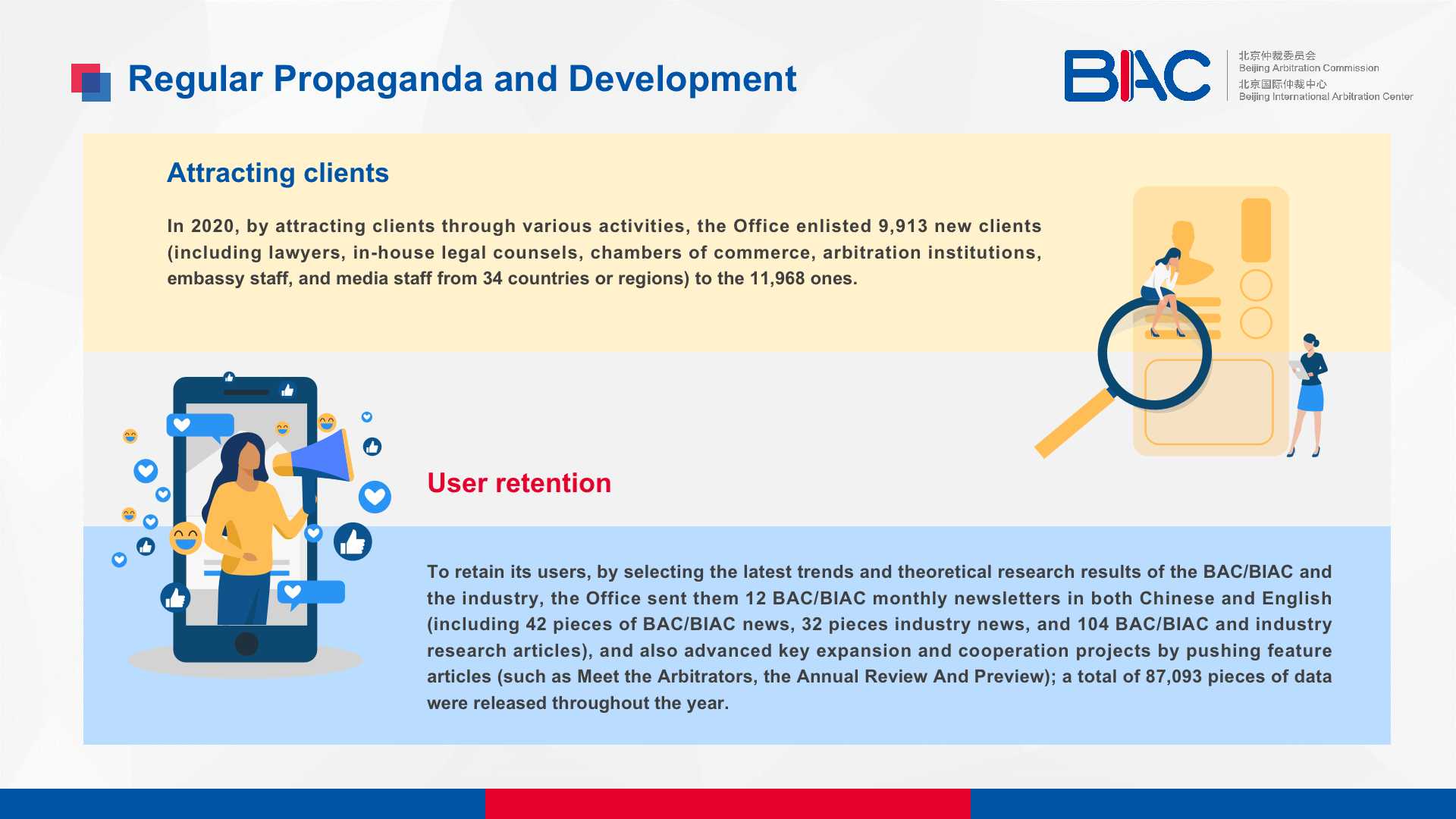
(II) Major Propaganda and Development
1. Online Courses under "Meet the Arbitrators"
2020 marked the launch of a series of online courses under "Meet the Arbitrators" by the Office. The goal was to attract the attention of legal counsels, lawyers, judges, and arbitrators with legal basics through systematic and high-quality courses. In 2020, 54 courses were offered, and over 18,000 active followers were secured in total, of which 50% were from enterprises, with the ratio between live views and playbacks about 1:2.
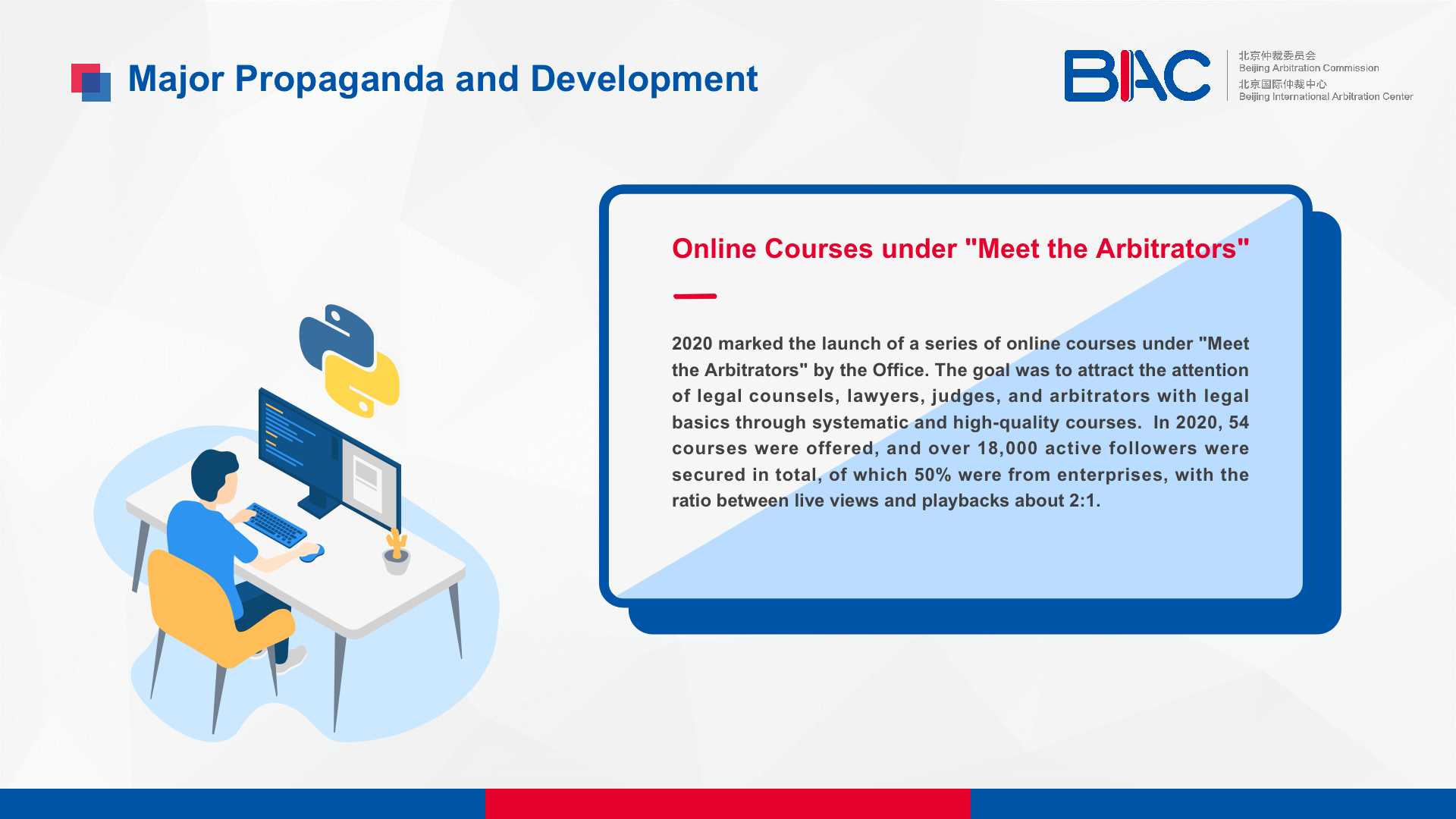
2. Promoting Practice Courses in Universities
In 2020, the Office kept on promoting International Commercial Arbitration Theory and Practice Courses in well-known universities in Beijing, Shanghai, and Guangzhou. To be specific, the BAC/BIAC initiated the course English Contract Law in four universities including the University of International Business and Economics, Peking University, Fudan University and East China University of Political Science and Law, and the course International Commercial Arbitration Theory and Practice in three universities, namely, China University of Political Science and Law, Beijing Normal University and Sun Yat-sen University. Depending on the epidemic prevention and control in each university, the courses were delivered through online and offline channels. According to statistics, 314 students enrolled in these elective courses, with a year-on-year increase of 71.58%. Besides, about another 100 undergraduates and industry practitioners also attended these courses.
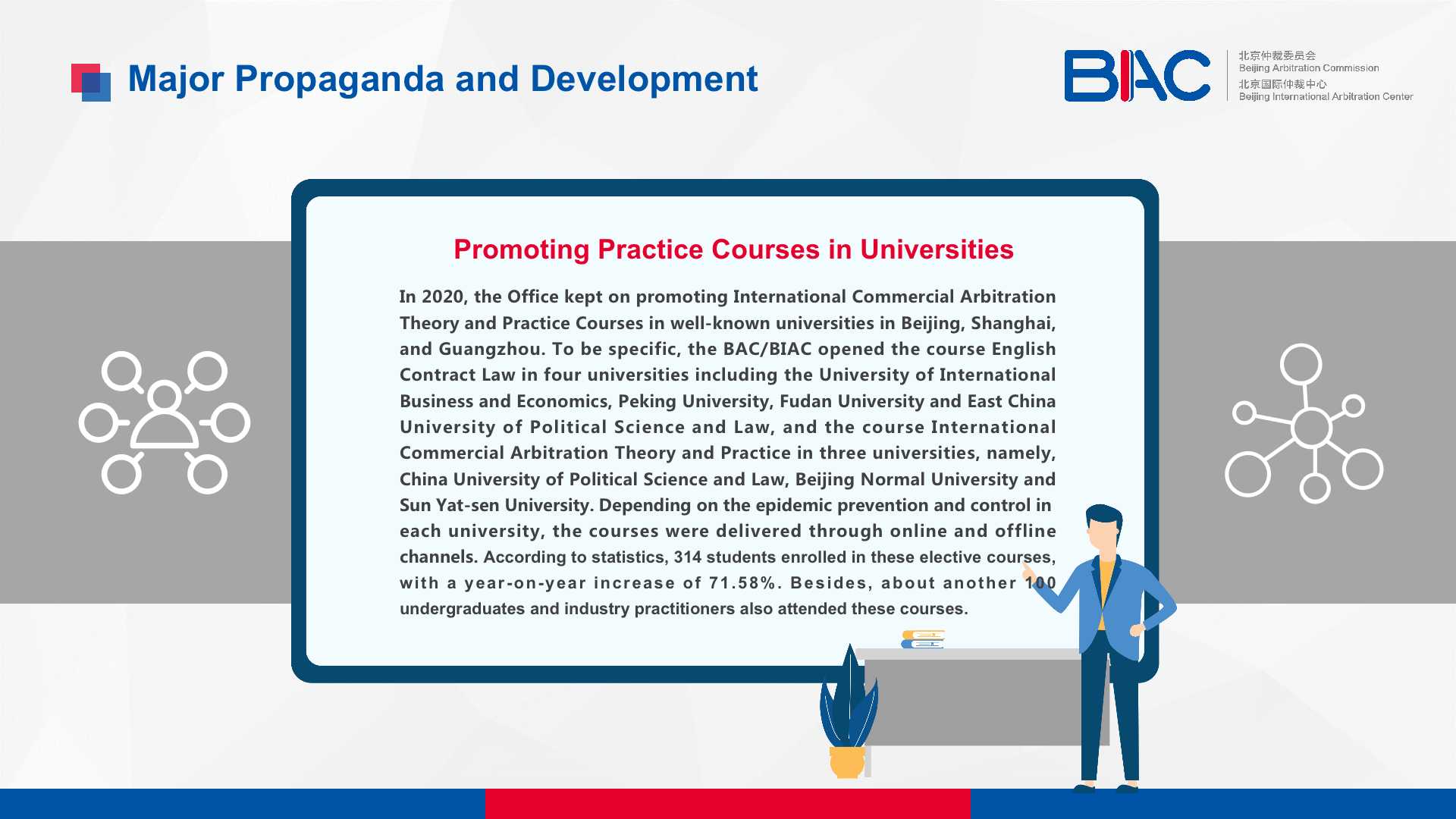
3. Domestic and Overseas Release Conferences on Annual Review and Preview
In 2020, the Office held online domestic and overseas release conferences on Annual Review and Preview and reported and released the arbitrations in the sports industry for the first time. The overseas release conference was co-organized by the BAC/BIAC and 7 overseas institutions, namely, the Center for Commercial Law Studies at the Queen Mary University of London, the Chartered Institute of Arbitrators, the Asian International Arbitration Center, the Arbitration Foundation of Southern Africa, the Cairo Regional Center for International Commercial Arbitration, the Nairobi Center for International Arbitration, and Judicial Arbitration and Mediation Services, Inc (JAMS) from the U.S., attracting a total of 1,900 live viewers from 15 countries and regions. The conference was rated by the Institute of Comprehensive Rule of Law of China University of Political Science and Law as one of the 2020 Top Ten Represented Cases of International Propaganda of the Rule of Law of China. The domestic release conference was held in 8 sessions in cooperation with 13 industry associations like the Insurance Association of China, attracting a total of 2,618 online viewers.
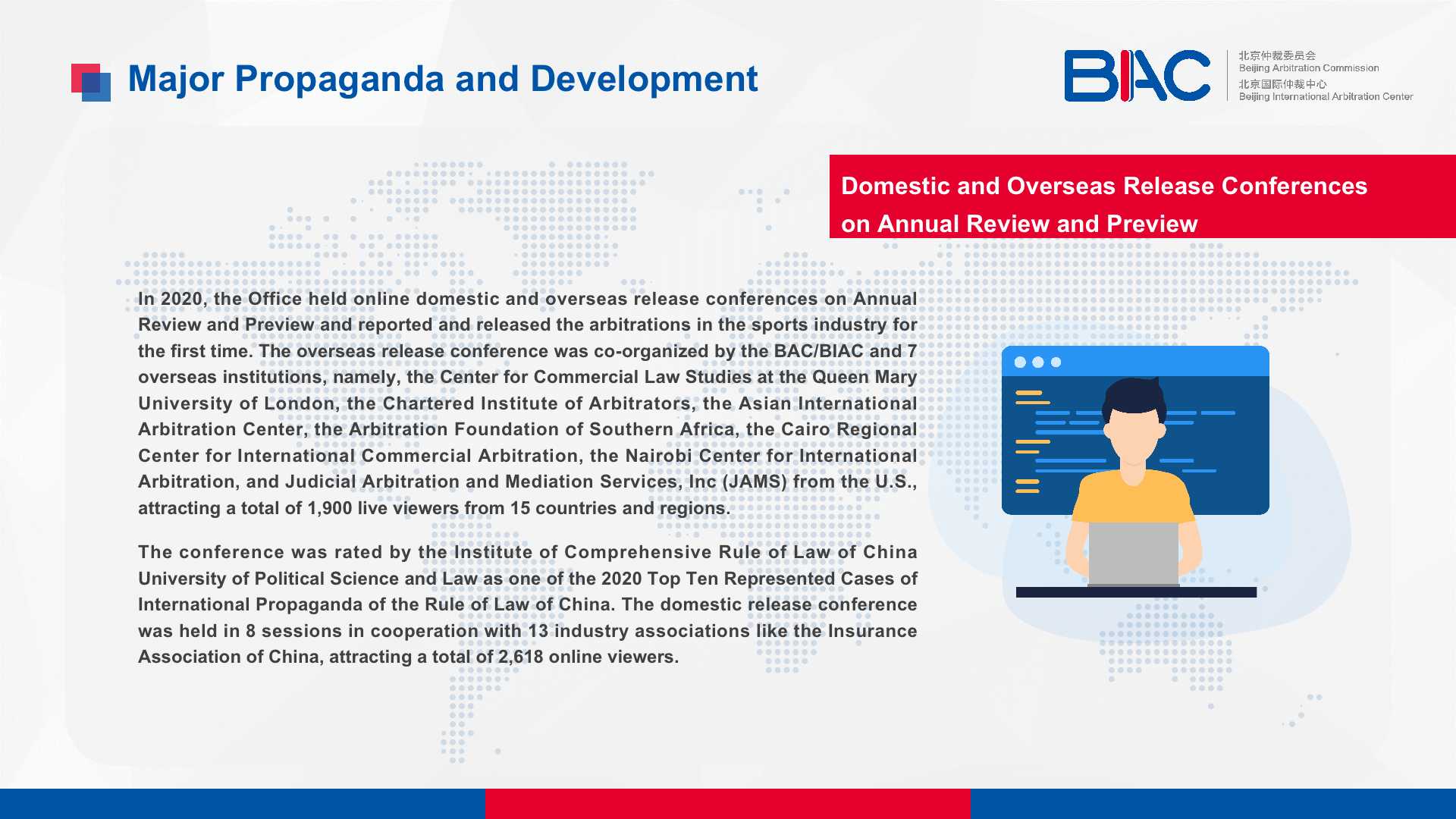
4. Introducing a Series of Professional Systems
In 2020, the BAC/BIAC issued the Operational Guidelines on Calculating Arbitrator's Remuneration with Hourly Rates (Exposure Draft), making it the first arbitration institution in the Chinese Mainland to propose such guidelines, and promoting the implementation of arbitrators charging on an hourly basis in the Chinese Mainland. Additionally, it also formulated the Code of Conduct for Arbitrators in International Investment Disputes, and selected prospective arbitrators for the Panel of Arbitrators for international investment disputes (a total of 101 arbitrators), facilitating the establishment of its investment arbitration system. Moreover, it also developed the Guidelines on Currencies and Their Interest and Exchange Rates in International Arbitrations, the first in China to give practical guidelines on common issues in international cases, which would increase the predictability of awards and was widely reported by many media institutions, including ifeng.com. The Working Guidelines on Online Hearings (Trial) was developed to provide detailed guidance for the BAC/BIAC during and after the epidemic, promote the use of online hearings and solve the problem of delay in hearings during the epidemic.
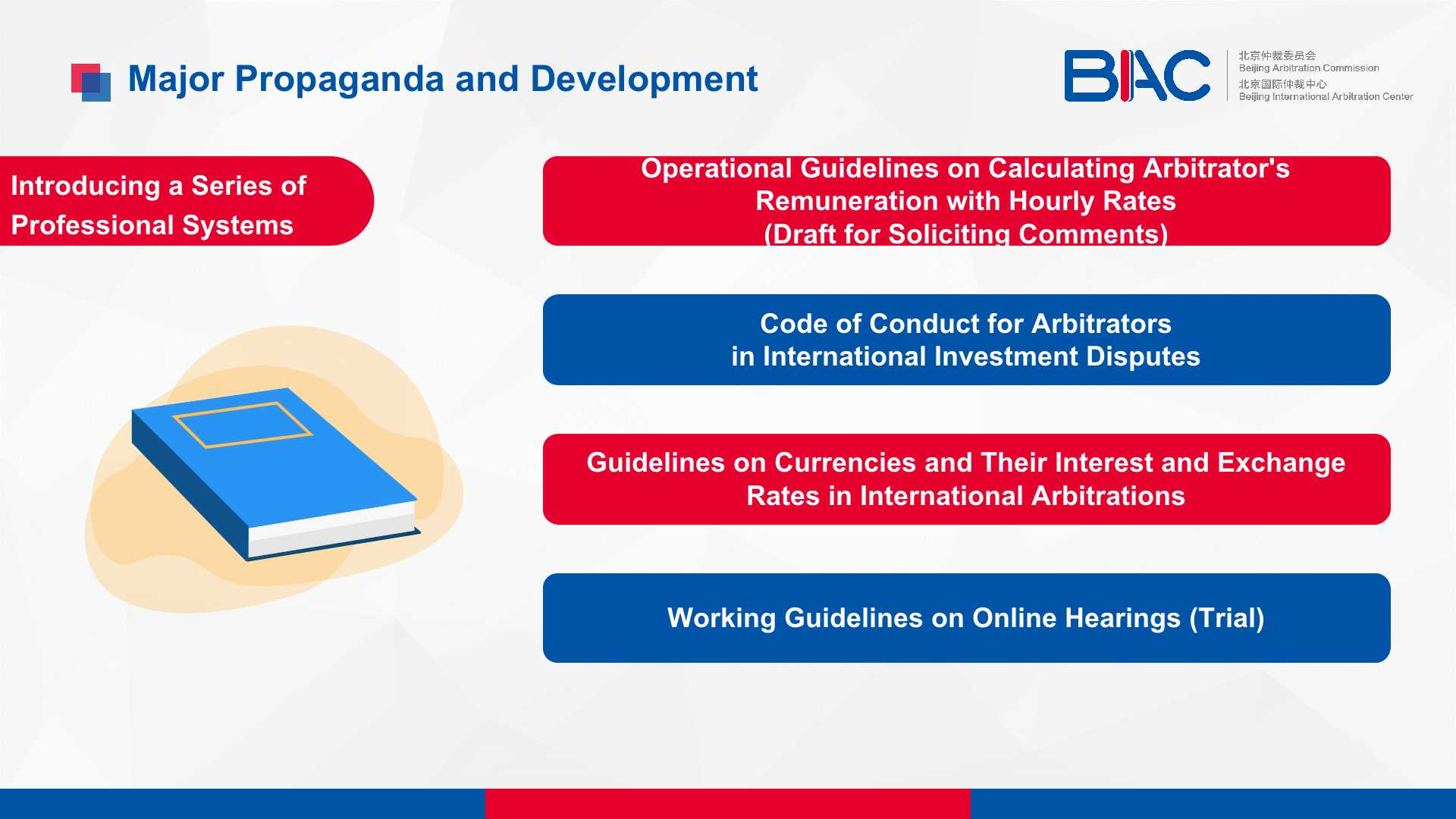
5. Actively Engaging in Social Governance
In 2020, the Office provided professional and detailed opinions on legal documents including the Civil Code of the People's Republic of China (Draft), the UNCITRAL Mediation Rules (Draft), and the UNCITRAL Notes on Mediation (Draft). In particular, in its reply to the pilot work of innovating the business environment, the BAC/BIAC brought up issues including taxation, foreign exchange, and foreign affairs to facilitate the government's decision-making process.
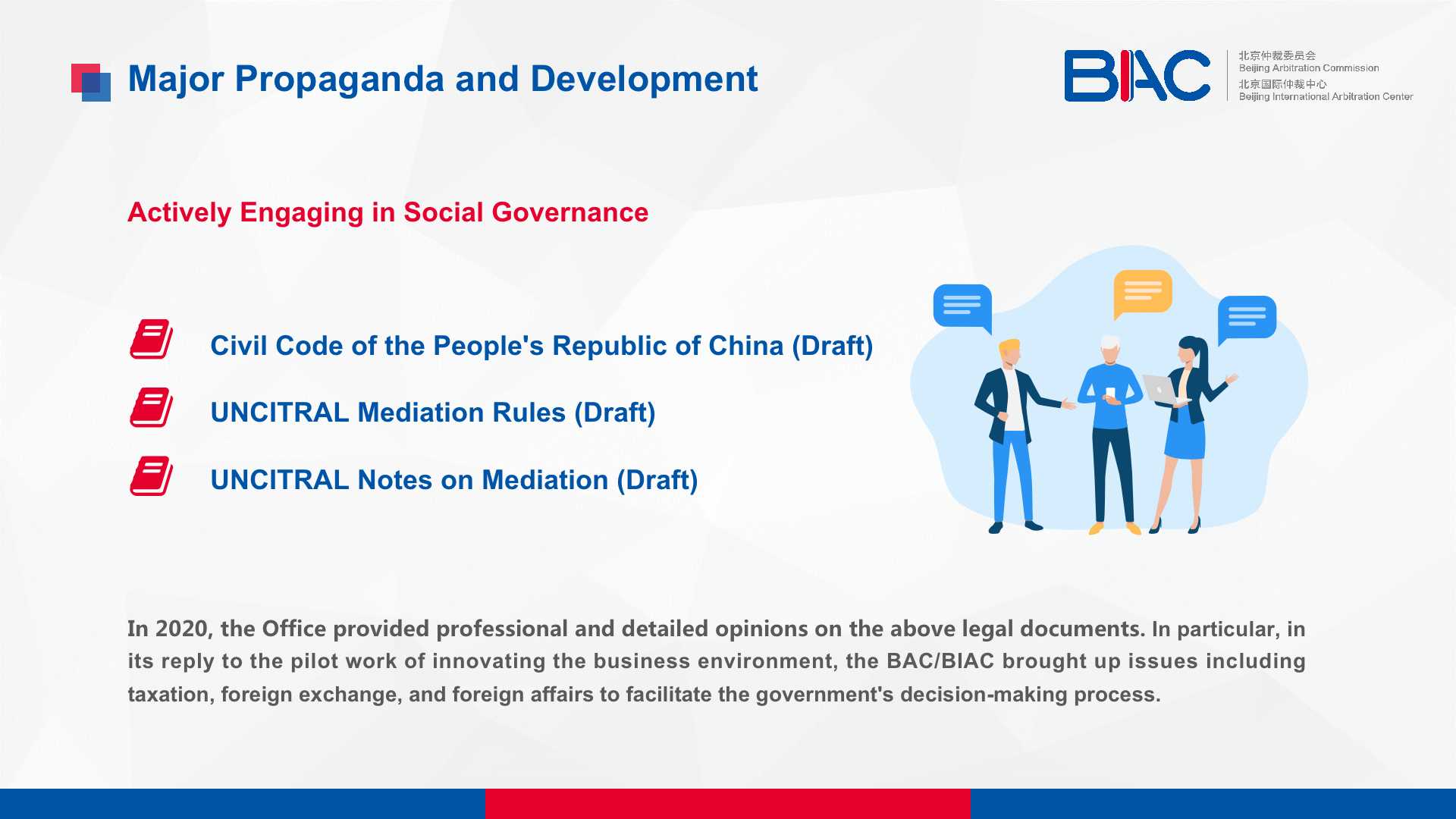
V. Internal Development
(I) Talent team Building
To ensure a sustainable talent team, a reasonable adjustment of the Division Chief’s workload of scrutinizing awards, and the shift of the Division Chief’s work focus to talent training and daily management, the Office set up the second case management team in 2020 and empowered some senior case managers to assist the Division Chief’s in scrutinizing awards. Meanwhile, in a bid to increase employee turnover and vitalize the talent team with new blood, the Office recruited seven case managers, two case registration managers, and two functional managers, and also transferred two case managers as business development counsel , and one case registration manager as the case manager.
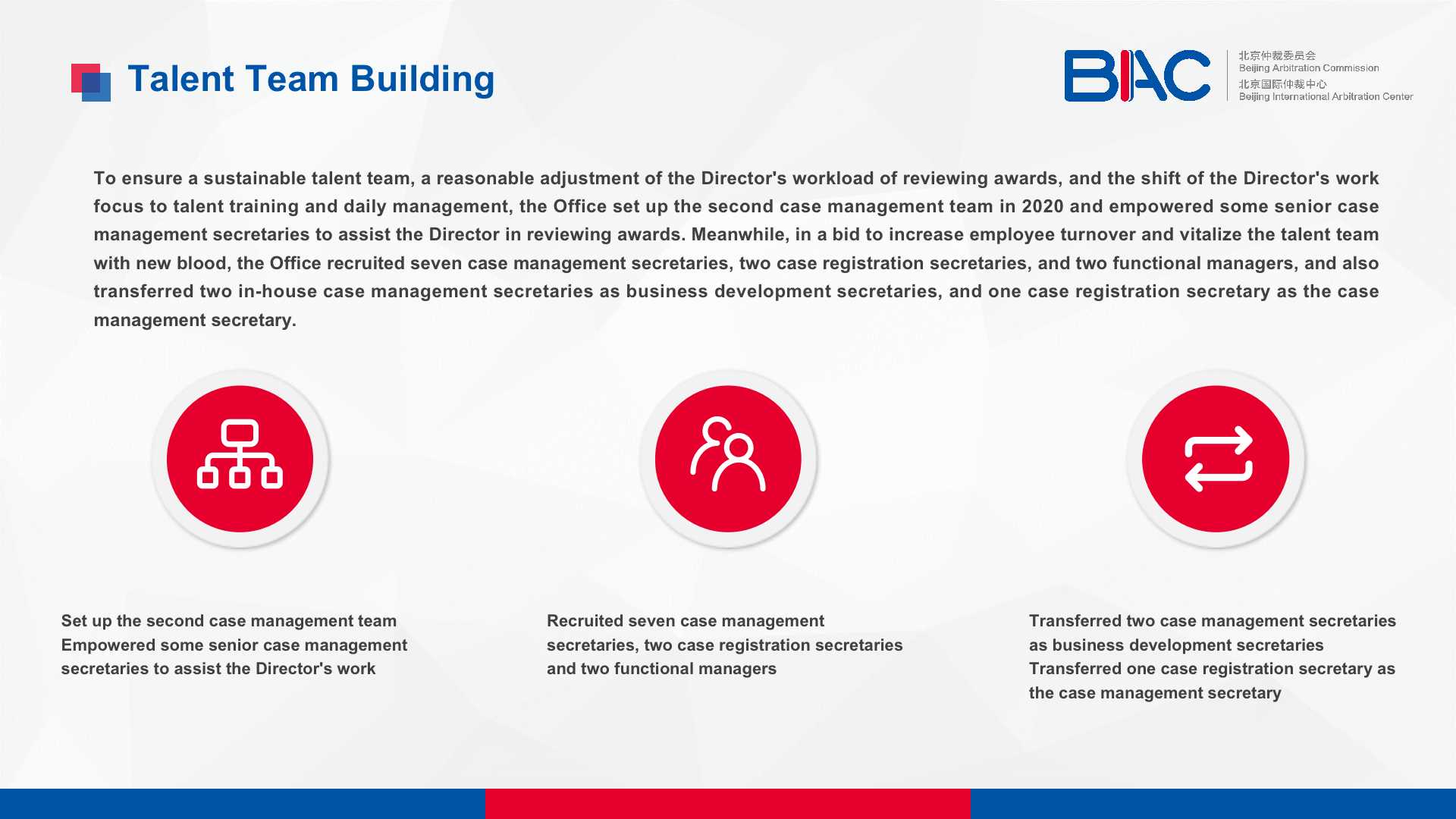
(II) Construction of Internal Systems
In 2020, to accomplish the "Foundation Year" proposed by the Committee, the Office strictly implemented the internal management systems of four departments revised in 2019, namely, Human Resources, Finance, Information Technology, and Administration. During this process, the Office clarified ambiguous provisions and revised those obviously went against the actual situation.
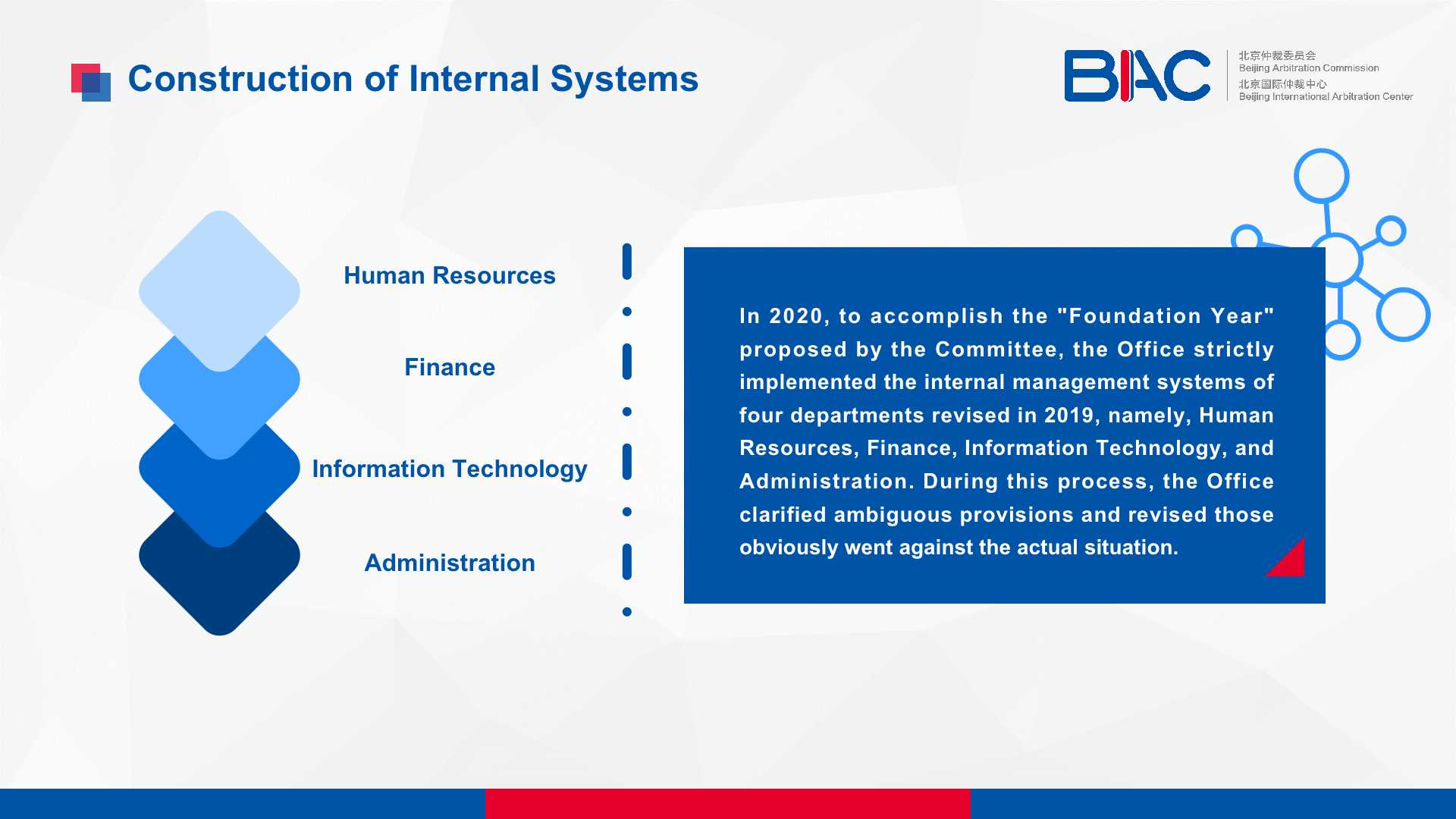
(III) Construction of Office Facilities
2020 saw the renovation of the rented 14th-floor office space by the Office. Meanwhile, due to the impact of the epidemic, the previous tenant did not renew the rent for the 7th-floor office space of the China Merchants Tower. Upon the consent of the Committee, the Office decided to take back the 7th-floor office space for its own use, and carried out the overall planning, design and renovation of the office space of three and a half floors owned by it.
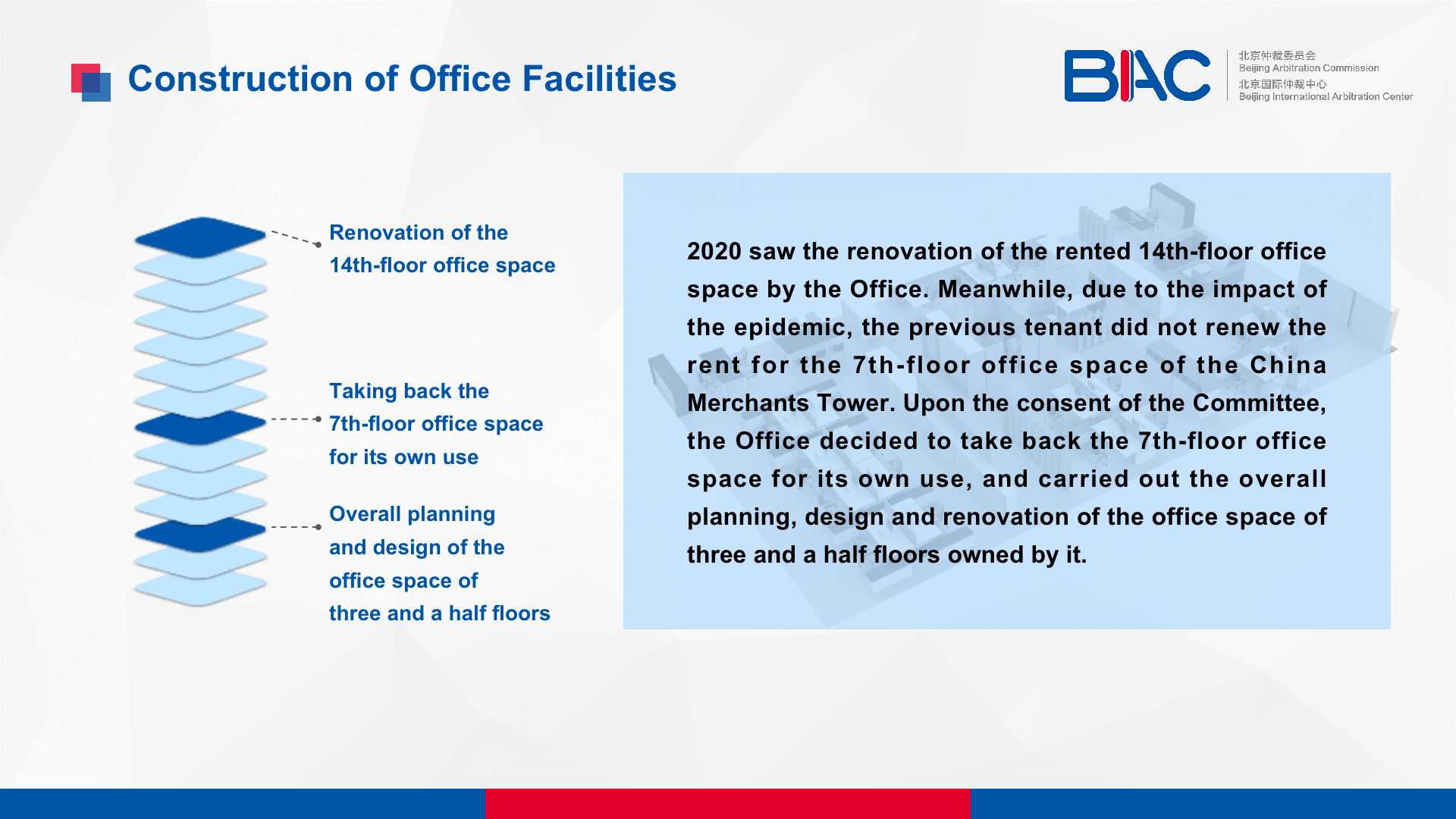
(IV) Setup of the General Party Branch
In 2020, called on by the Party organizations at a higher level, the General Party Branch Committee of the Office vigorously promoted the standardized setup of the General Party Branch and Party branches. The branches established Party groups successively to organize relevant activities. Moreover, the branch secretaries gave Party-related themed lectures on a regular basis, and Party members gathered to study the Party's policies and theoretical documents as well as the latest speeches by General Secretary Xi Jinping in a timely manner, greatly improving the contents, forms, and frequencies of these activities.
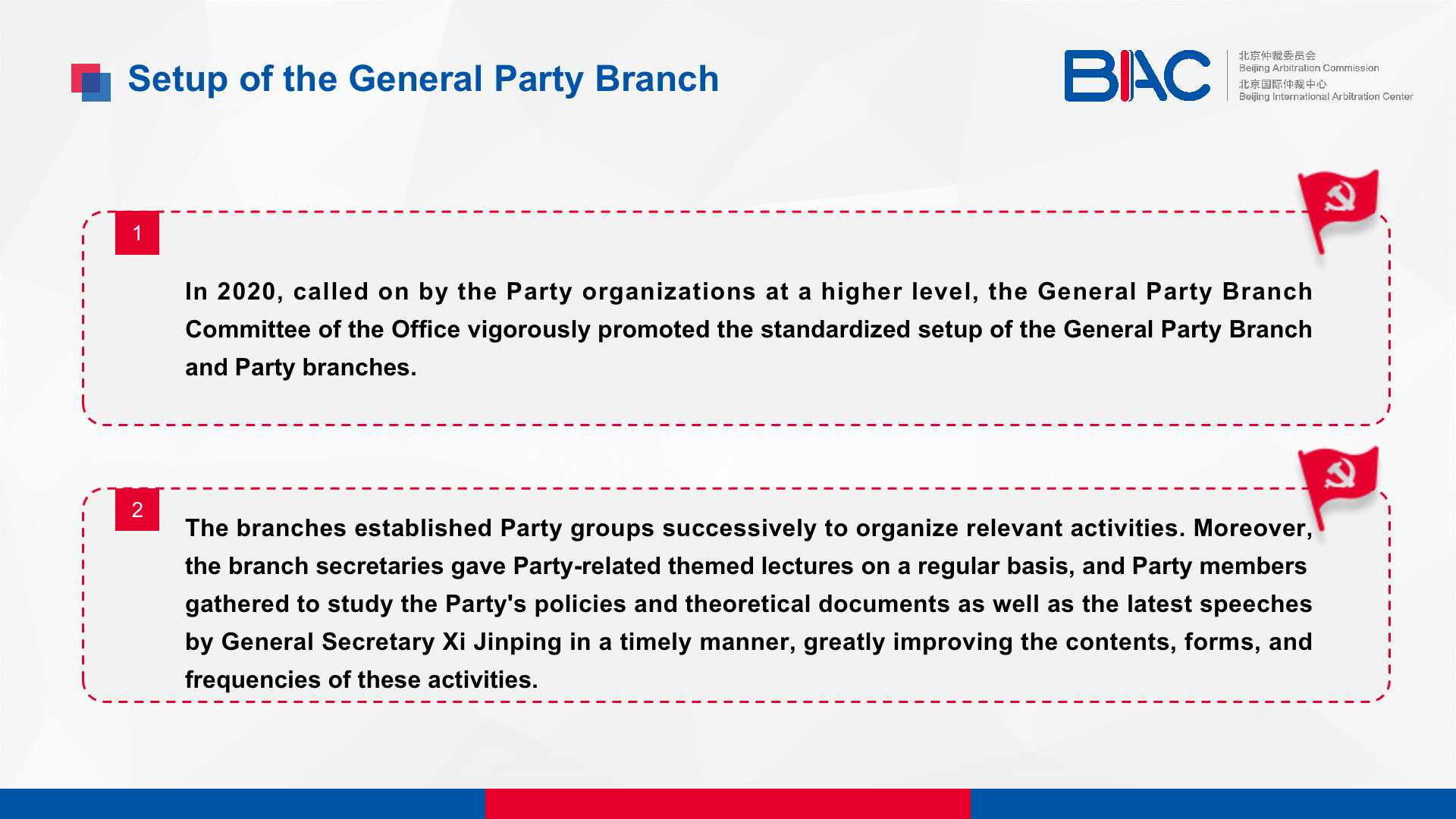
VI. Achievements and Deficiencies in 2020
(I) Major Achievements
1. Enhanced emergency response and properly coped with the sudden outbreak of COVID-19
As the overwhelming COVID-19 epidemic raged across China, epidemic prevention and control became the top priority in 2020. For highly social institutions like the BAC/BIAC, epidemic prevention and control should be put on top of its agenda. To safeguard the safety and health of employees, the Office began to purchase anti-epidemic supplies, explore anti-epidemic measures, convey anti-epidemic policies, and submit anti-epidemic reports since the Spring Festival. Faced with the new normal of epidemic prevention and control, the Office remained highly vigilant and achieved remarkable results of "continuous and sufficient provision of anti-epidemic supplies and zero infections of employees" for 2020.
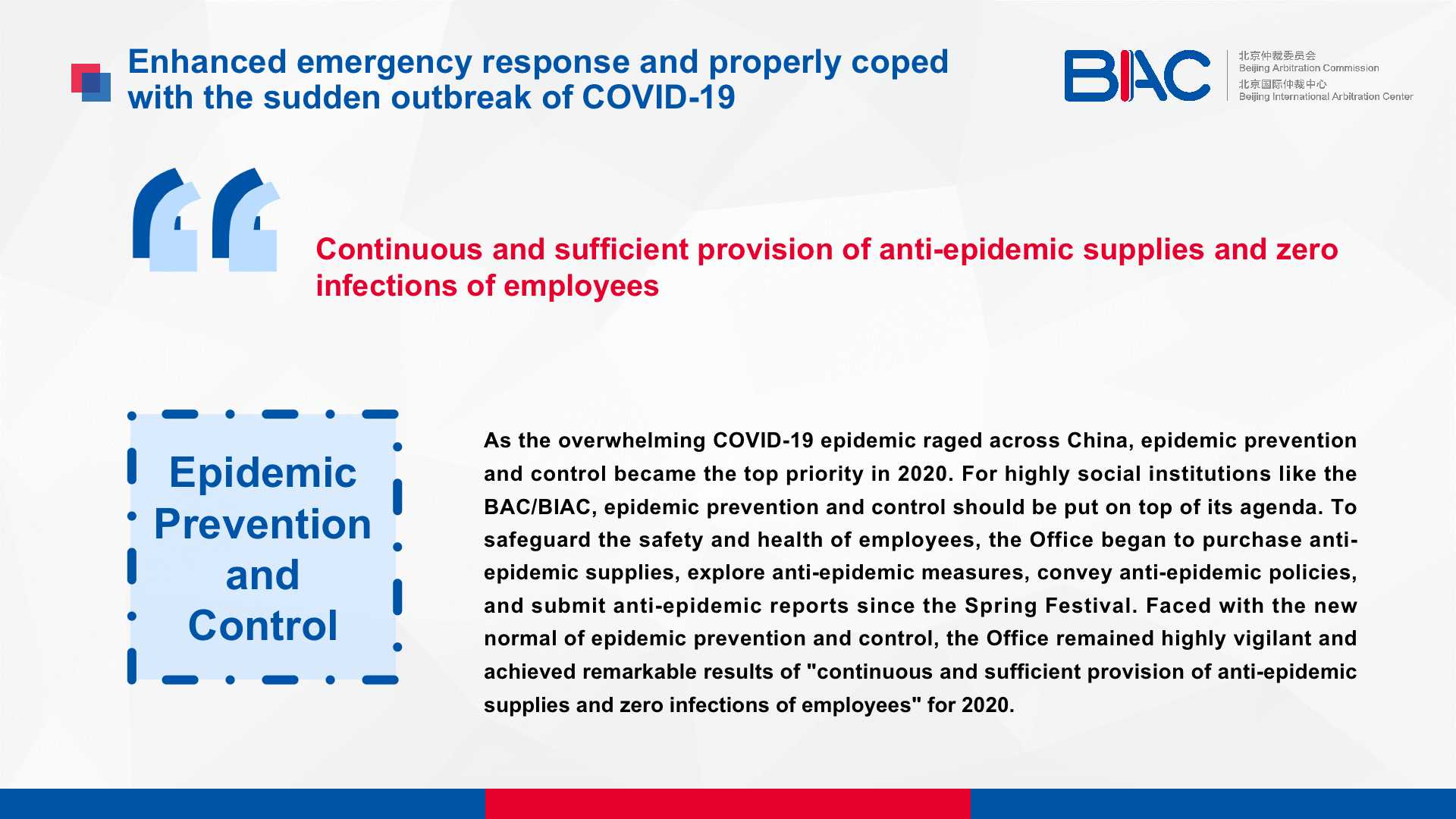
2. Improved management capabilities and strengthened internal standard management
As the old saying goes, the greatest challenge for a country lies not in making laws, but in putting them into effect. 2019 witnessed the Office's revisions of internal management systems of four departments, namely, Human Resources, Finance, Information Technology, and Administration. Moreover, to accomplish the goals of 2020 as the "Foundation Year", the Office strictly implemented the above systems.
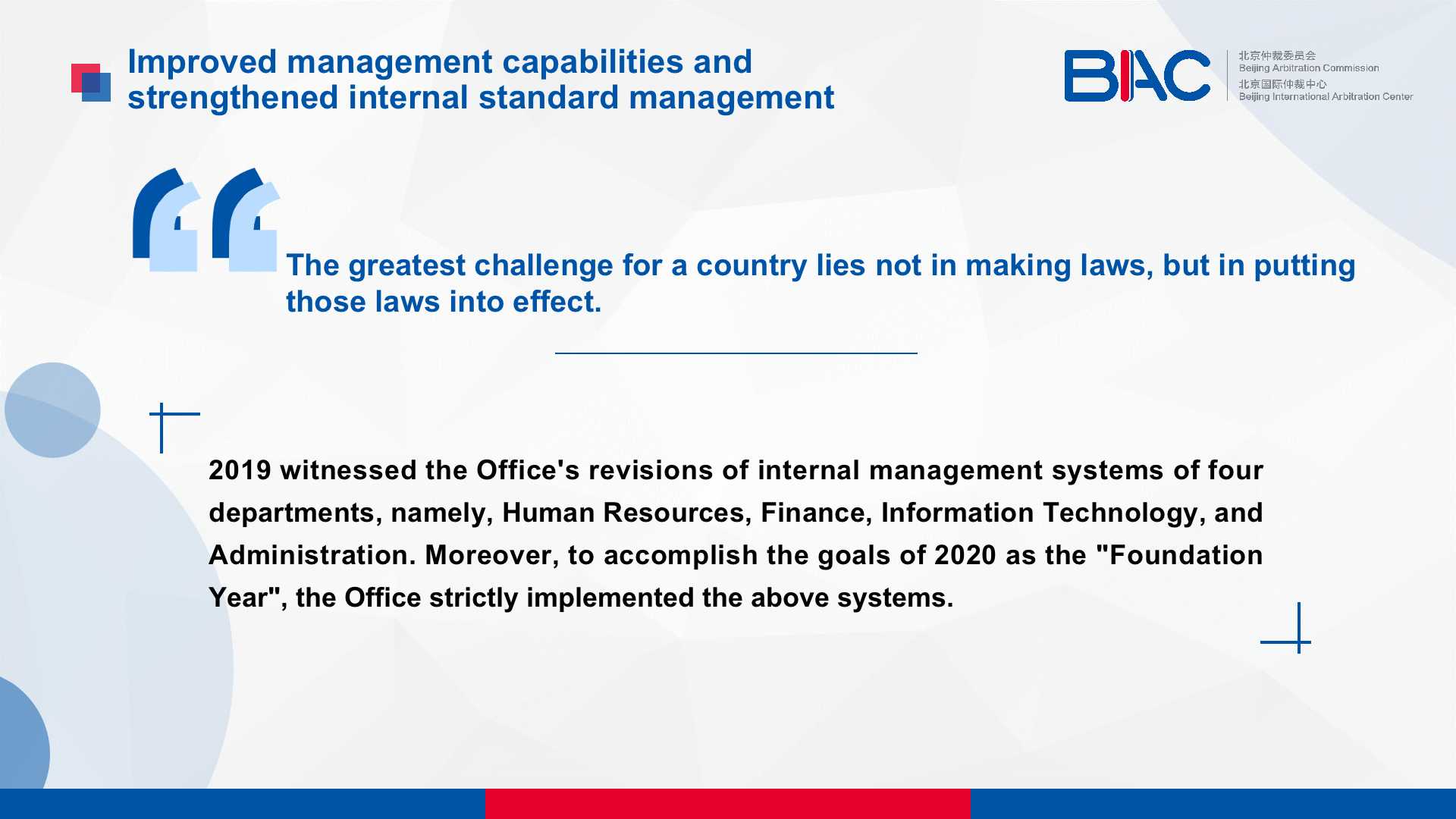
3. Consolidated innovation skills, seized opportunities, and rose to challenges
Changes in external climates, represented by the spasmodic outbreaks of COVID-19, the deepening of institutional reforms, the increasingly fierce competition in international arbitration, and the growing impact of the reform in the charging mechanism, brought up more opportunities and challenges to the BAC/BIAC. For the purposes of seizing opportunities and rising to challenges in 2020, the Office upheld the idea of "reform and innovation", and called for open-mindedness, innovations and transformations in many aspects such as institutional mechanisms, business models, propaganda channels, working methods, management initiatives, and the application of information technology. Hopefully, many innovative initiatives would lay a new foundation and pioneer new prospects for the BAC/BIAC.

4. Built technical capacity and advanced the transition of working patterns
Information and network technologies helped a lot in the arbitration industry. It is of great significance to make full use of these technologies for promoting the upgrading and transformation of arbitration patterns and improving the quality and efficiency of arbitration. 2020 also saw severely decreased mobility and increased difficulty in face-to-face arbitrations under the impact of COVID-19. Nevertheless, the Office made quick adjustments and, by means of information and network technology, innovated in online appointments for case registration, online court hearings, online propaganda and business development, and online training and seminars, effectively reducing adverse effects of the epidemic and ensuring the fulfillment of many tasks without a hitch.
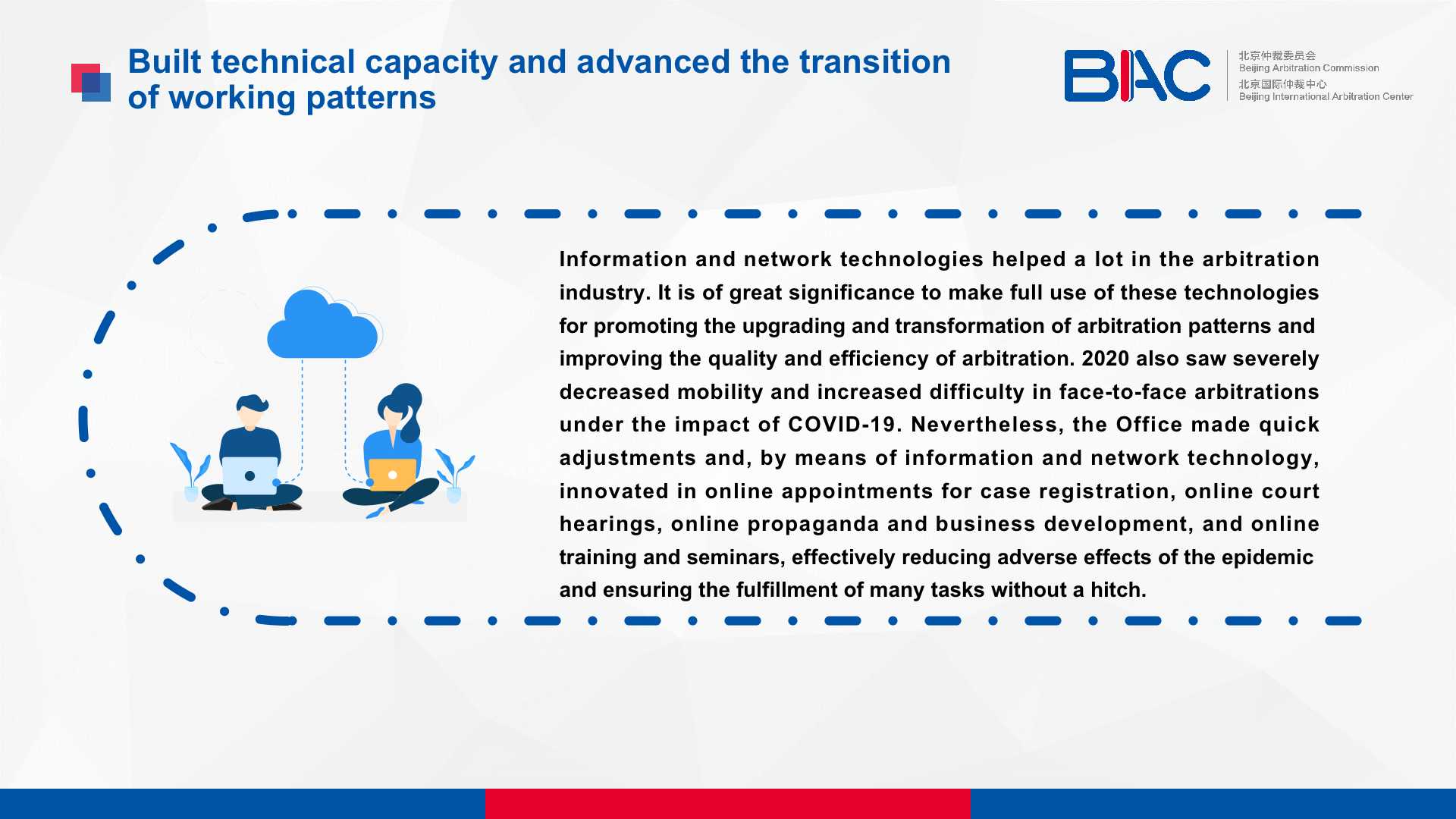
(II) Main Deficiencies
Our work in 2020 was also plagued by some deficiencies: the sources of cases should be stabilized; case management should be further leveled up; working methods should be further innovated and optimized; emergency response capability should be improved.
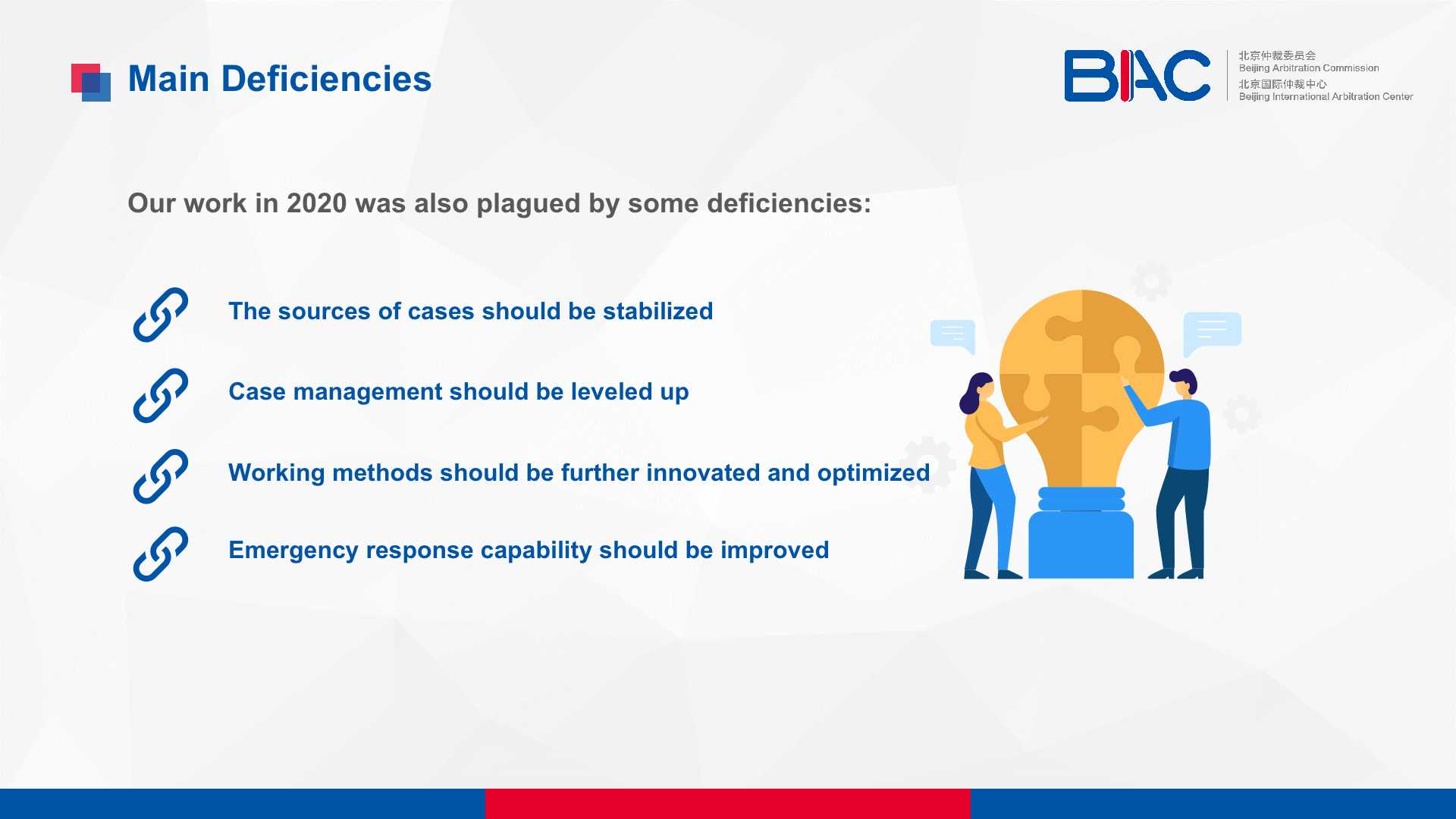
VII. Main Objectives and Initiatives for 2021
(I) Main Objectives
1. Refining internal management within the BAC/BIAC
The BAC/BIAC's sustainable development hinges on standardized and refined case management and internal management. 2020 witnessed great efforts made by the Office to enhance management capabilities, yielding some management results. In 2021, the Office will further optimize management methods, implement applicable rules and regulations, and strive to refine its management.
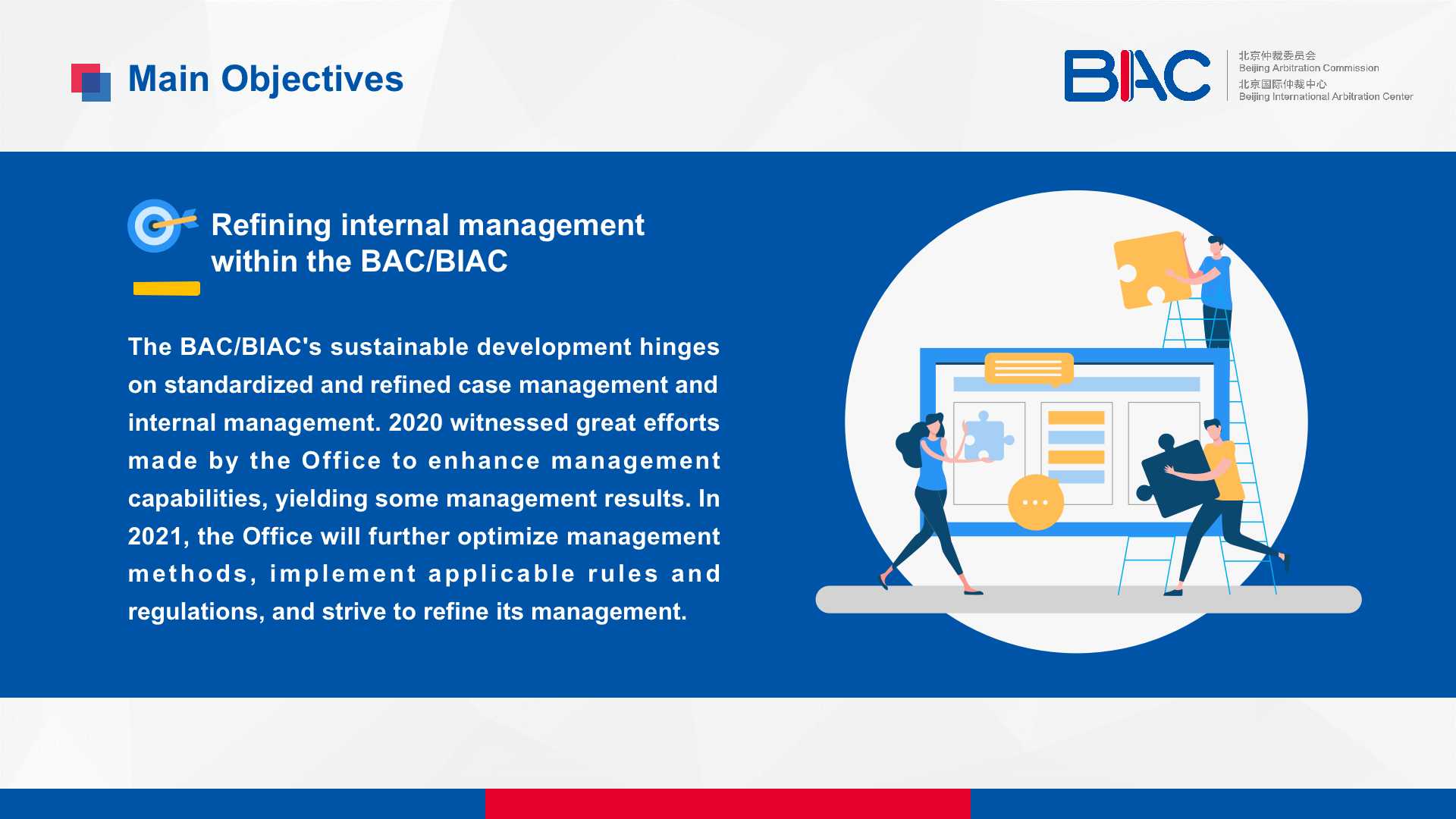
2. Boosting the quality and efficiency of arbitration services
The credibility and reputation of the BAC/BIAC are built upon not only fair and just arbitral awards, but also professional and high-quality arbitration services. Providing relevant parties and arbitrators with thoughtful services has always been one of the basic principles upheld by the BAC/BIAC. In 2021, the Office will continue to enhance the quality and efficiency of arbitration services by thoroughly investigating the blind spots, weaknesses, and shortcomings in them.
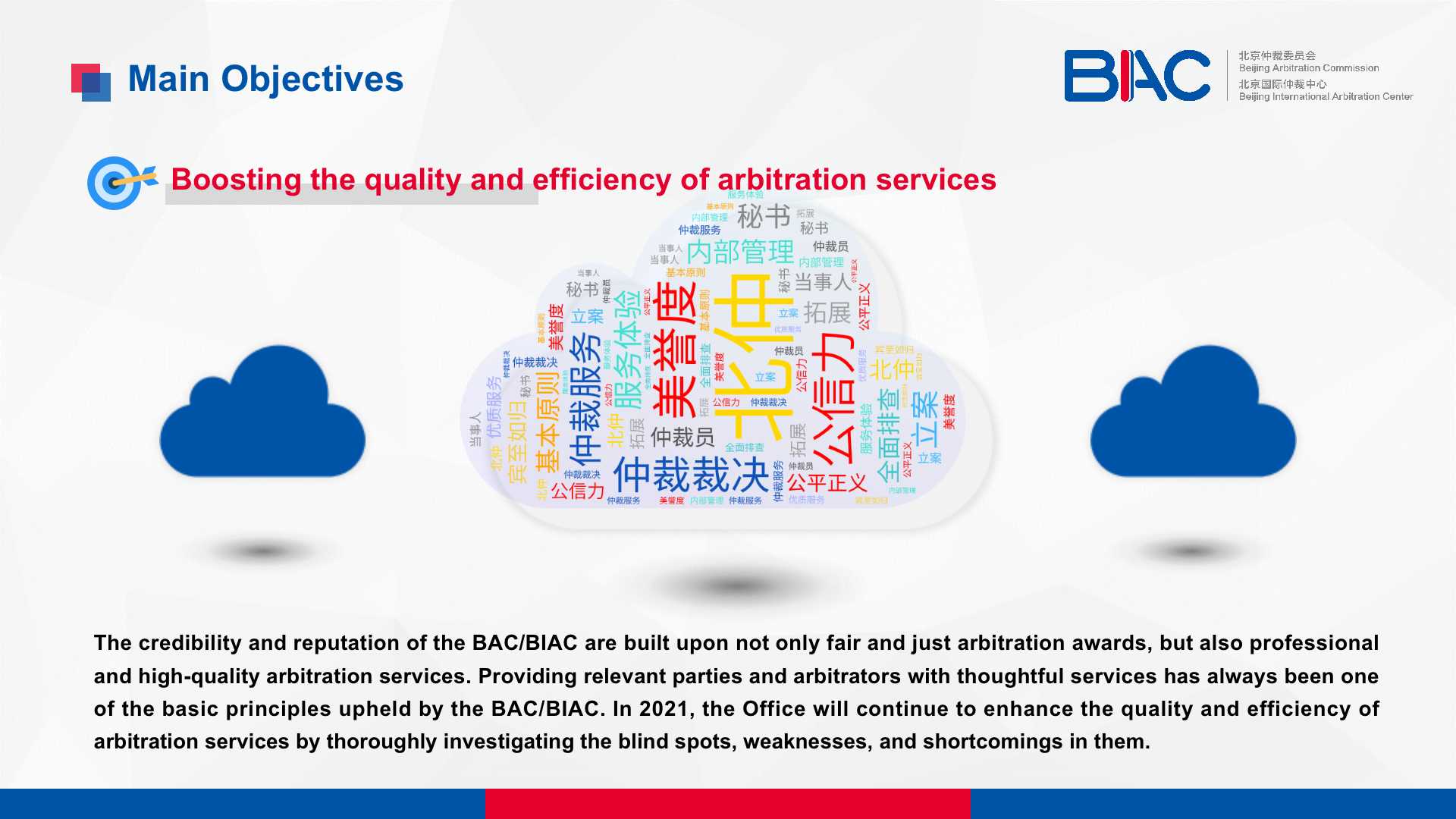
3. Fulfilling the institutional reform of the executing agency
It is quite an imperative task to institutionally reform the executive agency. Based on investigations with several parties and thorough studies in 2020, the Office has basically figured out the trends of the reform of the executing agency and finalized the direction of such reform. In 2021, the Office will fulfill the institutional reform of the executing agency in accordance with the reform plan reviewed and approved by relevant government authorities.
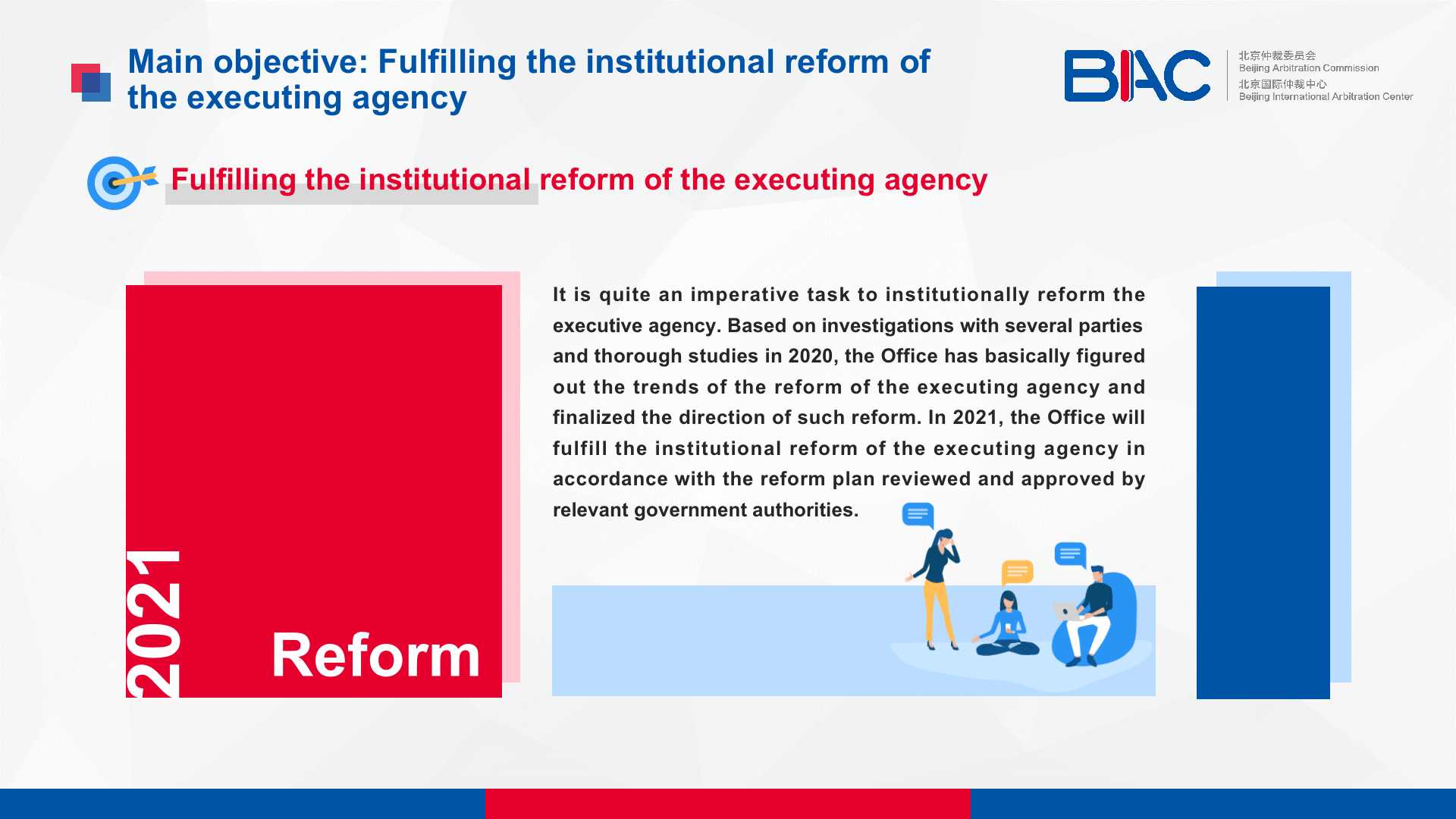
4. Expanding online propaganda and development activities
Affected by the epidemic, 2020 saw the shift of lots of propaganda and development activities from offline to online. Online conferences, lectures, and training are increasingly popular among the audience. According to the current situation where epidemic prevention is still of utmost importance, it is expected that offline propaganda and development activities in 2021 will still be undermined. Therefore, the Office will put more effort into expanding online propaganda and development activities and enhancing their effect.
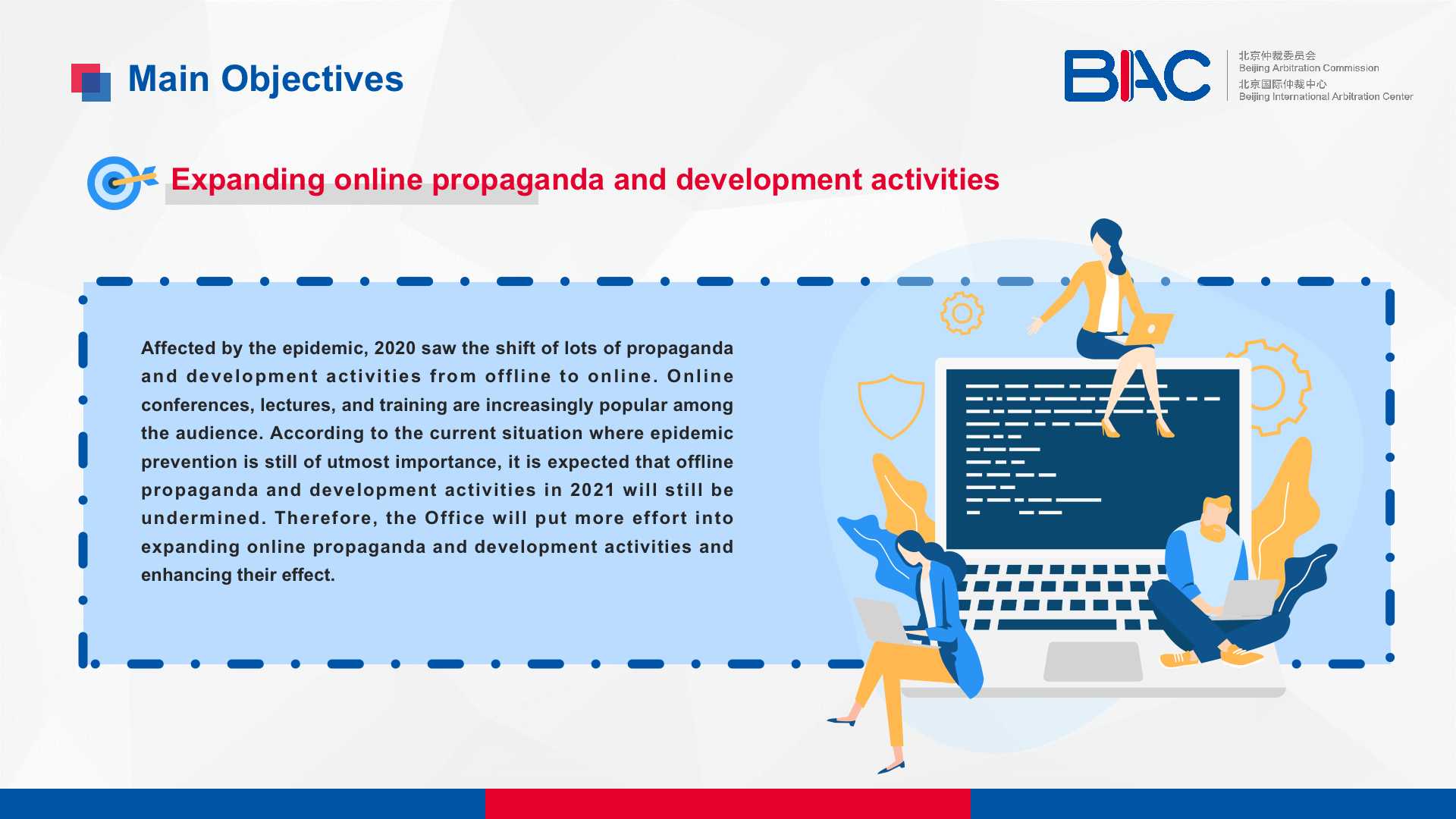
(II) Main Initiatives
1. Optimizing the methods of managing cases and procedures
2. Strengthening arbitrators' sense of discipline and case managers' sense of service
3. Putting into practice the plans related to the institutional reform of the executing agency
4. Innovating the forms of online propaganda and development activities
5. Implementing the management mode that integrates systems and business culture
6. Upgrading business and management with smart information technologies
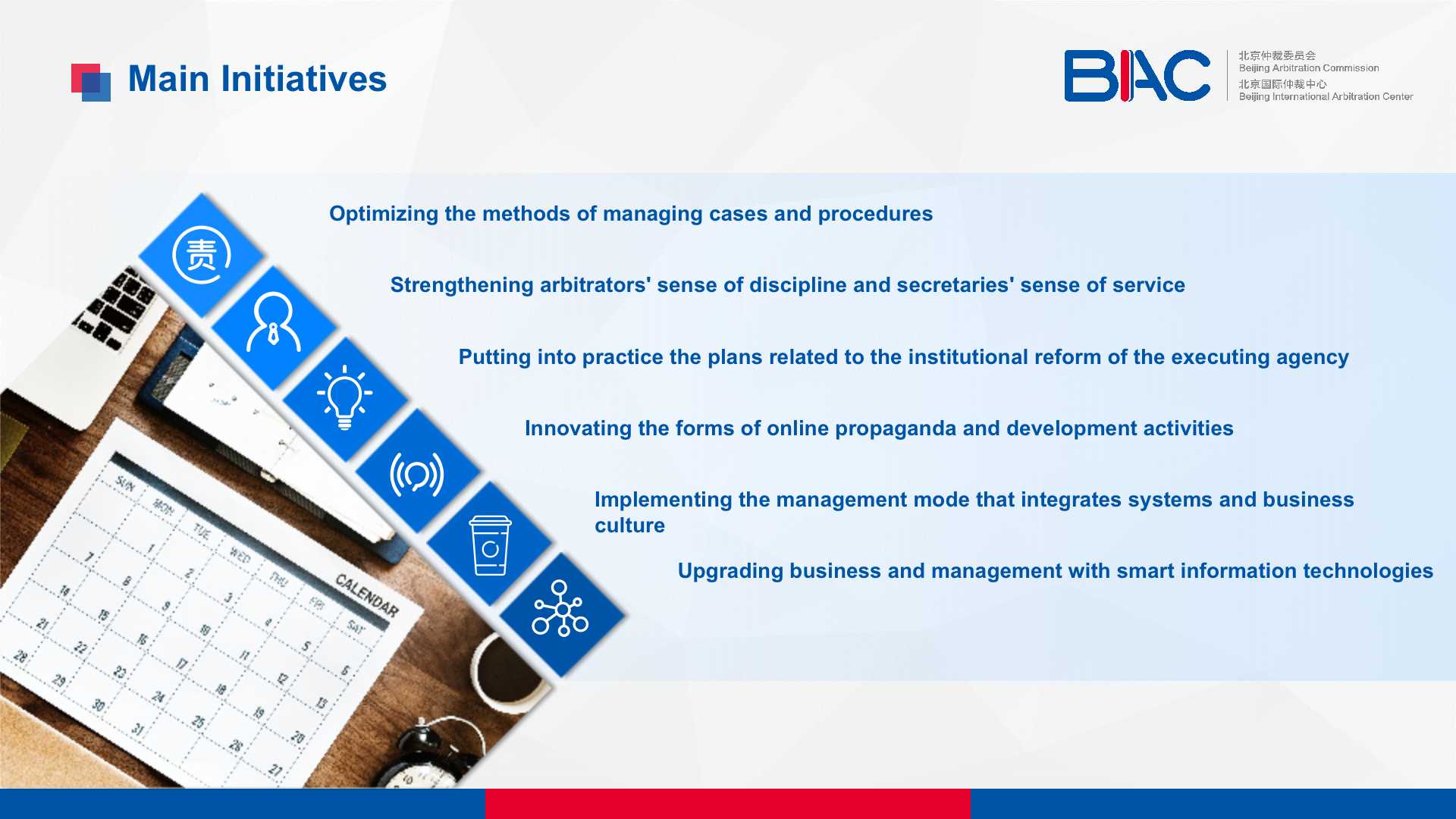
Beijing Arbitration Commission/Beijing International Arbitration Center Office
20 April 2021